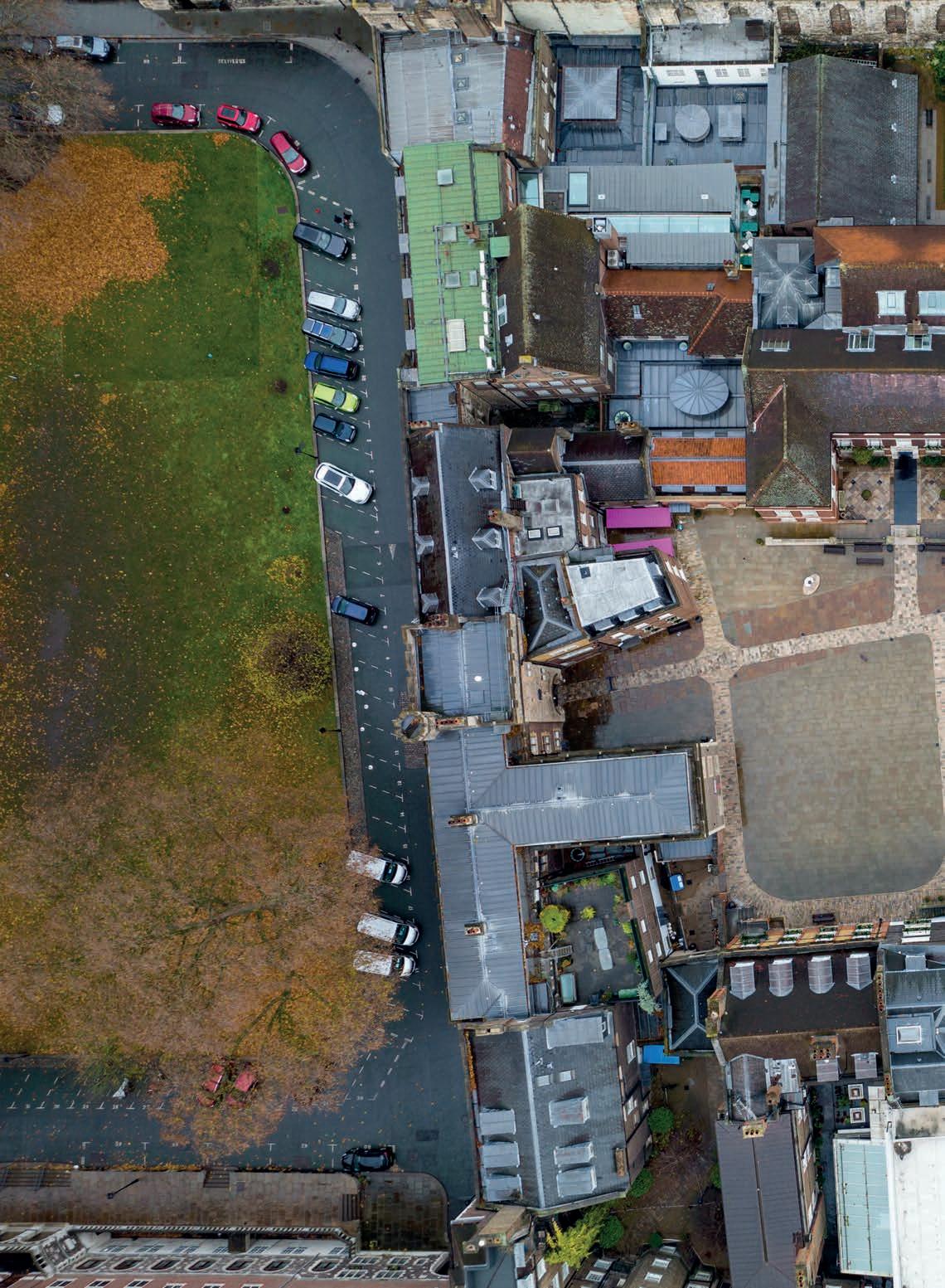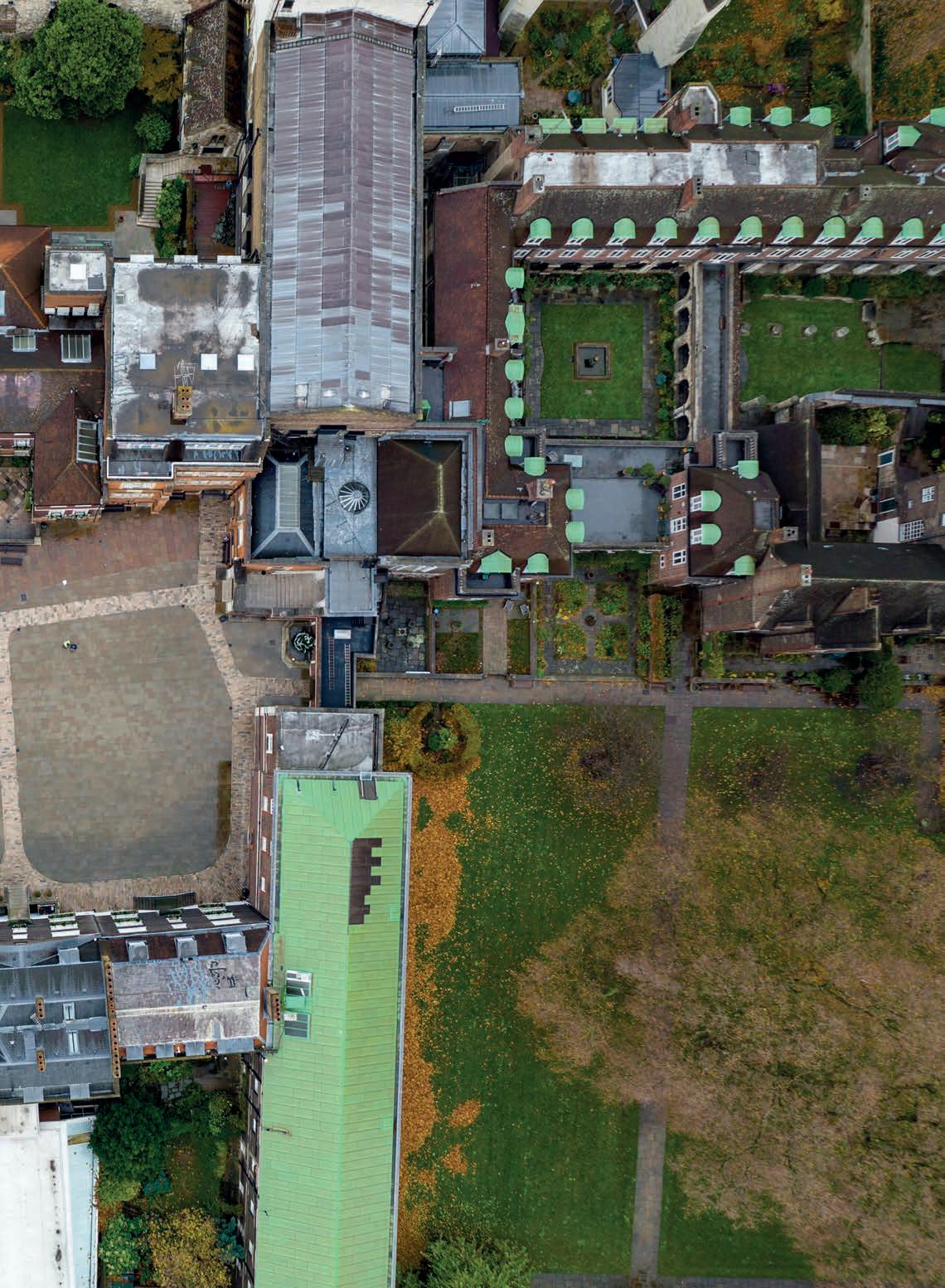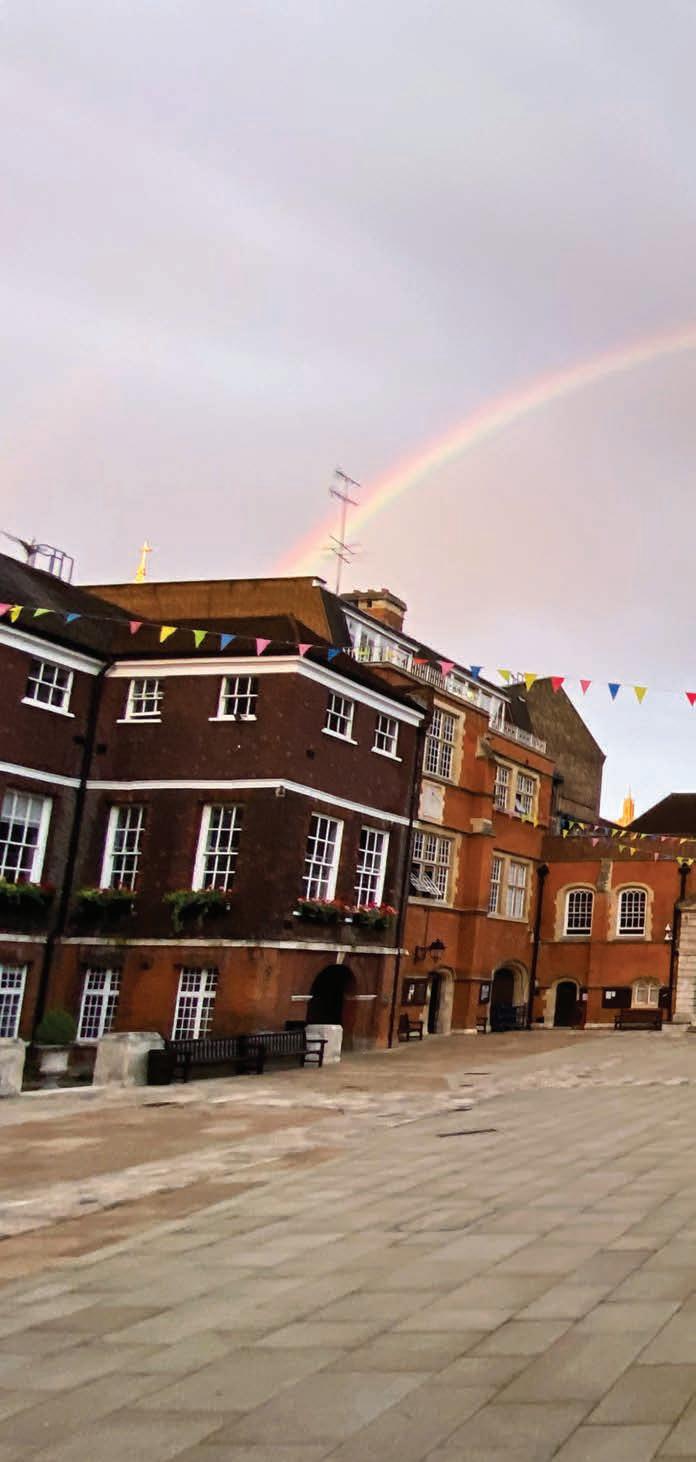THE ELIZABETHAN















You probably don’t know this, but in Purcell’s, along the stairs leading to the boarding floor, there are framed pictures of well-known, inspirational women: you’ll see Jacinda Ardern, Malala, Maya Angelou. If you were to walk up these stairs, past each of these women, there, at the top, you would find the final frame, but this one is different. In this frame you see yourself. Having passed this formidable line up of painters, poets, politicians and artists, the last frame is a mirror, reminding the one looking that she holds the same inspiring power and potential as those before.

This makes me think two things. The first thing is simple: there really shouldn’t have to be a wall of women that young women need in order to find strength. The second is this: What exactly counts as inspiration for a woman anyway? Do you have to be the first woman to... Or the youngest woman to... Or perhaps the only woman who has...?
Tuesday 8 March marked International Women’s Day. And, if I am honest, I had my doubts if I was the right woman to be here to talk about it. I thought “what do I know? Sure, I’m a woman but apart from that... and what would I talk about anyway?”
I can’t answer all those questions, but what I do know is that the idea of being a woman as a limiting factor never entered my mind when I was growing up. It was something I had to learn. I was extremely fortunate: I had access to a great education, participated in any sport I wanted, and with the love and support of my parents I felt I could achieve anything.
Sadly, you and I know this is not the norm for the vast majority of women worldwide. Even in countries where women are highly educated and have the same opportunities as men, sexism persists, and bias remains as fervent as ever. We mark International Women’s Day because gender inequality remains a problem worldwide. And we highlight these well-known women because they help
reframe the story we tell ourselves, reminding us of the need for an equal footing for all women, everywhere.
And yet, it shouldn’t only be the well-known figures, but rather the everyday women who inspire us. Over the years I have found that it is actually my mum, my sister, my friends, my colleagues, and my pupils who truly inspire me.
In the past few days, I have been in awe of the Ukrainian women. I’ve seen images of women taking up arms in defence, staying to fight so that peace may abound. I’ve seen women wading into rubble in the midst of shelling; women caring for the sick, pregnant and injured using improvised bomb shelters as their protection. Only two weeks ago, these same women were just like my mum, my sister, my friends, my colleagues, and my students. In the blink of an eye, their world was torn apart, and yet in a moment they’ve shown inspiring bravery and resilience.
In the Gospel reading this morning, we were reminded that the gift of peace only means something when we’re reconciled with our brothers and our sisters. It seems that peace only comes when the divide between genders is healed. And so, as we mark International Women’s Day this year, let us remember that each of us has the capacity to frame a world that reflects a better image of us all.

PY: So, whole-school Abbey is back! I imagine the view from the pulpit is a lot nicer for you, but has the singing got any better?
DW: The singing has much improved! We’ve got more people, so now there is a sense of energy from the collective which is more than the sum of its parts.
PY: We’re all interested in finding out a bit more about our school Chaplain. You’ve been at Westminster for nearly a year now, what have been some of your highlights?
DW: It’s a great privilege to be a Chaplain and to be associated with the Abbey, but it’s always about the people. That’s definitely true of Westminster, so the highlight has genuinely been meeting you all rather than a particular event. I was reflecting that I teach as well and now, getting to the end of the year, I’ve been feeling quite sad knowing that this is it, and that reminds me that it is the people that I value most.
PY: And is this your first time being both a Chaplain and a teacher? What challenges, if any, have you come across in this regard; do you enjoy each aspect equally?
DW: Well, it’s a bit like juggling while standing on a ball! My primary concern as Chaplain is the wellbeing of the pupils, staff, and wider school community. There are many teachers, but there’s only one priest! It’s being engaged in the breadth of the school life, whatever that looks like, which is my main concern, and it is alongside this that I teach.
As an example of a potential challenge, I didn’t know we had a sports day! I’m now having to rearrange commitments and meetings so I can be there as I believe that it actually matters that I come to these events, because school life is such a big part of what I do. So yes, the teaching is great and I love that, but juggling my primary concerns with that is a challenge in itself!

PY: Following on from that, how have you found being a Chaplain in such a diverse community? Westminster is after all more than Christian, although it is a Christian school.
DW: The important thing about any Chaplaincy is that it is a place where no-one gets excluded for any reason at all. My spirit of being here is that the Chaplaincy has a lot of room to grow and that there is a lot to be done. We were discussing Ramadan last week and, apparently and to my surprise, that’s not really something that has been talked about before! Talking about Yom Kippur, the Holocaust Memorial, essentially understanding how faith has something which brings us together and enriches our lives, rather than being a privatised or damaging affair that tears us apart. I love our heritage, and of course I’m a Christian as well and I love the work that I do in the Abbey, but it’s hugely important that the Chaplaincy is a general and hospitable kind of practice.
PY: We’ve heard about the Chaplain, but we have yet to hear about the man behind the mask! What would be the most surprising fact or story about you?
DW: Crumbs! I should have been given some time to think that one through.
I think I’m a very curious person, and I mean that in all forms of the word. I have a lot of questions myself; I don’t sit very easily with one answer and always try to find out a little bit more. I will always be digging for an answer and keep going with what I’m trying to aim at. If you didn’t know, I’m in the middle of a doctorate at Oxford at the
moment. Similarly, before my Chaplaincy, I used to work in design and I think as I’ve tried to think through the question “Why do I really like design and why do I love theology?”, I’ve come to realise that I’m fascinated by that fulcrum point of change. That’s exactly why I love teaching: when someone gets an idea and they suddenly have control of it, that’s when that idea becomes theirs and not mine. For me, the same is true of design. Great design does something for people and the same is true with faith: I love being a kind of Socratic cheerleader when that happens.
PY: In a similar vein, if you were to recommend one book or film to a Westminster to read or watch while they were at school, what would you suggest?
DW: I expect that most people would say that I should recommend something like the Bible, but I’d rather people have strong relationships with what they read than tell them to read something specific. There are lots of books that engender what a good book does for us. Think King Lear, To kill a mockingbird or, dare I say, Harry Potter and what that does for us! Above that, the idea of narrative, and finding yourself in narrative, is really powerful. I also think that people interact very differently with this idea of relation to narrative, so I would be more curious to say: “When you read, what are those stories that you find yourself most powerfully a part of?”. So, to answer a question with a question, what do you read that you most relate to? What is it about a book that makes you evolve? I would say you should choose your reading list accordingly.
PY: Chaplain’s Breakfast is a classically Westminster tradition. With you at the helm, is it more like The Breakfast Club, or Dead Poets Society ? What really goes on behind the curtains at the Chaplain’s Breakfast?
DW: Probably a bit of both! A bit of chaos and a bit of order, I think. There are two things that I would like to say about the breakfast. Firstly, it’s a small semantic, but it’s now called the Chaplaincy Breakfast: it’s not about me, but rather about the Chaplaincy, all faiths and none. I’m trying to open it up to a broader audience and, in doing that, we begin to talk specifically about what matters to pupils while you’re here. The second thing is that it has now become a preparatory ground for Abbey talks! So, if you were to find yourself coming to the breakfast, it is very likely that you will find yourself in Abbey doing a talk. Now, it’s gradually becoming more a question of who is turning up rather than just who wants to speak in Abbey.
PY: Speaking of traditions, Westminster is full of bizarre ones. What would you say is your favourite, or the one you find the weirdest of all?
DW: Learning about the Greaze has been interesting – it is the strangest thing to fight over a pancake but sure, that’s what we do! There’s lots of things I have yet to learn, but that sense of heritage is interesting to me, especially the question of how you conserve the good of things while still making progress. It strikes me that Westminster has the potential to be a great place for that, but who is driving the change behind that?
I would be curious to ask, within the school, what happens when the pupils lead the change – you are a pretty bright group of kids, after all. Equally, however, I also enjoy it when there is a pushback against things being banned. I like the free spirit that means that there can be a voice of the pupils.
PY: It wouldn’t be a proper interview if I didn’t ask at least one loaded question: in your opinion, what is something that we ought to do better at Westminster?
DW: I think there is an opportunity to become better at listening. Here, people hear you and have knowledge, but they are already thinking about the next thing. They’re not actually listening, and you would know they were actually listening because you would feel like you were being received. I think people talk over the top of each other far too quickly around here without being prepared to wait and be changed.
Well, thank you for listening to my questions, Father, and thank you for your time.

As I write near the end of my first year as School Counsellor, I have cause to look back and consider how I have settled into the role. In particular, I have reflected on how I have worked through the process of establishing an identity within the institution, both personally and in the guise of counsellor, and how I can develop this identity to help pupils best within the unique environment of Westminster School. My role requires me to exist in a paradoxical situation: I am integrated within the school, yet have to maintain a degree of separateness. As with all staff, I want the pupils to flourish and achieve, but the aims of a mental health professional can conflict with those of an educator. To be effective, I need binocular vision, simultaneously looking after the welfare needs of each individual pupil whilst attempting to ensure these co-exist within the overall institutional framework.
I’ve been conscious that the development of my own identity parallels one of the key developmental challenges faced by all pupils within the school. Adolescence is a period of huge emotional and physical change and upheaval; identity is in flux, with many young people feeling they are juggling multiple identities. The questions “who am I?” and “what will I become?” are alive in the minds of young people and parents alike. The stakes can feel high, and whatever advantages with which pupils enter Westminster, whether intelligence, financial affluence, or family support, among others, they will not do well here without embracing challenges and working hard. For some, maintaining this effort can be difficult when other aspects of adolescent life are so appealing and distracting. For others, meanwhile, engrossing themselves in their studies can act to shield them from the parts of being a teenager that they find hard. Although it is normal for
social, emotional, physical and academic development not to proceed in lockstep, significant imbalance can cause distress and confusion, and this is often the point at which therapeutic help from the School Counsellor is sought.
Like the new Fifth and Sixth Form pupils who arrived in September 2021, I had heard and read a lot about the school but didn’t yet know what it would feel like to be part of it. During this first year, I’ve been struck repeatedly by how known and cared for the pupils are, and how invested the school is in their holistic development, extending far beyond exam grades and university offers. The school values emphasise this, and yet pupils can sometimes, under stress, have a narrower perspective of their own development. I have observed how being part of this institution can do a huge amount to bolster pupils’ self-esteem, yet also at times have the opposite effect. Pupils have often spoken to me about how pride on being accepted to this school can quickly turn to dismay if, and inevitably when, they face setbacks. Questions can arise as to whether they “belong”, and if they are really “good enough”. For some, these feelings can be quelled by the academic and pastoral support on offer, or by engaging further with their studies, friends, or co-curricular activities, leading them to grow more secure in their identity as Westminsters. For others, however, shame and anxiety can make this a more challenging route, and pupils may attempt to mask their struggles for some time.
A sense of purpose and belonging are key aspects of identity. Westminster is an institution that encourages independent and critical thought and embraces idiosyncrasy. For the adolescent, this can feel both exciting
and daunting: “Great, I can be myself, but who am I?”. To learn, we must first admit (even if it is just to ourselves) that we don’t yet know. This is true socially and emotionally, as well as academically. Moments of struggle, uncertainty, and vulnerability are inevitable, indeed vital, in this quest. Westminster pupils add to the typical challenges of adolescence by electing to attend a school with such academic rigour. They are given a fertile pool to develop and grow within, with the hope that they can follow their interests and develop authentically over time with the support of others. To develop one’s identity properly (as opposed to swallowing it wholesale) is more challenging, and yet ultimately more satisfying and sustaining. It is certainly something I have found during my first year here; I cannot do my job as my predecessor did, because I am not him. I’ve had to find my own way to do it.
Ultimately, identity is a multidimensional concept, and not created by us alone. We feel it internally, project it externally, and others confer it upon us. It is subject to change throughout life, and this change can be gradual or sharp. It is part of our relationship with ourselves, but also with others, who can help us come to know and understand who we are, and what we believe.
In this way the role of educator and mental health professional are not so different, and can in fact be complementary. This is certainly my hope for the counselling service at Westminster: that it functions as a separate yet integrated part of the institution, so when a feeling of needing help arises, it is supported from all angles.
Over the Christmas period, the school community was greatly saddened by the loss of Harvey Parker. Their friend, Charley Gillingwater, and their Housemaster, Tom Edlin, share some memories here.
Charley Gillingwater (OW)
Harvey brought out the best in me. He encouraged me to face my mental health, my sexual orientation, and everything I did. And I think that was because of the way he lived his life. He blazed a trail through a world I still struggle to understand and for that I cannot begin to state how much I respected him and loved him. Dancing in Heaven to some Lady Gaga and truly not caring what the hundreds of people surrounding us thought made me feel freer than I ever have.
I don’t think that’s an uncommon feeling either. Harvey had an uncanny ability to make us all embrace our individuality and enjoy our time to the fullest. That’s what makes me so upset that what happened to Harvey did. I think he was a person on the cusp of truly finding themself in both gender and life at large. Yet I smile when I think of him. When I think of Harvey it’s impossible not to smile. In these few months whenever the conversation turns to my dear friend it’s always a positive memory, a shared

laugh, a transformative experience. And for that reason, I think that no matter what’s transpired we can’t forget those moments. We all love Harvey. I always will. And for that reason, I believe we have to think of the years and years of good times we had with a person who truly made us better and happier. I’ll live my life wondering and hoping you’re ok, but never upset that I knew you how I did.
Tom EdlinWe all knew Harvey at Westminster as kind, gentle and hugely popular –a brilliantly talented musician who played the flute in the school orchestra and the organ for many school occasions and sang in the chamber
choir, and who co-founded the Music Society’s lunchtime recital programme; a thoughtfully scholarly character with a love of literature; an enthusiastic participant in so many aspects of school life, and at the heart of so many of our House teams in athletics and cross-country... but above all Harvey’s many friends from school will testify to his generosity of spirit, sense of humour and totally genuine character. Harvey enriched our lives, and above all he was much loved by so many across the school community. We miss him, we shall continue to cherish his memory, and we hold him, his mother Amanda, brother Titus, and all his family in our hearts.
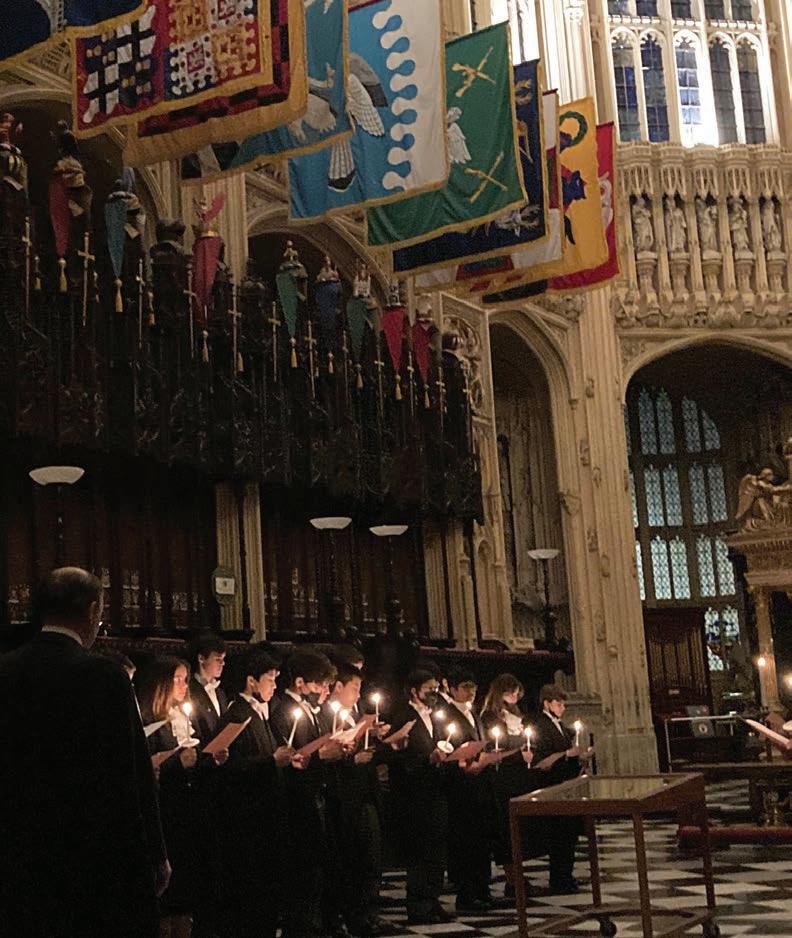
A return to school has brought a return of many of College’s historic traditions, such as Wednesday night Compline and 8.00am Callover (despite startlingly poor attendance from some Removes), restoring a sense of familiarity within the House. This has been coupled with Mio pizza nights, Matron’s fabulous baked goods, Great British Bake Off watchalongs and late night singing in the bathroom (sorry, Mr Mann!). Despite the arrival of Ms Hewes’ much-loved no-nonsense attitude, the Fifth Form are back to their boisterous selves, no thanks to Ethan’s antics during 10.00pm chats!
It would not be a complete return to normality without some shocks –of course, referring not to College placing dead last in Boys’ House Football or Tennis, but the concession of the House Chess trophy after losing the final to Milne’s. But glory did not elude us completely; a sixth-place finish in Sports Day, despite us being the smallest House by a long way, was enough to ensure jubilant scenes up House that evening.
After the anticlimactic Micro Commem last year, it was a relief to witness the House in full voice once more in Little Commem, a small service for the Queen’s Scholars commemorating the school’s benefactors. Despite the lack of parents, the leadership of cantors Purav and Adi and the enthusiasm of the rest of the Scholars ensured a deeply profound evening and bodes well for Big Commem’s return next year (even if we could be a little sharper remembering the words to te lucis ante terminum...). All in all, the College spirit has never been stronger, and the House has never been in safer hands.
Floreat!
2021-2022: the year of the rat. This school year has been one for the history books here in Grant’s. There’s no doubt that our resident Grantite mice got the memo that social distancing guidelines had been dropped since, with no delay, they made their way to the TV room on many a night to frighten an innocent Fifth Former. Word had spread quickly throughout the rodentia order that Grant’s was the place to be, since we had a surprise visitor during one of our weekly House meetings in early November. To the shocked scream of our lovely matron, Mrs Wright, a gigantic rat broke through the crowd of Grantities. A frenzy of panic and laughter followed as the rat darted in and out of the crowd. The rat, unfortunately, was not able to live out its fairytale ending in the paradise of Grant’s, but instead was pierced with a pole by security, as a slightly traumatised Mr Fair retold in Abbey recently. I think it’s safe to say that no other House meeting has ever been interrupted by a rat, at least not of the size of our late friend.
To move onto slightly less unusual affairs, the House concert made its return in style this year. Our House boasts musicians of the highest degree, yet they were still able to perform with their Grantite wit and humour, with one group managing to rickroll the whole audience. A Fifth Former, Jemil Khairov, stole the show playing a piece by Rachmaninov on the piano. The whole House belted out Dancing in the moonlight by Toploader, and the Remove took the audience down Country Roads to West Virginia (Westminster in our rendition!).
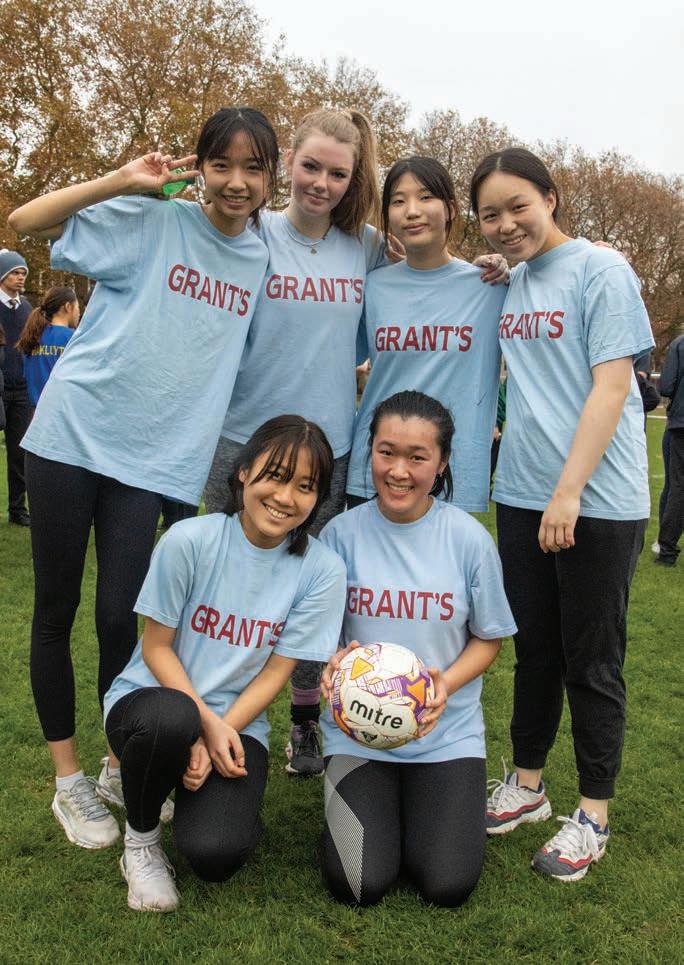
Grant’s has been a force to be reckoned with in sporting competitions this year. There was a sizeable gap between us, the victors, and second place in the Towpath long distance races. Nicholas Taylor in Fifth Form was magnificent, winning the Juniors event. To follow that up, a team effort in the Bringsty Relay landed us in second position. Grantites are as agile with their minds as they are on the sports field. Rafael Leon-Villapalos led our general knowledge team to victory and our House Chess team fought valiantly for their third place.
To everyone in Grant’s, congratulations on yet another immensely successful year. Most importantly, to Mr Fair, thank you for making Grant’s the place it is. Only a great Housemaster could turn a story of a rat into a story of how a House can be a home in a single Abbey talk. That place is clearly Grant’s, a place anyone would be proud to call their home.
Rigaud’s has had its ups and downs this year but, with an overall solid collective performance, it is with pride that I am able to recap. Two of our greatest successes were in House Shooting, with special thanks to George Wormald and Julius Petersen for their legendary marksmanship, and a comprehensive victory at House Swimming, with particularly excellent swims from Megan Sng and Sam Lui. We stood out in House Tennis, coming first in both the Girls’ and Junior competitions, and our Senior Boys close behind in second. Athletics
was similarly successful with Matthew Kemball winning the solo and the House coming second overall. This trend of Rigaud’s home being second place was thus established and we eagerly grabbed spot number two in House Football as well – also calling it quits after round number two in House Cricket. It was at this point that Rigaud’s started to lose its footing, and the ups slowly changed course. While I prefer to maintain a more positive outlook, House Chess is best summarised by its figurehead Brian Morris: “Feel free to talk about
how badly House Chess went as much as you want.” We performed sufficiently well in the Towpath, but with the caveat that our Fifth Form contestant Hugo Canning-Jones had a few too many beans for lunch, with most dire consequences.
Thus, Rigaud’s has had a turbulent year. There are other competitions that Rigaud’s participated in, such as House Rounders and House General Knowledge, but I have decided to omit these too – for no reason in particular, of course.
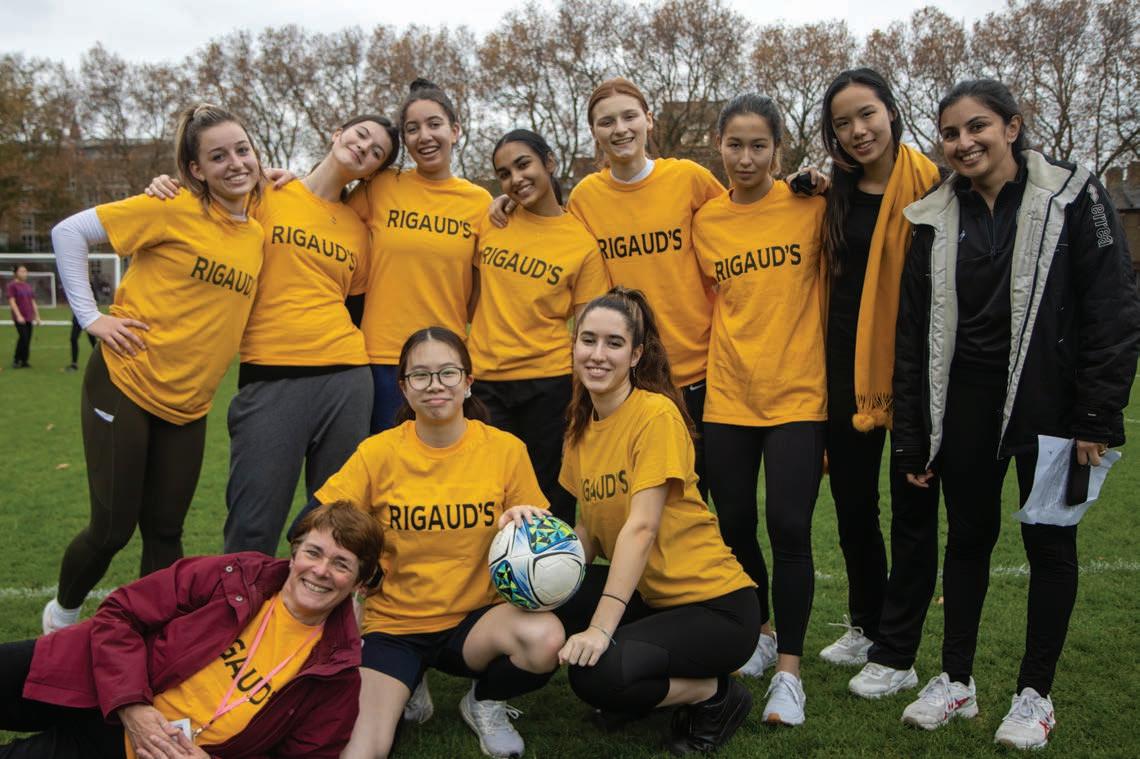
Once again, Busby’s has been able to overcome the difficulties of a location described (by members of other Houses) as “reclusive” and “not actually on Yard” and dominate the Westminster landscape. Carried on the (broad) back of Freddie Flowers, Busby’s triumphed in Senior House Football, with Mr Bradshaw, Mr Coles and Mr Bradshaw’s father-in-law offering encouragement and sound tactical insight. Podium finishes in the Senior Towpath and Bringsty Relay continue to add to the impressive sporting accomplishments the House has achieved under the Bradshaw regime, with a fourth consecutive sports day triumph surely imminent.
Busby’s also remained a House of culture, as was evident to all who attended the House Concert. Marcus Min, Chippy and Dr Walsh, amongst others, gave powerful performances, the latter’s rendition of The Hippopotamus Song accompanied by Dr Prentice especially moving. The night’s crowning glory, however, was the passionate performance of Britney Spears’ Toxic (featuring a Cameron Kersey solo). Some more enthusiasm from the Lower School in portions of the dancing would, however, have been appreciated.
On the home front, Ms Loosemore has run a tight ship, with the House
kitchen generally tidy despite the efforts of some, with the addition of Biscoff spread to the larder a source of great joy to those in the House, although we do mourn the loss of Frosties from the cereal rotation.
It is, sadly, time for the Remove to, you know, remove themselves. Yet there is no doubt that we can look back on a good year, and trust that under the leadership of Mr Bradshaw, our tutors and Matron, Busby’s is in good hands for the future.

In another eventful year, Liddell’s exuberant House spirit has persisted. Although we pride ourselves that “it’s the taking part that counts”, this year, for the first time in seven years, we can proudly proclaim that Liddell’s has won a House event, the Junior Boys Swimming! Sport wouldn’t be the same without Dr AK’s continued support from the sidelines, where anything but faint cheers could be heard when the girls came second in House Netball. Though the same can’t quite be said for House Football or Chess (despite Nick’s best efforts), our girls triumphed, coming second in House Tennis.
Our creative spirit continued into the evenings, where kitchen experiments showed no signs of slowing. Highlights included Pancake Day, complete with a homemade whisk and pancakes cooked on the toastie machine, and Claire making strawberry jam in the microwave. Liddell’s wouldn’t be complete without its pizza nights, which saw Fifth Form and Remove alike dancing along to hit 70s songs. One World Week saw an influx of amazing food offerings, in particular Dr AK’s plantain, and Diwali saw a steady stream of non-Liddellites coming to get a bite of jalebi.
Beyond food, Liddell’s connected over Friday poetry with Melinda, with some brilliant renditions from willing Upper Shell volunteers. Matron’s enthusiasm and care have kept our spirits high, and we welcomed our new resident tutor, Dr Jones, who has certainly made Liddell’s a greener place to be. Thanks also of course to Dr AK, who has guided us through another year with boundless energy, the core of Liddell’s House spirit. Liddell’s is truly a brilliant place to be, it continues to nurture the spirit, stubbornness, and identity of all those fortunate enough to pass through its doors and is truly emblematic of Westminster at its finest.

Purcell’s has seen big changes this year – no, not just the installation of a Wii with Mario Kart. The appointment of Ms Joyce as Housemaster has invigorated House spirit and brought new energy to Purcell’s. On arrival in September, the House was opened up, with all years now sharing an expanded common room and the upstairs TV room transformed into a quiet study space, complete with music from the Chapel. Of course, the most important additions were the pool table and table-football, both of which regularly prompt long queues of Remove and Fifth Form alike.
When it comes to non-table-based sport, Purcellites are used to hearing that it’s not the winning that counts. However, this year, from Basketball to Chess, we saw plenty of success. The Fifth Form won the Juniors category at Athletics Day, and the Senior Boys lifted the trophy in 5-a-side Football – not something Westminster footballers might be used to. Regardless of how the team fared, they could always be sure to see purple flags waved on the side-lines. If there were a trophy for the most enthusiastic supporters, Purcell’s would also have added that to our collection.
Making the most of the sunny weather, Ms Joyce regularly held House events in the gorgeous roof garden. When the temperature

dropped, we moved indoors for pizza night in the common room and an evening of festive decorating and Christmas carols. Everyone coming together and singing and dancing to Miley Cyrus, as well as being how the Sixth Form spent many Station afternoons in the common room, was the highlight of our House Concert and, potentially, the whole year.
It’s been a fantastic year for Purcell’s. In sport, music, and everything in-between, the House is going from strength to strength and I’m sure that will continue into next year and beyond. If we’re lucky, we might even get some more games for the Wii.
Return to normality – if normal is possible at Westminster –has certainly been welcome in Ashburnham. Not only does this mean House-wide access to the kitchen, it has also facilitated proper contact between the years. It has been fabulous to welcome the new Fifth Formers and Sixth Formers into the House, an enlivened atmosphere buoyed up on regular House treats (Mr Walton has supplied a nearconstant stream of Krispy Kremes). Indeed, this collective spirit has certainly expedited one of our most notable triumphs: the continuously superior dismissal from Abbey. Ashburnham has never caused a bottleneck in the aisle. God forbid.
Despite some disappointing sporting events – a loss to Liddell’s in the first round of the Boys Football XI tournament on penalties exemplifies this – a comfortable third place in the recent House Athletics competition suggests we have regained our form. This was swiftly followed by the Senior Boys’ first place in the Tennis tournament, leading to the conclusion that perhaps, summer sports reign supreme for Ashburnham. Special mention – I promise I am not biased in the slightest – must of course go
to the Senior Girls sports team, who won almost every single event –Netball, Athletics, Towpath, etc., etc. Ashburnham, however, is not confined to sporting successes, with our House Concert acting as a perfect emblem of House-wide talent and mutual support. The inaugural performance of our new House anthem – I Vow To Thee Ashburnham – was certainly memorable, to say the very least.
All, however, is not rosy in Ashburnham, as we wave goodbye to Mr Walton as our Housemaster. It is impossible to summarise how devoted and brilliant he has been to the House over the last five years, but I think it’s safe to say that the House’s identity is now askew. Fortunately, his (Italian suede) shoes are now to be filled by Ms Franco. We wish her the best of luck at the helm.
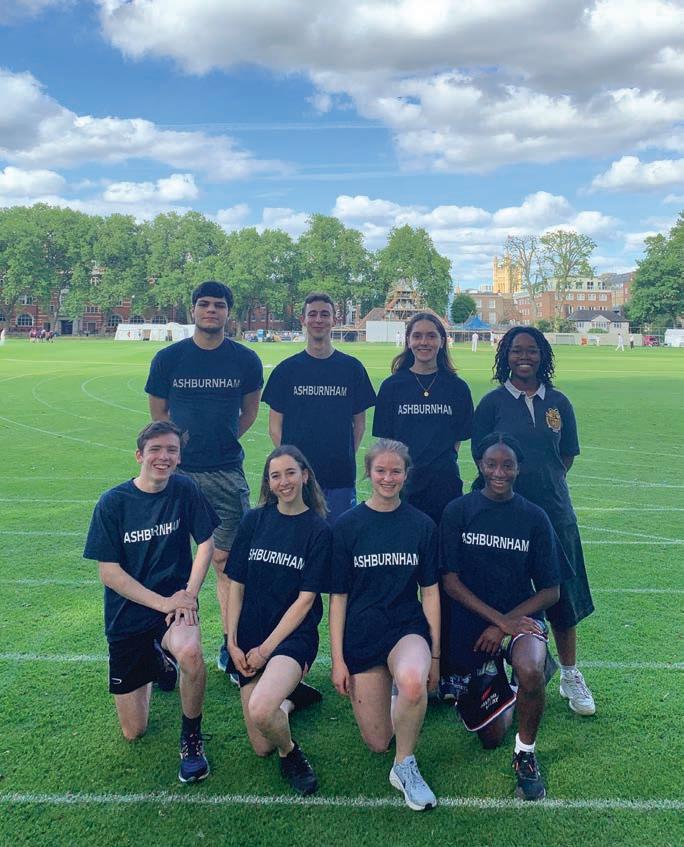
This year, Wren’s welcomed back its ever-growing House spirit! September Saturday started strong, with Wrenites testing their entrepreneurial mindsets in not one, not two, but three stalls; the famed “sponge the teacher” making a heroic return and giving all pupils the opportunity to clear out some teenage angst.
As we reached the end of Play Term, festive doors sprang up along our corridor as part of the Christmas door decorating competition. The Fifth Form’s Christmas tree (decorated with a haunting plethora of Fifth Formers’ faces as baubles) and of course the Remove’s winning Santa Claus (who, I feel compelled to say, won the pizza party by talent and vision alone, and not by any unwarranted suspicion of favouritism) are worth a mention. Wren’s next intra-house competition, table-tennis, was also a hit amongst Wrenites –inspiring our brazen competitiveness. But its outcome may also be indicative of Wrenite forgetfulness – or rather, occupation with academics – since we never actually got around to hosting a final...
In House Football, the boys also lost sight of the final (although reaching the semi-final in both 6-a-side and 11-a-side is commendable). Luckily, Wrens secured victory in both the girls’ 5-a-side (thank you girls!) and in the Bringsty race, with Clara Hartley clearing the record for the fastest girl’s time.
Wrenites also had a remarkable year in music. Once again, Christopher Wren’s Birthday Party was an absolute hit, with talents ranging from break-dancing to fortune-telling, and our Upper Shell band’s rendition of

Stairway to Heaven. The Wren’sDryden’s house concert, in memory of Drydenite Harvey Parker (OW), was the unforgettable musical event of the year.
Having sent out a quiz seeking out Wrenite opinion on the best moments of this past year, I feel it is also important to bring to mind
the moments in which we brought our neighbour Dryden’s to their knees, for example in the “clean sweep beating” in House Chess. We Wrenites have evolved during these Covid-ridden years and yet remain, in some ways, the very same. May next year be full of competition, excitement, friendship, and of course, proving our House is the best!
After a year behind bars, Dryden’s finally reopened for business in September 2021 and, in typical fashion, we hit the ground running. In Dryden’s, we take a quality over quantity approach considering the physical size of our House, but this year plenty of prize moments emerged from every year group.
Dryden’s has diverse sporting prestige. Kicking off (quite literally) with House Football, the Senior 11-a-side team fought valiantly to defend our title, pipped only just by Busby’s in the semi-finals, with about 60 shots hitting the woodwork. The juniors were equally successful in the 6-a-side
tournament, missing out on the final by just one goal. We enjoyed House Tennis success, coming third this year and winning at the close of last year, as well as fighting to defend our coveted House Rounders trophy. The Dryden’s senior 400m relay at Athletic Sports 2022 was a sight for sore eyes, and in a real last-to-first story we crossed the finish line in second on a day of abundant sporting achievement.
Unlike some, Dryden’s has more to its name than just sports results, and this year saw many artistic and musical achievements from across the House. A particular highlight was the House Concert, full of beautiful pieces from
Fauré to Prokofiev. Our dominance of the string section in the Lower School Orchestra brought about our very own string trio, and we retain our cultural laurels in the gallery space of the Art Department, and on stage, contributing starring actors and actresses to the school’s production of Oliver! . There is no doubting that our unwavering spirit found its way into each and every corner of co-curricular life this year.
All in all, I am proud to have been Head of House for such a successful year for Dryden’s, and I wish Seren and Patrick the best of luck for their roles in the House next year.
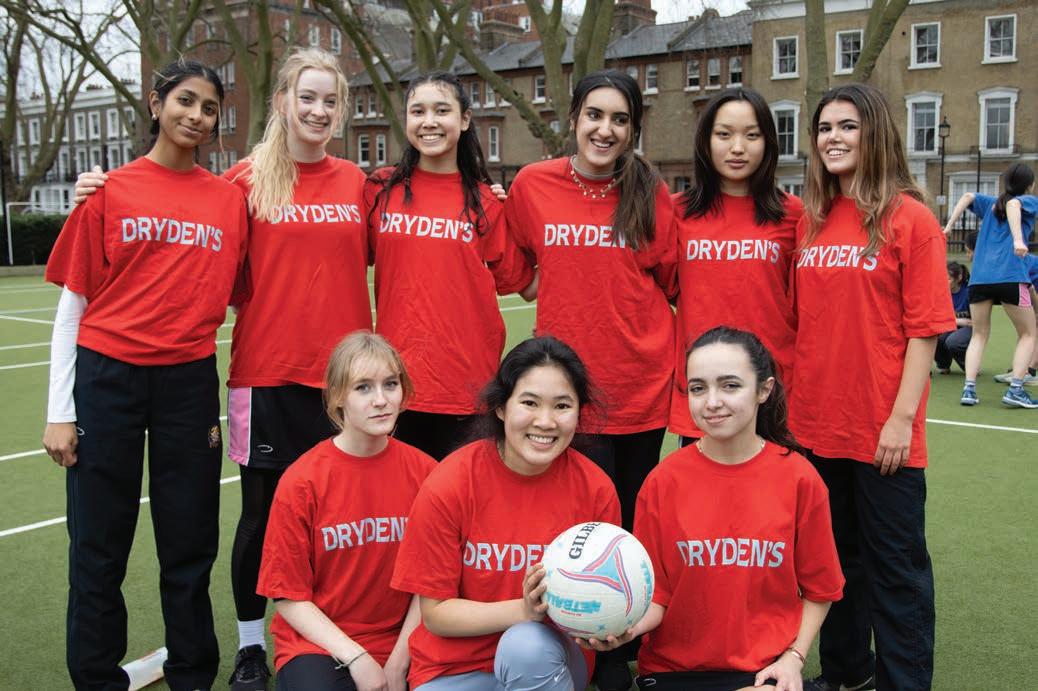
After the horrors of online school, Hakluyt’s has emerged from its chrysalis in a blaze of blue and yellow (no doubt thanks to Mr Kingcombe’s shrewd budget management). In perhaps the most exciting change to the school since the acquisition of Hooke, a “kitchen” (a toaster and kettle) has been installed in the Sixth Form day room, much to the glee of the hungry Lower Shells. Unfortunately, the strain of a kitchen may have been too much for the humble House halls – the boiler room, situated above the top floor of Hakluyt’s, suffered a leaking problem. Such is the cycle of karma. What’s more, the purchase of a new worldclass pool table has made our House the envy of Rigaudites and Busbites alike, and the commission of a huge portrait of the House captain has instilled discipline on rowdy nonHakluytians, ensuring that big Hakluyt’s indeed is always watching.
September Saturday started the year on a good note. Instead of our normal chocolate strawberry stand, we decided to host a sumo-wrestling stand in giant doughball-like suits. This was a massive hit, and we even managed to secure participation from the Head Master himself. Our responses to Black History Month and Holocaust Memorial Day, among other events, have been outstanding –so much so as to narrowly miss out on first place to Wren’s in a Black History Month competition. The Fifth Form have also settled in well, with the annual Nenthead trip being as enjoyable as a week in Cumbria with no phone signal can be.

There were some disappointments –in House Netball, our girls were robbed of a crucial victory over College by pitying referees, nonetheless gaining a respectable yet frustrating fourth place. Our boys fared less well in House Football, where our position can be politely passed over. Woe is the House that focuses on missed opportunities, however. Our House film night, where we watched Oceans 11, smashed box office expectations. Our general knowledge team, comprising Ned Willis, Alexandre Guilloteau, Giulio Sotti and Blake Morris did well to reach the quarter finals but were bested by Grant’s.
Our junior footballers showed promise in reaching the semi-finals of House Football.
This year saw us wave goodbye to resident tutor Mr Mitchell. We will miss him, probably more than he will miss us in his cushy finance job in Berlin. Fundamentally, we have emerged from the gradual relaxation of year-group separation in a swell of House spirit, culminating in strong sports day effort. We have also established a House song and Wylie’s Week, a weekly update for the House from, (you guessed it) Wylie. All in all, a good year for Hakluyt’s!
After a trying time under lockdown and Covid restrictions, Milne’s seized all available sporting opportunities, making the most of the returning inter-House competitions by winning both the Junior House Football and House Chess. The seniors, taking inspiration from the junior pupils, similarly had a brilliant tournament, arriving in the quarterfinals of the Senior House Football, and, likewise, in our aquatic pursuits, Milne’s secured a decent second in the Intermediate House Swimming, all propped up by our impeccable House spirit.
I’m proud of the House spirit I’ve experienced during my time at Westminster. I’ve loved all five of my years in Milne’s, throughout
Covid, exams, and more, and I’m immensely grateful to have been Head of House this year. There’s a certain nostalgia and melancholy which accompanies every ending, but I’m certain that our monitors Elias Gelain-Sohn, Olivia Hardy and Tara Mottahedan will continue to help the House grow, sustain its positive environment and welcoming attitude to all new pupils. And, of course, they’ll have brilliant support under the watchful eye of our unsurpassable Housemaster Mr Smith and our magnificent Deputy Head Mr Morgan. I would especially like to thank Mr Smith for his incredible kindness, leadership and enthusiasm as well as for being very much the beating heart of Milne’s. Ms Franco has been an exceptional tutor for
Milnes, and although we are sad that she is leaving us, it’s comforting to know that she will just be next door as the new Housemaster of Ashburnham. They say life isn’t all peaches and cream, and though Westminster life can be demanding, Milne’s has your back through thick and thin.

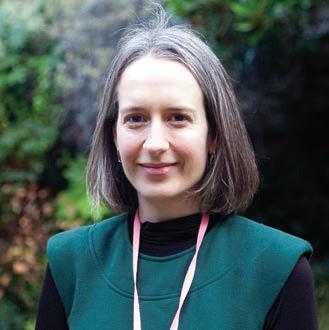

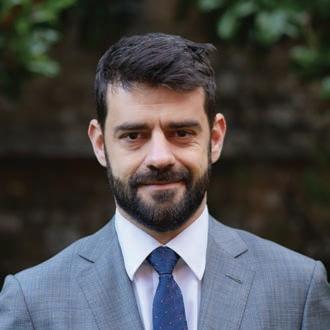
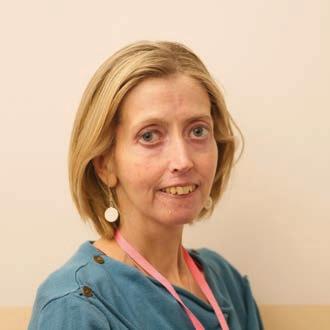






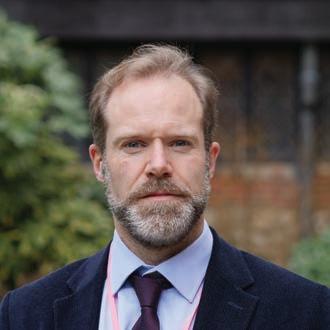




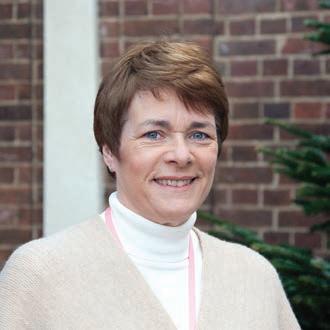
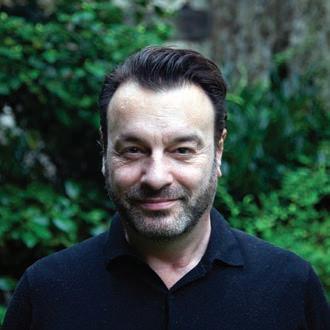
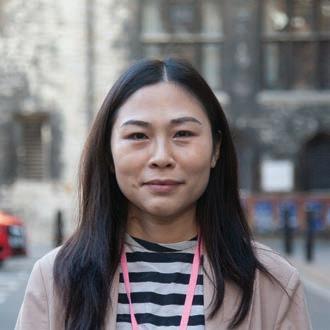
 Tom Kennedy
Nick Hulme
Rino Iida
Kevin Neuroth
Nick Massey
Jonathan Matthews
Giordan Price
Helen Wang
Ann-Marie Shaw
Paul Tully
Tom Kennedy
Nick Hulme
Rino Iida
Kevin Neuroth
Nick Massey
Jonathan Matthews
Giordan Price
Helen Wang
Ann-Marie Shaw
Paul Tully
Rachel Acheson
Rachel joins as the School Counsellor, having worked over the past ten years in various adolescent services within the NHS and voluntary sector. She is a child and adolescent psychotherapist and has studied at Durham University, UCL, the Anna Freud Centre, and the British Psychotherapy Foundation. Despite talking being one of her favourite activities, she has undertaken research into silence in adolescent psychotherapy, which she will happily talk about to anyone who will listen. Rachel has taught at a postgraduate level at UCL and Birkbeck and is involved in the Journal of Child Psychotherapy (great bedtime reading!). Outside of the counselling room, Rachel can be found reading, writing, going to the theatre, and spending time with her new puppy.
Tasos studied Classics in both Greece and the UK, completing his PhD in Glasgow on the Athenian politician, Demosthenes. He later completed a joint degree in the History of Science and Art with the Open University. He has taught at RGS Lancaster, Fettes College and Charterhouse, where he was Housemaster and Master of the Scholars. He is currently obsessed with medieval philosophy, especially Augustine, and has been trying to write a book on the differences between eastern and western spirituality. He loves Italian literature giants like Dante and Boccaccio and has a huge passion for Russian literature. In down time, he enjoys taking his two whippets, Rocky and Lailaps, for long walks, hiking (with the propensity to get lost), and playing Euro board games. He is immensely grateful for now living so close to the Curzon cinema and the National Gallery.
Ryan has recently returned to the UK to join the Physics and Chemistry departments. He studied Chemical Engineering at Cambridge and trained as a teacher at Exeter. He has a strong interest in the field of astronomy and anything to do with computers, gaming included. He is well-travelled, having gone to junior school in South Africa and spent the past five years teaching in China and Vietnam. As well as playing hockey and cricket, Ryan follows rugby and Formula One, and enjoys other outdoor pursuits including hiking and camping. He also enjoys applying his subject knowledge to playing pool, having represented Cambridge in the varsity match four times, playing against more than one current member of staff in the process.
Léopoldine grew up in France, and read Drama and English at the University of Manchester. She is currently undertaking a MA in Directing and Dramaturgy at RADA and has become particularly interested in the relationship between the actor and their attitude on stage. She is currently working on a play that she is going to perform in Beirut this April! Outside the classroom, you can generally find her drinking a cappuccino in the Common Room.
Edel read the English Tripos at Cambridge University, graduating in 2006. She took an Educational Diploma in teaching Shakespeare through performance (2013) and a Master of Studies (2015), also at Cambridge. She dived straight into teaching and life as an Assistant Housemistress at New Hall School, where she remained for seven years, meandering through a range of roles including Key Stage 3 coordinator, Housemistress (for a period of interregnum) and, finally, Second in the English department. The call of London led her to become Head of English at St James Senior Girls’ School in West Kensington for six years. While in situ at St James, Edel moved to live on site at Westminster, where her husband has been teaching since 2014. Edel currently spends most of her allegedly “spare” time enjoying life and literature with her daughters, and hopes that they will move onto George Eliot once they complete the Biff and Chip series.
Charlie joins the Classics Department after completing an MPhil in Classical Languages and Literature at New College, Oxford, where he also studied for his undergraduate degree. For the past two years, he taught part-time at Magdalen College School and at the Classics Faculty in Oxford. His research is focused on the Iliad, particularly the late antique and early Byzantine scholia which form a marginal commentary to the poem. In his free time, he brews beer and has been learning to bake bread, hoping to live up to his surname.
Dario joins the Physics department from Dulwich College, where he was Second in Department. He completed Bachelor’s and Master’s degrees in Theoretical Physics at the University of Turin and a PhD in String Theory at Queen Mary University of London. Dario spent a few years in the corporate world as an analyst and project manager in the market research sector, before deciding to become a teacher. He started his teaching career at Whitgift School and then moved on to Dulwich College for five years before joining Westminster School. In his free time, he practises Japanese Nichiren Buddhism, loves travelling, and enjoys tasting the plethora of exotic foods available in London restaurants.
Robert read Mathematics at Somerville College, Oxford where he specialised in abstract algebra. He joins the Mathematics department at Westminster from Think Academy UK where he was involved in teaching and developing curricula. Alongside his studies at Somerville, Robert was a Choral Scholar, singing in regular services, performing in recitals, and touring to India where he gave a rendition of Ireland’s Sea Fever at the Mehboob Studios in Mumbai. He has sung with the National Youth Choir of Great Britain and continues to develop his baritone voice in his spare time. Robert is also a keen tennis player and does his part to keep alive the dying art of the single-handed backhand.
Vivienne is Deputy Head (Co-curriculum, Planning and Events) and joins us from The Manchester Grammar School. She was born and bred in South Manchester and she enjoyed a few years in the North East at St John’s College, Durham. She is your classic English teacher who loves books and plays and she is looking forward to being able to embrace London theatre following her brave move down South! Viv also enjoys a bit of amateur sprint distance triathlon and is a lifelong fan of Manchester City. She particularly enjoys running, especially with her beloved dogs, Jessie and Scout.
As a boy, Nick studied at Charterhouse, then read for his BA and post-graduate qualifications in Spanish and French at Durham, KCL, Cambridge, Salamanca and Lyon Universities. He spent four years teaching at Dulwich before moving to Harrow to be Head of Spanish in 1996, and later Head of Modern Languages. After 37 terms, he moved to Eton as Head of Spanish in 2009, where he spent 38 terms. His principal interests are the theatre and animal husbandry: he kept an extraordinary variety of poultry and game – bantams, large fowl, ducks, ornamental quails, and pheasants –at Eton and misses them greatly in cock-a-doodle-do-averse SW1. Over the past 30 years he has directed (and occasionally acted in) nearly 60 school plays, and plans to direct the Purcell’s House Play. He is delighted to be teaching at Westminster, having saved the best til last.
Rino joins the Chemistry department after studying Chemistry at Imperial College London and completing a PGCE at Homerton College, Cambridge. Having lived in a number of different countries, Rino enjoys travelling and learning new languages, including Mandarin and Thai. Born and raised in Japan, she loves Japanese food, and when she goes home for holidays she brings back at least three suitcases full of it.
Tom returns to the Common Room after a gap of 14 years and one term, and would be interested to hear from the school archivist if that’s a record. He first arrived in the Maths department at Westminster in 1999, having just completed his PGCE following a Maths and Philosophy degree at New College Oxford. After several years in which he was heavily involved in Fencing Station and Expeditions, he left to pursue postgraduate studies at the Guildhall School of Music and subsequently a career as an opera singer. This has given him the experience of travelling the world, sharing the stage with some of the world’s greatest musicians, and limbo-dancing whilst wearing a parrot costume in a production of The Flying Dutchman. He’s delighted to be back in the classroom.
Nick Massey
Nick joins Westminster as Head of Russian. He completed a BA in Modern Languages at Selwyn College, Cambridge, where he studied ab initio Russian and German. He later completed an MRes in East European Studies at the School of Slavonic and East European Studies at UCL, and an MSc in Cultural and Social Anthropology at the University of Amsterdam. After three years working as a translator at the Foreign & Commonwealth Office, he became Head of Russian at North London Collegiate School, and most recently was Second in the Modern Languages Department at Wycombe Abbey School, where he taught French, German and Russian. One of his favourite hobbies involves planning charity cycle rides in remote parts of eastern Europe. In recent years he has cycled the coastline of Latvia and Estonia, navigated the Danube between Romania and Ukraine, and completed the Road To Hel (a small town in northern Poland), taking in the Curonian Spit and the Russian enclave of Kaliningrad en route.
Jonathan Matthews
Jonathan, a displaced northerner, joins the Mathematics Department this year after fourteen years teaching at Reading School in Berkshire. At Reading, he took on far too many roles to mention them all, but highlights included being Second and then Head of department, examinations officer, school governor, assistant boarding Housemaster for nine years, and the captain (for many years) of the undefeated staff University Challenge quiz team. Before joining Reading, he read for a Master’s degree in Mathematics at Imperial College, London, a PhD in theoretical fluid dynamics and finally a PGCE from The University of Manchester. Outside the classroom and other educational commitments, Jonathan is a keen theatre goer (who tries not to miss a performance at the National, Old Vic or Donmar), avid book collector, photographer of city architecture, supporter of Lancashire County Cricket Club and frequent traveller to the East and West coasts of the United States.
Kevin Neuroth
Kevin joins as German Assistant. After studying English and Film Studies at the University of Mainz, he completed an MA in English Literature at Humboldt University of Berlin. He discovered his love of teaching by introducing undergraduates in Berlin to Romantic poetry and Modernist novels. Encouraging young people to engage with other cultures is something he is keen on. At the moment, he is working on a PhD in English at King’s College London, where his research focuses on male hysteria in late 19 th - and early 20 th -century literature. Kevin first came to London as an Erasmus student in 2015 and is very happy to be back, not least because of the city’s fantastic museums. When he isn’t strolling through the Tate Modern or the Wellcome Collection, he is probably trying out new hummus places (tips always welcome).
Giordan joins Westminster as teacher of Music following two years as a Waynflete Academic at Magdalen College School, Oxford. Before joining Magdalen College School, he read Music and was a Choral Scholar at Somerville College, Oxford. Later, in pursuit of further academic engagement, he completed a Masters in Musicology at the University of Bristol, centred around the philosophy of music, with a particular focus on Marxist aesthetics and hermeneutic approaches to the study of music. As a proud Welshman, he enjoys nothing more than getting overoptimistic about Wales’ chances in any rugby or football competition and can often be found supporting his local establishments with a Butty Bach in hand. Giordan hopes to impart some of his Welsh heritage upon the pupils and relishes the thought of one day hearing hymns and arias echoing around the Manoukian Music Centre.
Ann-Marie joins Westminster as Rigaud’s Matron. Ann-Marie brings with her a wealth of experience after working for many years with Special Educational Needs pupils within a mainstream girls’ school. She is looking forward to the challenge of not only working with boys but also the number of stairs to her new flat in Rigaud’s. Outside of work, Ann-Marie is a qualified Sports Massage Practitioner and a keen hockey player for her local club. Having taken up playing hockey at a landmark birthday, she says she is far better at massaging. At the weekend you will often find Ann-Marie going on long walks or camping.
Paul joins the Drama department as Head of Academic Drama. He was recently Head of Drama at Shenfield High and ArtsEd Performing Arts School. Paul trained as an actor and worked in professional theatre, film, and television for some years, before completing a PGCE at Goldsmiths. He has been lucky enough to direct at some big London venues and is immensely passionate about acting and theatre. Paul is also a keen cook who loves to experiment with creating recipes. He has a huge love of animals and finds nothing more relaxing than being around his beloved cat and dog.
Helen studied Mathematics at CCNU in Wuhan, China. She worked as an assistant lecturer in WHPU in Wuhan for two and half years. Before moving to the UK, she was teaching in an international school in Qingdao, where she completed the PGCEi course with Nottingham University. She worked as a Maths teacher in Chelmsford for one year, then she joined LAE and stayed there for three years. Outside the classroom, Helen likes running. She has completed three marathons and hopes one day to run in the London Marathon.
Father Dan joins us from South East London, where he was born, and where he spent the past 20 years church planting, studying the church and serving parishes within the Diocese of London. Born into a family of teachers, Dan grew up wondering if he would ever escape the classroom. Thankfully, he loves all that comes with a life of learning and is currently writing up a doctoral thesis at the University of Oxford, focusing on contemporary Christianity and disability. Originally trained as an industrial designer, Dan has also been involved in a diverse range of projects ranging from Heathrow Terminal 5 to Virgin trains, shop interiors to furniture design. Naturally, Dan loves discussing love, life and faith, but finds himself equally happy building bikes and riding anything with two wheels – you may just see him scooting between school precincts!


Nick Kalivas by Tom
Edlin1997: a very different age. The Maths Department shared Ashburnham House with English, Economics, History of Art, Sinan Savaskan’s Music Room, and whichever other subjects needed occasional accommodation in that peripatetic time. Milne’s was just being inaugurated, and school email addresses did not yet exist. Beyond Dean’s Yard, Tony Blair was popular, and admired for his apparent integrity. We returned to school in the Play Term just days after the death of Diana, Princess of Wales, and preparations for her funeral in the Abbey were in full swing. Most immediately, this gave us an unexpected no-school Saturday and a cast-iron reason to cancel what would have been the inaugural Fifth Form Parents’ Barbecue up Fields. And in the midst of all this chaos, and the national outpouring of a rather disconcerting paroxysm of grief on our doorstep, Nick Kalivas arrived. If he thought he’d come to a madhouse, he didn’t show it. Rather, I suspect, the ensuing 25 years have shown that he quickly felt at home here, delighted and reassured in equal measure by our rather rackety style, and – libertarian as he has always been, by instinct and by conviction –by our preference for Doing Things Our Own Way.
Nick arrived from Dulwich College, where he had been Head of Department, as one of three new mathematicians; Mark Feltham, Master of the Queen’s Scholars, and Robert Wilne (OW) who became the founding Head of the London Academy of Excellence. Quite how it was he ended up here, and exactly whom he replaced at relatively short notice (Allwood? Cropper? Tim Jones?), even Michael Davies struggles to recall, but the tale centres around a rather old-fashioned “interview” with David Summerscale, involving a stroll once round Vincent Square during an early-season cricket match, at the end of which the deal was done. And since then, Nick has been at the heart of the teaching of Maths across the school, as admired for his characterful brilliance in coaxing
progress out of the weakest Sixth Form sets as for his inspiring and challenging approach to the most gifted. As a Housemaster, I have often had cause to be grateful that it was Nick teaching one of my more struggling mathematicians: his pithily honest appraisals and totally practical suggestions were invariably just what was needed.
Beyond the classroom, Nick was a long-serving and assiduous tutor in Ashburnham and Purcell’s, and he quickly became the presiding deity of Westminster’s general knowledge quiz teams, which seemed to win competitions and trophies at an almost alarming rate under his expert guidance and encouragement. Those looking for some activities for long evenings on expeditions would collect reams of quiz questions from Nick (and be glad if we’d remembered to ask for the answers too). His extraordinary range of expertise made him a go-to colleague on a number of subjects: US politics, of course, History, and in particular all aspects of the Greek Orthodox Church. He was a regular guest teacher for classes studying Justinian, offering an inspired lesson on Greek Orthodoxy, which always achieved the seemingly impossible feat of making the pupils see religion as an animating and creative force – and especially at a time when the fundamentals of Christianity were still being disputed and settled. Up to the point of Nick’s lesson, pupils’ contributions to discussion on religious matters tended to be brief and uttered through semi-stifled yawns; but afterwards, perhaps with the special sanctity of Theodora on their minds, there was suddenly depth and breadth in what they had to say. Centuries-old arguments still matter with their original force, and without some of the measured antiquarian gloss we’re more used to in the West. A natural in the classroom, remarkably well read, and with a genuinely distinctive intellectual hinterland, he also inspired a very particular Westminster pilgrimage on the Lower School Greek trip, to his ancestral home village of Mavromati, near the site of ancient Messene, where I recall a particularly splendid lunch…
Though teaching part-time in recent years, Nick has remained a real presence in Yard and the Common Room, and Zoom sightings of his increasingly luxuriant lockdown beard were highly prized. A man of academic integrity and great good humour, intolerant only of cant, pretentiousness and the sort of evidence-light modishness we see rather too frequently, he is a voice of wisdom and experience, ready to challenge lazy thinking and platitudes, but in a manner suffused with kindness and genuine feeling for the school community. Restrictions on transatlantic travel, and greater confinement when working from home may have sharpened his decision to carry through his thoughts of retirement, and we wish him all the best for the years ahead. He will be missed hugely, and we hope he’ll stay in touch.
Stephen Mitchell joined the Maths department in January 2020, arriving straight from reading Maths at Cambridge. In fact, he didn’t technically graduate until well into his time here. This, however, did not hold him back: having only just finished his time at university, and having been himself still at school at St Paul’s just three years prior, he brought a great enthusiasm and energy with him into both the classroom and wider school life.
Stephen is an excellently rigorous mathematician who regularly effused about the subject both in the classroom and in the Common Room. This love of the subject fuelled his teaching and quite regularly I would hear the Further Maths set we shared chattering over some intriguing problem he had devised for them, or some extension material they had been covering – in their words “some cool maths we’ve been doing with Mr Mitchell”. However, while he did make an excellent start into his time teaching at Westminster, all too soon the school, and society, closed due to the pandemic. Once
again, Stephen’s youth and “digital native” status ensured that he made a smooth transition to the online world where his mathematical zeal could continue to flourish. While new to teaching mathematics, it was very clear that Stephen cares deeply about the subject, and this translated to his lessons being thoughtfully planned and delivered with passion.
Outside of the classroom, Stephen threw himself into life at Westminster. Naturally, his love of maths dictated that he take up a keen role in the Mathematics Society at school, helping to run the club after the departure of Luke Lorimer last year. He also, under the stewardship of Michael Davies, helped to set up Maths Circles with the Lower School. However, Maths is not his only passion: as a keen rower at university he was quickly snapped up by CD to join the staff of Water Station, a commitment-and-a-half given how all-encompassing rowing can be at times. Stephen was also a tutor in Hakluyt’s where he helped the Fifth Form find their feet and navigate the constant changes to Covid regulations, and their impact on school life.
Stephen leaves Westminster and teaching (for now), to pursue a career in energy trading in Berlin – he seems destined to never have a normal induction experience into a new job! I do hope that one day he returns to teaching mathematics. It was not only a joy to see him enthuse about the subject, but it was clear that his passion infected those around him –and I am sure that he will have helped his pupils see the beauty of our subject. It would be a shame for that passion to be confined to the halls of industry forever.


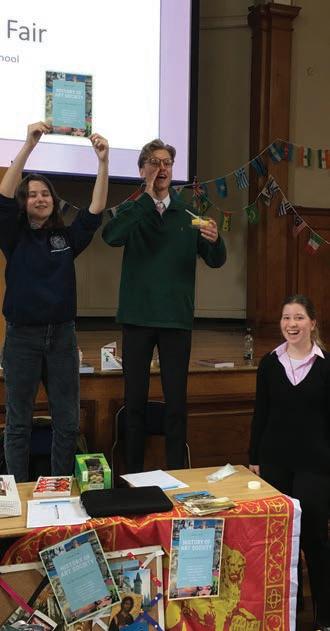
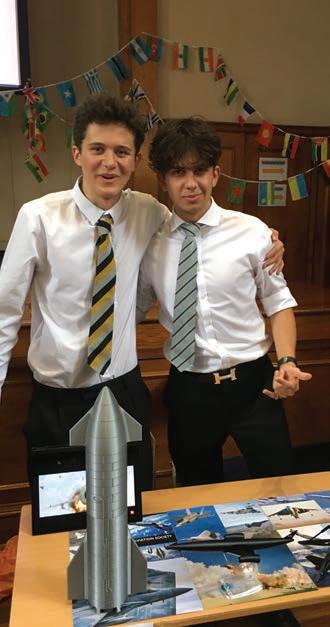

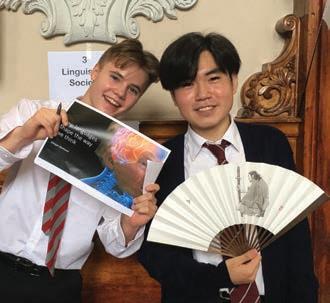




 by Ellen Pepper (BB)
by Ellen Pepper (BB)
This has been a lively and enriching year in Classics Society, filled with opportunities to explore the breadth of such a diverse subject. The inaugural edition of the Classics magazine Editio proved a fantastic success: thank you to Veronica Corielli (QS) and Claire Zhao (LL) for their editing efforts.
In true Classics fashion, articles ranged from Aristotelian virtue ethics, to an assessment of ancient democracy, to the concept of liberty in Aeschylus’s Eumenides. We hope to publish another edition before the end of the academic year, so there is much more to come! Elsewhere in the society, the year has been populated by a series of talks, from both external and internal speakers. A few highlights from pupil-led presentations include an analysis of Justinian the Great’s rule, and a discussion of Seneca’s letters. We have hosted screenings of webinars, such as Professor Paul Cartledge’s exploration of the mythic origins of Greek Thebes, and the exceptional moot trial for Boudica, held in the Supreme Court. The debate over the legality of Boudica’s uprising
attracted a range of members of the school community, and also provided the opportunity to raise money for Classics for All, a charity promoting education of classical subjects in schools nationally. We continue to encourage all ages to get involved in the Ancient World, and numerous Lower School quizzes have offered scope for educational fun and even healthy Classics-related competition. Recently, several Upper Shell Classicists even showed up the senior pupils with their knowledge of Hercules! A big thank you goes to Mr Ireland and the other Classics teachers for their support and help in making the society such an immense success this year. We look forward to more exciting events in the year to come!
Debating has had a rough ride since March 2020. Compared to when I started, days off school to go halfway across the country (if you’re lucky to a stunning, sunny Oxford Union and not a rainy day in Warwick) had been replaced with less jovial online debates, fought from a tiny screen in your bedroom. Competitions were sadly still online at the beginning of the season, but the Sixth Form and Upper Shell were still able to get useful experience, showing themselves straight away to be linchpins for the society through their reliability. By March, offline competitions meant the time had come to eat cold, cardboard pizza whilst making bad small talk with someone you’d just argued with for an hour.
UCL Schools’ was first. Defending Westminster’s title from the last pre-Covid competition in 2020, Titus Parker (HH) and Nic Rackow (PP) won. Oxford and Cambridge Schools’, the peak of the season, followed. Oxford first, and two of three teams (Titus and me, and our England dynamic duo of Nic and Helen Chau (PP)) made the semifinals, with Manon
Graham (HH) and Alessandro d’Attanasio (QS) narrowly missing out. Sadly, no British teams in the final meant that was it. That left Cambridge, where we were surprised by old coach Keshav popping in to give his ever pessimistic analyses of our speeches. Nic and Helen made the final, before Team Philippines took the win. I’m sure they will go one better at World Schools’ for Team England, with Nic steering that ship as captain.
We are all very grateful to Ms Freeland and Kelli, our coach. Without their work behind the scenes (and Titus having more of a grip on his life than most), my and Helen’s inability to reply to emails would have wreaked even more havoc than it already did. We must also mention other Removes who, the past few years, have formed the base for our success –Elias Laurent (WW), Samvit Nagpal (HH), Ayan Vijaypurkar (RR), to name but a few, thank you. All in Remove, who owe Debating more than
Feminist Society has had an extremely successful and proactive year, leading progressive initiatives, and hosting weekly events.
(MM)
A plethora of talks have been presented, such as Jessica Macfarlane (PP)’s Instagram feminism: the aestheticization of the feminist struggle, and Catherine Williams-Boyle (PP) and Alex Kim (MM)’s presentation on The Lolita effect: sexualising innocence and youthfulness. We have hosted several discussion-based events, addressing subjects such as Misogyny in the rap industry, and the significance of International Women’s Day. To celebrate and acknowledge the multifaceted nature of feminism and its significance to different people
we could ever have imagined in a cold, dark D27 in 2019, wish the staff and years below (who will miss out on innumerable joys if they don’t sign up!) the best next year, after another year as the most successful British school on the BP circuit.
within the Westminster community, we issued the Play Term 2021 edition of Not Pink. Its thirteen articles showcase a range of feminist works, from Neha Agrawal (AHH)’s creative piece, the nights, to Nikita Lavender (OW)’s analytical How accurate is the view that Matilda’s failure was as a result of her gender With the guidance of Ms Barton and Ms Goodman, and the devotion of the Feminist Society Committee, Feminist Society plays an integral role in tackling gender inequality. In addition to creating
Over the last two terms, a dedicated cohort of Sixth Form pupils met every once in a while, to take part in French Debating Society, or joutes oratoires as we like to call it.
French debating is certainly not for the faint-hearted, since it involves not only speaking in depth, often spontaneously, about complex topics but also it involves you speaking in French, and only French! In our first meeting, motions discussed included “This house believes that the Covid-19 vaccine should be a choice”, “This house believes that the current British government is in the worst state ever” and “This house believes that we currently live in the best time to be alive”. All motions were debated to a very high standard and left a great foundation to build upon for the upcoming regionals of the French National Debating Competition, held at St Paul’s Girls’ School. Despite rather minimal preparation compared to other schools (and even having a debater who does not study French!), we managed to put up a good fight, and we look forward to progressing further in the competition next year. This has been a pleasing year for French Debating Society, and we hope to hold more society meetings, encourage involvement from younger years, and arrange fixtures with other schools.

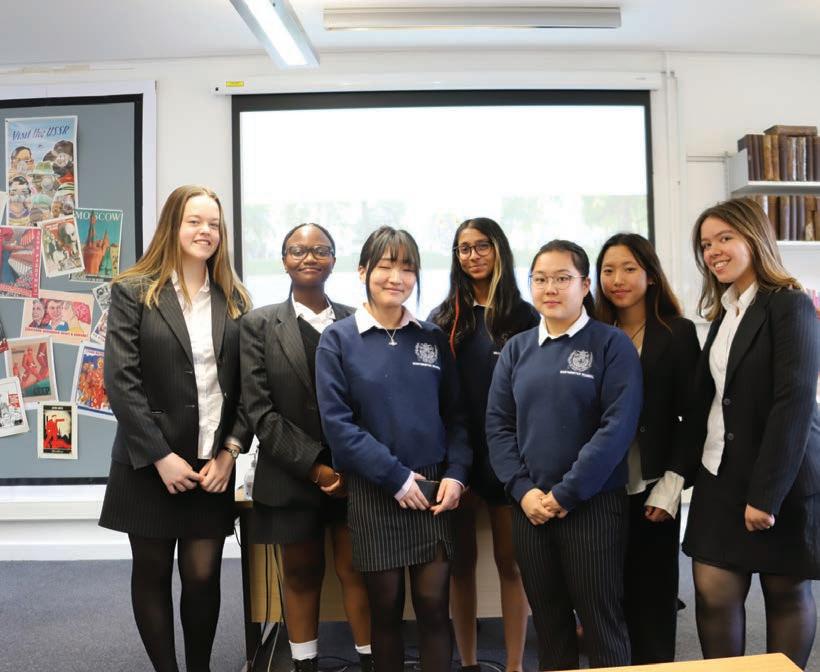
both vocal and written discussions surrounding feminism, we focus on practical developments, such as the implementation of free and eco-friendly sanitary products in all women’s bathrooms, and the consistent communication between committee members and the SMC. On behalf of FemSoc, I thank all the staff and pupils who attend and support our events. As the largest and most active society, the committee plays a crucial role in shaping and improving the school community –best of luck to the 2022 Committee!
 by Magnus Cameron (DD)
by Magnus Cameron (DD)
This year, French Society was lucky enough to welcome author and journalist Agnès Poirier as part of the Maurice de Pange lecture series.
Discussing her latest book, Notre-Dame: The soul of France, with a panel composed of Katya Braithwaite (LL), Isabella Fiske-Harrison (QS) and Magnus Cameron (DD), the fateful evening of the 15 April 2019 was dissected, and the grand and extensive history of the cathedral was uncovered. Since the start of its construction in 1163, Notre-Dame has witnessed some of the seminal moments of French history, from the Revolution and Napoleon’s coronation to the celebration of the liberation of Paris from German occupation after WWII. It has come to stand as a symbol of tenacity, culture, and romance worldwide. We welcomed back the Lycée Français Charles de Gaulle for the yearly concours d’éloquence, a challenging speech competition where a select group of Sixth Formers delivered declamations in French to a panel of judges on figures from Javert to Chanel. All in all, a year to be proud of!
German Society has enjoyed an action-packed year. We have hosted a whole range of events dedicated to exploring German cuisine, debating the future of German politics, and examining the details of Germany’s uniquely traumatic past.
As the year began in September, the 2021 German elections were just on the horizon. To celebrate the occasion, we organised a German mock election with pupils representing the major political parties and delivering speeches to an eager audience. The event was well attended as usual, and our signature homemade cookies, which feature at all our debates and discussions, were particularly appreciated. For One World Week in November, we set up a German food tasting stall where pupils could try traditional cuisine from across Germany. This Essensfest (which loosely translates to “food party”) saw huge crowds gather in Yard as pupils tried samples of everything from Landjäger sausages to traditional Baumkuchen cake. To commemorate
Germany has acknowledged and taken responsibility for its horrific past. We considered how German literature, architecture, and education have contributed to Germany’s strong national culture of memory. Russia’s invasion of Ukraine prompted our most recent event, a debate on whether Germany should take further action against Russia. Isabelle Qian (PP) gave a comprehensive overview of the conflict and Germany’s uniquely challenging role as a primary importer of Russian gas. This set the stage for impassioned debate in both English and German, which led to no clear consensus but prompted reflection all around.
The past year of German Society has been truly wunderbar, and we

History of Art Society has had a terrific year teeming with lectures, gallery trips, and boisterous yet intense quizzes; all, of course, wonderfully supplied with a plethora of snacks.
Our wide scope of fascinating talks proudly featured topics ranging from Savonarola’s impact on Renaissance art (Philip Yanakov, LL) to post-war Japanese architectural movements and their impact on fashion (Nicolò Rossi, GG), and Suzanne Valadon’s confrontation of the male gaze (Dill Zhang, BB). We have also been incredibly fortunate to have had a series of thought-provoking external speakers. Nick Ross, the director of Art History Abroad, gave an enthralling talk concerning the depiction of love and marriage in 15th century artwork last half term, and Revd Dr Ayla Lepine, Ahmanson Fellow at the National Gallery, recently gave a compelling lecture investigating and exposing theological influences on art. We also look forward to publishing WHAM! (Westminster History of Art Magazine), which will feature intellectually stimulating articles and other creative bits of work, all written by Westminster pupils. Finally, we give our greatest thanks to Ms Goodman, for all her support in organising the events of the past year, and to all the inspired students who have delivered or attended our lectures.
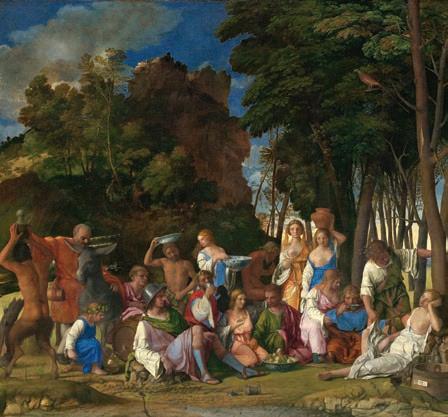
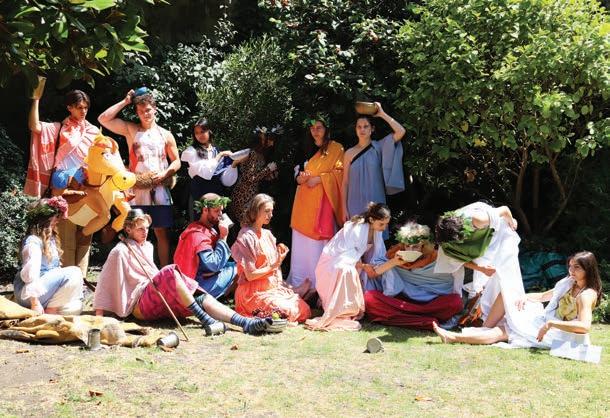
Coming off a year where Covid restrictions were still tight, where pupils were giving talks to a tiled screen of names, it was safe to say that we were a little unsure of what Huxley would be like this year. Thankfully, we didn’t have much to worry about as we saw a record number of Double Huxley weeks this year. Pupils were eager to share their knowledge on a wealth of topics spanning every field of science imaginable, from Aryan Daga (HH) on Quantum computing: The next decade’s cybersecurity revolution, to Julie Jung (PP) and Anisha Sawhney (LL) on Does the universe exist if no one is watching? It was especially exciting to not only have Removes and Sixth Formers giving talks, but also pupils from the Lower School, with Alexander Halley (LL) on The James Webb space telescope. The continued interest in Huxley remained high throughout the year, frequently filling the Lecture Room or Bentham Room at lunchtime, regardless of the presence of Celebrations tubs or packs of Oreos. We were fortunate to also be joined by external speakers, most notably the Tizard Lecture by Dr Ben Pilgrim on The Chemistry of Water: Everything you need to H2 Know, with the multiple explosions possibly concerning for Abbey security. Alongside talks, we hosted a Wiki-EditA-Thon, writing articles about women in STEM, an underrepresented field in Wikipedia articles, to contribute to Women in red
It was our pleasure to lead Huxley Society this year and see everyone (scientists and non-scientists alike) take part in sharing science with the school community. We hope we kept you entertained with our emails and events and as always, a big thank you to Mr Ullathorne for making this all possible. If you haven’t already, go follow @westminster_huxley :)
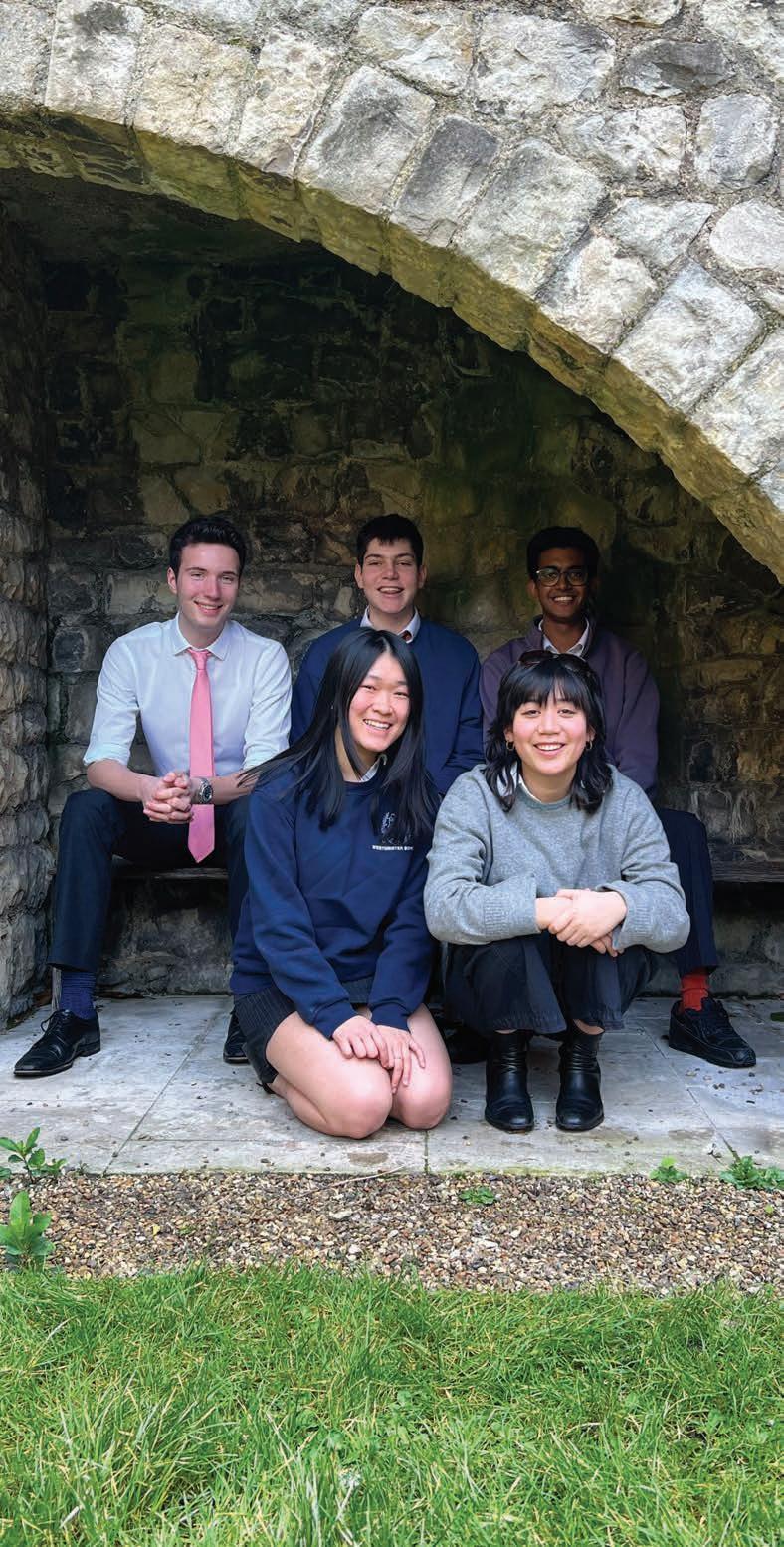
 by Sinan Aramaz (LL)
by Sinan Aramaz (LL)
With Covid restrictions lifted, the Islamic Society has returned to its former settings in 2022. Alongside our staple congregational Friday prayers, we now also had an Islamic prayer room in D05 for use at any time (moving to a room in Boult in 2022-23). We welcome any Muslim pupils who might be interested in making use of these facilities and joining the ISoc community. Following a display for the Societies’ Fair, the Islamic Society hosted a henna stall event for One World Week. During this event, pupils could chat and discuss the significance of the dye in various cultures. They also had the opportunity to use cones to administer their own temporary henna designs or, alternatively, have them expertly done by a team of pupil volunteers led by Mariam Abdelhadi (AHH). We look forward to further events in the near future and the observation of Ramadan.
As always, we strongly encourage Muslim and non-Muslim pupils alike to get involved and explore their interests in Islamic religion and culture.

After a challah-fuelled and thoughtprovoking discussion on The challenges of being Jewish in the modern world, we took a trip back in time to look at the history of Jewish communities around the world as part of One World Week. This fascinating talk was led by Joshua Nathan (WW), Niklas Vainio (GG), and Purav Menon (QS). They spoke about the settlement of Jews in ancient Babylon, 20th century Finnish Jews, and the small communities in India. We were all particularly amazed to learn that many Finnish Jews fought alongside the Nazis in World War Two, to protect their homeland from Russian invasion.
Fast forward to March, and we held a talk titled The Purim story: feminist epic, work of fiction, or celebrating genocide? Toby Levy (AHH) discussed the idea of strong female characters in the story, how much we can trust the books of the Old Testament to be accurate historical texts, and whether
it is right to celebrate a festival that seems to condone and encourage murder. We were treated to an exciting recounting of the story of Esther, homemade hamentaschen (thanks Toby’s mum!) and an expert analysis.
It is with great sadness that we are leaving the school and will no longer be leading Jewish Society. However, we know that our successors will do a great job and we look forward to seeing where they take the society next year.

Every year, One World Week aims to celebrate the multitude of cultures and ethnicities around the world and at Westminster. We felt, however, that the event lacked an awareness and representation of the wider and present Latin American community, so we founded Latin American Society in December 2021. Early in Lent Term, Rafael Medeiros De Lima Castro (MM) delivered our first talk, joint with Politics Society. Brazilian Politics and the Amazon Rainforest was an absolute success, a humorous take on Brazil’s (horrendous) politics with a generous share of traditional Brazilian sweets for everyone to try.
Contrary to Hispanic Society, Latin American Society provides a platform exclusively for Latin American voices. Whilst we encourage pupils and staff from all backgrounds to attend and enjoy LatAm events, our society, its events, and talks, are and will be led by Latin Americans alone. We hope that this society will continue to be a space where everyone can learn, discuss, and appreciate Latin American culture, experiences, and opinions, free from a stereotypical or Eurocentric lens. Fundamentally, LatAm aims to address the lack of representation within the pupil and staff body, particularly the disproportionate number of Latin American staff within cooking and cleaning positions – and the harmful stereotypes perpetuated as a result. With future events, such as academic talks and food swaps with other cultural societies, LatAm aims to create a proud and confident community of Latin American pupils and staff alike, as well as generate a more inclusive and conscious environment for Latin Americans at school.
Although Westminsters are not typically known for their diplomacy nor their patience, Model United Nations does tend to bring out the best in people.
Not to blatantly advertise MUN, but one must recognise the achievements that we have seen this year despite the difficulties of the pandemic. Indeed, from the 16 exceptional Westminster delegates attending the annual Berlin MUN at the start of the year to our very own Westminster MUN collaboration with Harris in early March, it has been a packed and very enjoyable year for us. Internally, we have seen exponential growth in participation within our LSA MUN elective (we now need a waiting list!), impassioned debate at our internal Lower School MUN, and a very competitive House MUN conference at the start of the year. Discussing topics ranging from the Russia-Ukraine Crisis to international regulations for cyberwarfare in Phone Awareness Week, it has been a year filled with pertinent current affairs and intellectual diversity. To top it all off, we have finally received our Westminster MUN tote bags, which will give the Library bags a run for their money. As we look to next year when travel restrictions have eased, we eagerly anticipate the return of the MUN trips abroad to New York and Europe. In all sincerity, many special thanks to Ms Franco, our Junior Secretary-Generals (Kaden Pradhan (WW) and Aryan Daga (HH)), and Rafael León-Villapalos (GG), whose continued support and organisation has allowed the society to flourish this year.

Poetry Society has had an exciting year, launching not one, but two new publications! The Chain celebrated the poems written over the lockdown, where each poet wrote a poem responding to a poem by another poet in the chain. We found that this new mode of interaction adapted well to the constraints of lockdown – this collection now records some of the experiences from that strange strange time.
WEFT collected the poems from the weekly Poetry Soc meetings in D20, with poems each week responding to a given prompt – these ranged from formal prompts, such as tanka and blank verse, to simply, “milk” and “frost”. It was always exciting to hear the range of responses interpreting the theme in unexpected and profound ways.
It was wonderful to see so many at the launch of these two publications, especially all the new faces! It has been a great year for Poetry Soc, and the society has a bright future ahead with so many brilliant poets in its fold – we can’t wait to see what lies ahead!

Over the past year, Pop Culture Society has embraced a wide range of talks and discussions on film, television, graphic novels, and the latest pop culture trends. After rounding out last academic year with a Zoom talk on Paul Verhoeven and a quiz afterwards, the relaxation of the Covid restrictions this year has been a refreshing change of pace and allowed the society to flourish, reaching even more broadly across the student body. The talk on Sam Raimi’s divisive Spider-Man 3: Masterpiece or CBM menace was an unmissable event.
Our magazine has also finally launched, comprised of film, culture, and music sections as well as a cryptic crossword (See if you can get them all!). Articles in the magazine range from Paddington 2: The best movie of all time to Music and the law: A case of blurred lines to The life and death of 20 th Century Fox
At this stage in the year, it is a transitionary period for Pop Culture Society as the heads of the society are preparing to leave school.
Current Sixth Formers Elena Zhang (HH) and Anvi Garg (WW) will be leading the society and we are always looking for more people from across the years to get involved.

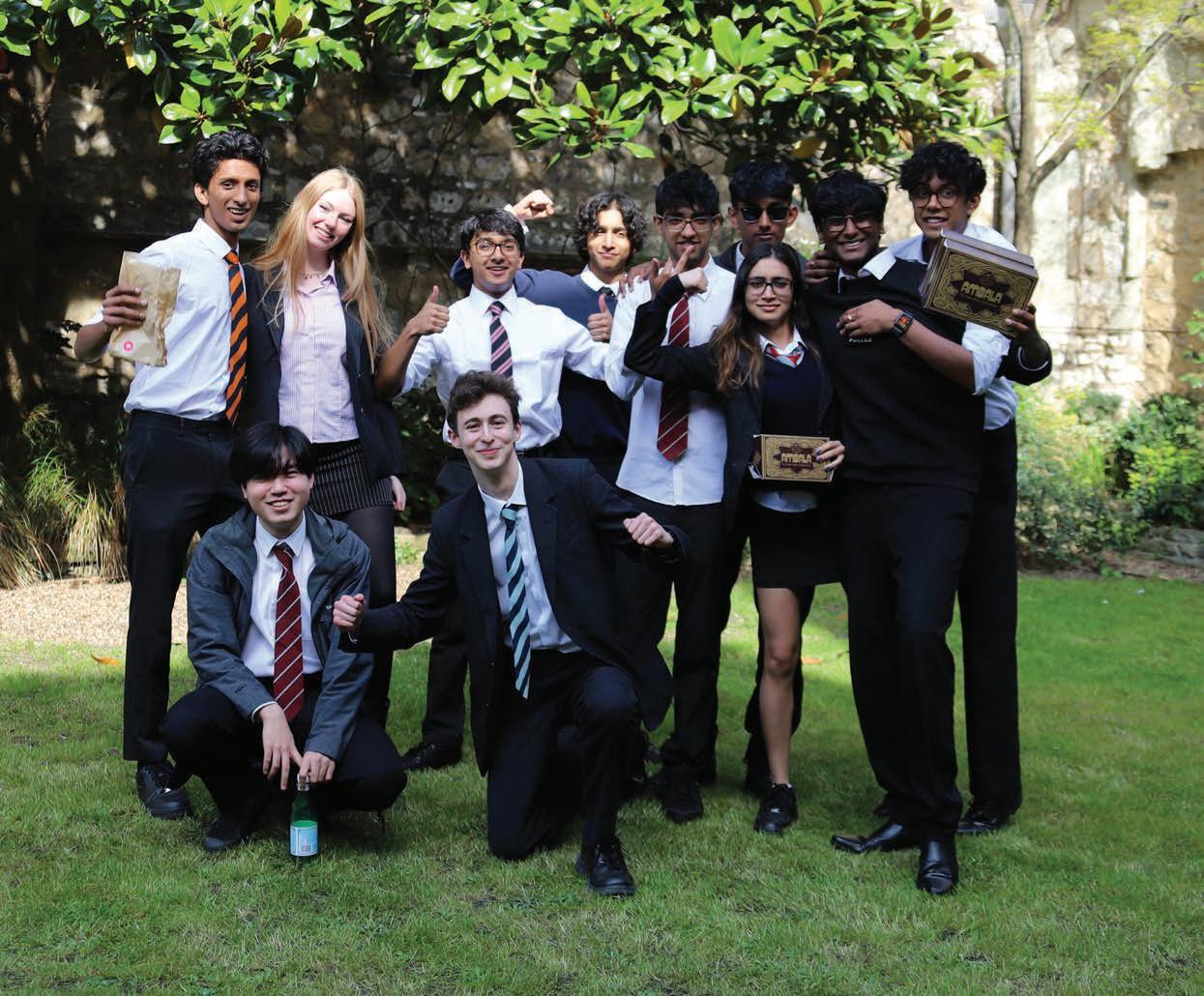 by Anya Saund (LL)
by Anya Saund (LL)
The festivities of Sub-Continental Society were in full swing this year.
We kicked off with a bang with our annual September Saturday Bollywood dance in Yard, choreographed and led by Annant Khullar (PP). Filling Yard with a fusion of popular Bollywood music, the audience full of pupils, parents and staff thoroughly enjoyed this energetic and exciting celebration of our culture. We hosted our inaugural Diwali Party, decorating Boult with fairy lights and candles to celebrate “the festival of light”. After months of House bubbles, it was lovely to bring together pupils from across the school to celebrate one of our most important festivals. Celebrating in style, we listened to music and ate samosas and gulab jamun, savoury and sweet Indian snacks, with the queues for food having to be crowd controlled to maintain order, highlighting the enthusiasm of SubCon Soc. After a usually hearty kahoot on the origins of the Diwali festival, Nikhil Singh (DD) proceeded to entertain us with his energetic dance moves. During One World Week, a week of celebrating Westminster’s diversity, we hosted a Bollywood Movie Night, watching 3 Idiots, a hilarious classic. It was a highly popular event, which was thoroughly enjoyed by pupils from throughout school. During the same week, on Cultural Dress Day there was an abundance of colourful SubCon outfits and people sporting bindis and traditional dress. We also welcomed Dr Banerjee, a political anthropologist from the LSE, to give a John Locke lecture, after she recently published a book on her fieldwork in West Bengal. Most recently, we celebrated the Holi Festival in the shadow of the Abbey in Ashburnham Garden to welcome in the spring. Anisha Sawhney (LL) and Kushal Agarwal (RR) organised the food, consisting of samosas, jalebis and ladoos. Dr AK kicked off the festivities with his dance moves, ending Lent Term on an upbeat note.
Sustainability Soc this year has gone from strength to strength. We have had a host of brilliant academic talks, which have showcased the growing importance of sustainability and the environment to almost every field of study. Some highlights were Lydia Zhang (LL) and Davin Qui’s (GG) brilliant talk on Energy subsidies: the key to energy transition, Manon Graham (HH) and Anisha Sawhney (LL) on Why geopolitics will push us past the point of no return, and Claire Jin (PP) and Julie Jung (PP) on Sustainability and the Synthetic Revolution. We have particularly relished the energy with which pupils have engaged in joint talks with other societies, as sustainability is intrinsically bound with so many parts of life. Some brilliant talks included Lauren Lendrevie’s (DD) joint talk with Fem Soc, on Why women are game-changers in climate change mitigation and Julie Jung’s joint talk with Korean Soc, on Pollution in South Korea: why is China being blamed?
The amazing variety with which pupils delved into sustainability inside the classroom was met with equal vigilance outside the classroom. Sustainability Soc had a bake sale, raising money for reforestation and for the Women’s Environmental Network, which went down a treat. We’ve also had some brilliant talks by external speakers. During One World Week, we welcomed Anna Åberg, who spoke on International cooperation with regards to climate change. We’ve also been making some meaningful changes on the ground, banning plastic water bottles in some boarding Houses and in Grab and Go lunches, with plans in the works to reform school recycling policies and food waste.
Sustainability at Westminster is flourishing.
We have a brilliant team ready and energised to take sustainability at Westminster to the next level, with an amazing level of staff support, from all areas of the school. We can’t wait to see some more positive changes and see the sustainability at Westminster continue to grow.



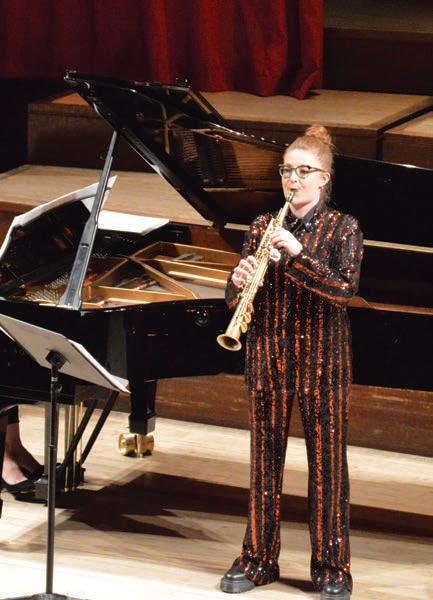 by Tim Garrard
by Tim Garrard
This year has been an exciting one, with the return to live music, instrumental lessons being taught in person all year, and House Concerts being enjoyed by all.
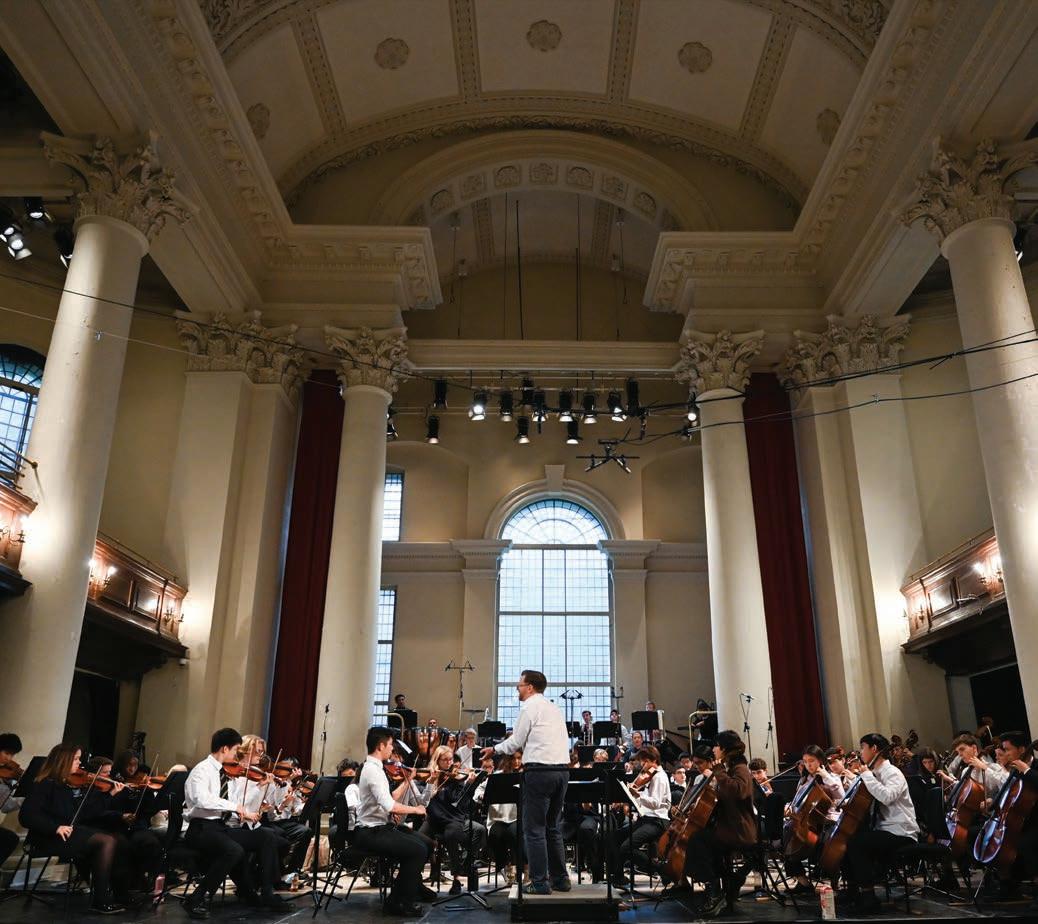
There was a real feel-good factor about trips to see the London Philharmonic Orchestra at the Royal Festival Hall, Tosca at the Royal Opera House, our Accompanist-in-Residence Edward Leung at Wigmore Hall, and Wicked at the Apollo Victoria Theatre.
Whilst a return to singing in the Quire was not possible until March, it was wonderful for the Chamber Choir to return to twice-weekly services in Westminster Abbey from September. They also journeyed to Yorkshire for a five-day residency at Ripon Cathedral. The Choir sang evensong and a lunchtime eucharist service at St Matthew’s Westminster, as well as evensong in Westminster Abbey. The Chapel Choir sang evensong at both St Stephen’s Rochester Row and St Matthew’s Westminster, and led the worship at the annual Confirmation
Service with the Bishop of London. The Chapel Choir also welcomed around 20 OW singers for the funeral of Harvey Parker – much loved OW and music scholar – in Westminster Abbey. At the end of the Lent Term, the Choir combined with WUS to sing Lotti’s Crucifixus in Abbey, conducted by Jeremy Walker (WUS Director of Music) who is retiring this summer.
The Carol Competition was open to all pupils, and this year’s winning carol, There is a flower by Jessica Macfarlane (PP), was performed at the Carol Service. It was a joy to welcome back some OWW to sing in the choir on this occasion. In preparation for our return to the Barbican, the Westminster Choral Society – a choir of current parents, OWW, and parents of OWW – rehearsed at St John’s and in our Sports Hall. On Monday 21 March,
we performed Mendelssohn’s Violin Concerto, with National Youth Orchestra violinist, Towa Matsuda (AHH), Poulenc’s Gloria, and Rutter’s Requiem with close to 250 musicians.
Weekly Mus Socs in the Chapel continued at pace, brilliantly organised by Mus Soc Secretaries Elektra Makris (HH) and Purav Menon (QS), and both instrumental and vocal soloists had the opportunity to perform. Piano forums allowed our pianists to perform on a regular basis, and it was very good to welcome the families of our 50 music award holders into the Manoukian for soloists’ concerts.
Our Orchestral Concert was scheduled earlier than usual, on Monday 4 October. This meant that, prior to the final rehearsals, the Lower School Orchestra had rehearsed together
twice, and the Symphony Orchestra three times! They rose to the challenge magnificently, performing movements from Tchaikovsky’s Nutcracker and Swan Lake, and Dvorák’s Symphony No.9 From the New World. In the Concerto Concert, eight Remove pupils – Tatiana Fraser (DD), Elektra Makris (HH), Maia Davies (MM), Madeline Rodzianko (BB), Titus Parker (HH), Phoenix Mombru (QS), Audrey Zhan (PP), and Emma Vestergaard-Poulsen (WW) – performed concerto movements by Glière, Milhaud, Saint-Saëns, Schumann, Finzi, Copland, Scriabin, and Beethoven. The Recital Hall hosted the Play Term Vocal Concert, and we enjoyed our termly Ensembles Concert up School.
We invited pupils from Grey Coats, Harris Westminster, Pimlico Academy and Westminster City to join us in recitals at The Guards’ Chapel, and we were joined for one of these by the choir of Burdett Coutts Primary School. Our trumpeters also continued the tradition of playing the Last Post and Reveille at local primary schools. VMTs Robin Ashwell, David Campbell, and Anya Fadina performed works for viola, clarinet and piano in a lunchtime
recital, and, towards the end of the term, Anya organised a fantastic concert in aid of the Ukraine Crisis.
The Jazz Department entertained at the Shrove Tuesday Dinner, and the Jazz Evening was a huge success up School, with fantastic performances from our jazz ensembles, while Olivia Hardy (MM), Blake Morris (HH), Titus Parker and Purav Menon gave some excellent solo performances. The pop musicians performed at the Pop Music Concert in the Manoukian, and a large number of our musicians starred in the Music and Drama departments’ joint production of Oliver! to rave reviews.
The Lent Term began with the 33rd Sir Adrian Boult Memorial Concert which, for the first time, was held at St John’s Smith Square. Internationally renowned saxophonist, Jess Gillam, performed a wonderfully diverse programme to an appreciative audience. Other highlights included a Women Composers’ Concert organised by Jess Macfarlane and the Summer Concert up School, as well as the traditional end-of-term sequence of the Leavers’ Concert, the Leavers’ Service, and the Election Dinner.
We continued to schedule our Music and Wellbeing webinar series online, and Paul Harris began the academic year with a talk on Simultaneous Learning. We welcomed Nicola Benedetti and her Benedetti Foundation to run CPD sessions for their young ambassadors, with speakers including Anna Lapwood, Misan Harriman, Alina Ibragimova, Dame Evelyn Glennie, Suzie Collier and, via zoom, Wynton Marsalis! We welcomed Orchestra For All at the end of November. Founded by Marianna Hay MBE OW, Orchestras For All is breaking down barriers to give all young people the life-changing experience of making music together. The charity ran a day of rehearsals and performances up School.
A Composers’ Workshop took place on the first day of the Election Term. Two days later, our woodwind players took part in a masterclass with clarinettist Nicholas Carpenter, whilst our percussionists performed at the RCM’s Festival of Percussion. Daniel Moult gave an excellent Music and Wellbeing webinar entitled The ultimate performer, in which he discussed the psychology of performance and suggested how to

deal with performance anxiety. There was a fascinating harpsichord forum in the Chapel, in light of the exquisite 1745 Kirkman harpsichord currently residing there on loan from the Handel Hendrix House Museum. The Chapel also hosted the Lent Term Vocal Masterclass with countertenor Robin Blaze.
Towa Matsuda, Marcus Min (BB), Emma Vestergaard-Poulsen and Elektra Makris progressed through to the Pro-Corda Final, whilst String, Piano, Percussion and Brass Masterclasses with Ani Schnarch, Colin Stone, Dan Ellis, and Crispian Steele-Perkins respectively allowed our pupils to gain the insight of internationally renowned musicians.
Towa Matsuda and Emma VestergaardPoulsen were first-rate School Music Captains, for which we are extremely grateful. Naoki Aso (PP), Rhys Evans (MM), Towa Matsuda, and Phoenix Mombru were awarded places in the National Youth Orchestra. Naoki was also awarded a place in the National Youth String Orchestra, opting to join the NYSO. Georgi Pilz (DD) and Purav Menon, won choral awards at Merton and Brasenose Colleges, Oxford. Maia Davies (MM) won a choral scholarship to Selwyn College, Cambridge. Ethan Wu (DD) won the 4th New Talent British International Youth Music Competition (age 12-15) and the Iris Dyer Piano Prize (intermediate category for the students 14-15 years old) at the Royal Academy of Music. Shutian Cheng (WW) and Rhys Evans progressed to the prestigious category audition round of the BBC Young Musician Competition on piano and violin respectively. Ben Bloor, School Organist, won Second Prize in the Canadian International Organ Competition, and Edward Leung won joint First Prize in the Wales International Piano Festival’s Accompanists’ Competition.
All in all, it has been a wonderful year for Music at Westminster!
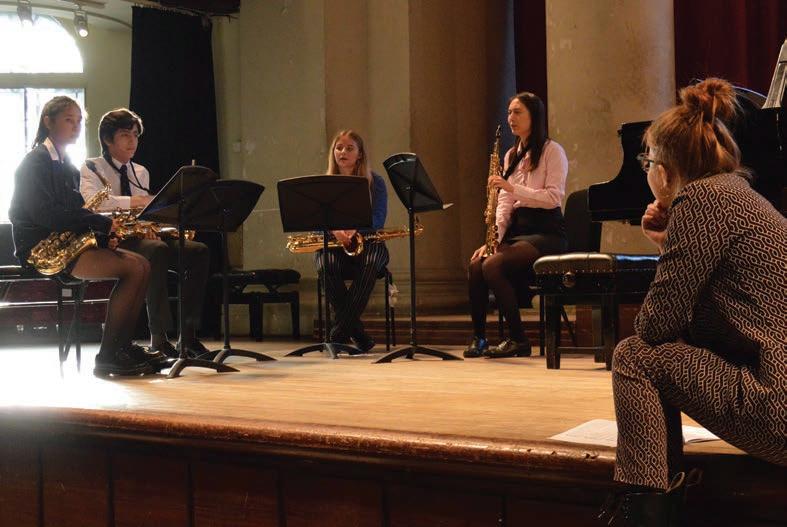
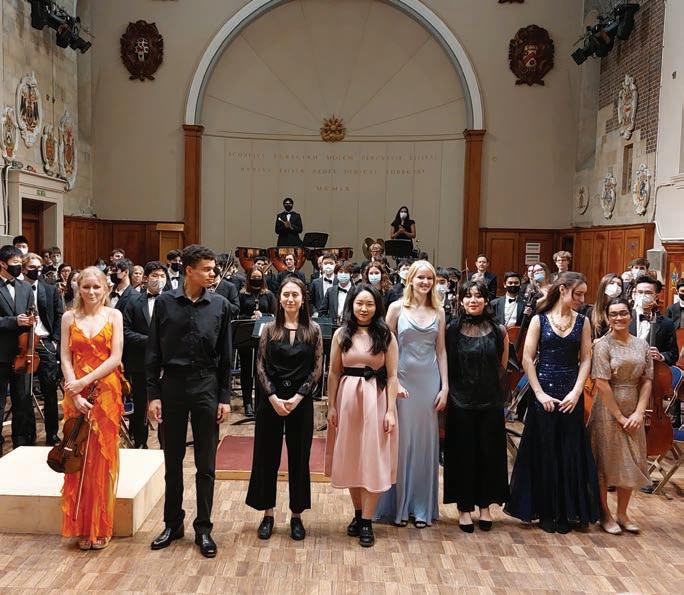


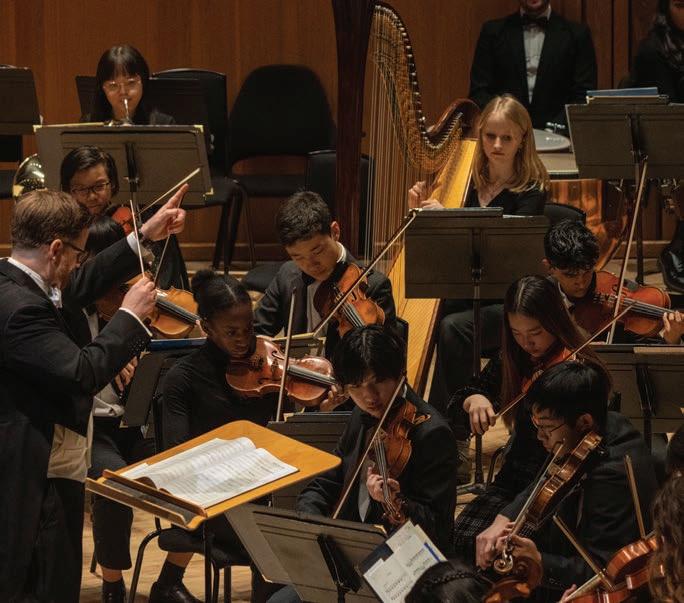
When I began writing this review, I saw two elephants in the room and considered them. The first was writing this for the Elizabethan: how would I challenge my own school’s musical efforts in a magazine designed to promote co-curricular achievements? Secondly, the issue of my hopeless bias appeared: what is more challenging than being asked to critique an ensemble filled with people whom I consider friends? (Playing in the actual concert, silly!)
However, I can gladly report that criticisms are few and themselves inconsequential. The night began with a marvellous rendition of Mendelssohn’s ubiquitous violin concerto, termed by Joseph Joachim as “the heart’s jewel” of German violin concertos. Towa Matsuda (AHH) played with calculation, measure, and exceptional technical control, and yet with allure, spontaneity, and showmanship in equal measure.
Matsuda excellently synthesised those traits that make Mendelssohn such a bastion of that transitional Romantic music, still borrowing from the heights of classicism while forging new paths. The orchestra accompanied well, playing with poise and thorough consideration for Matsuda’s role as soloist, led them with excellent coordination by Toby Purser. Mr Heighway, intended to be conducting that night, was very much missed as he unfortunately came down with Covid. To be heard next year!
Next was Francis Poulenc’s Gloria, a spiritual and yet slightly secular approach to a religious musical setting. It has been said that Poulenc is a composer of contradictions, and this work is no different; something of monk and rascal exists in this piece. The Westminster Choral Society, soprano soloist Aoife Miskelly and Mr Garrard approached those contradictions and
executed this work with a suitable degree of irony; of particular note was a gloriously bouncy Domine deus
Perhaps less ambiguous in nature was John Rutter’s Requiem. The piece was unfamiliar to me, having listened only to the first movement. Based on this limited experience with it, I expected... well, a requiem, and was pleasantly surprised when I heard what felt like a slight musical subversion of one, offering ethereal, modal hope in the face of death. The choir and orchestra were exceptionally cohesive here, and the piece was interspersed with many solos that not only allowed Miskelly to shine, but also numerous members of the orchestra. Of particular note was cello leader Elektra Makris (HH), who played the solo that opened the 2nd movement (Out of the deep) with remarkable control, immaculate phrasing, and substantial depth of tone. Other remarkable players included clarinettist Phoenix Mombru (QS), oboist Serene Liu (PP) and flautist Sebastian Eatwell (QS).
The concert was titled Lux Aeterna (eternal light). Well, the sun had been shining all day, and going into the night, not only did the orchestra present the human radiance in all of these pieces, they also showed the light of our Music Department and the brilliance it continues to expose in able young musicians. I am sure that the school is as proud to count them as pupils as I am to call them my friends.
I am immensely proud of the work produced in Drama this year. One aspect of theatre is to bring people together and so it was wonderful to return to live performance again with four productions in the first six weeks of the Play Term. It was a particular joy to see two productions which had been postponed from the last year revived and restaged.
The Government Inspector opened the season. The talented Remove company brought a cast of quirky, comedic characters to life in this punchy, irreverent adaptation by David Harrower. A week later, Emilia, an all-female co-production with Harris Westminster, was performed in Ashburnham Garden. This play by Morgan Lloyd-Malcolm was inspired by the life of the 17th-century poet and feminist, Emilia Bassano, and her speculated role as William Shakespeare’s Dark Lady. With imaginative costume design and atmospheric lighting, this was a powerful and uplifting piece of theatre, perfectly suited to its outdoor setting.
As these two productions played to packed houses, rehearsals were simultaneously underway for the Sixth Form Festival. This annual event continues to grow in popularity, with over 160 pupils attending the auditions. This year the theme was Great Plays of the 21st Century, giving our students the opportunity to explore a multitude of societal issues, such as gender, climate change and institutional racism. This highly charged and provocative evening of drama was presented in the MFH with a new, enhanced lighting rig, making use of projection and short filmed sequences alongside an array of exceptional live performances, with extracts from Jerusalem, The curious incident of the dog in the night time, People, Places and Things and Constellations among many others.
Another annual highlight is the Fifth Form Elizabethan Festival in October. This year was an intense week of workshops and rehearsals exploring Shakespeare through the lens of gender, culminating in an exciting live performance by the pupils. The Festival closed with a visiting production of an award-winning one-man show, Shylock, exploring how this comic villain in Shakespeare’s day is now seen as a victim of racial discrimination. This poignant and powerful performance was an appropriate ending to the week.
With a cast of 60, including Fifth Form pupils for the first time ever, this year’s musical, Oliver! , was a resounding success, spotlighting the talents of all those who took part. The ever present threat of Covid meant we never had a full company in rehearsal and for the first time, each role had an understudy ready to step in. Not knowing who would be there from day to day was incredibly unsettling, but our company faced these challenges with energy, resilience and good humour. Show week arrived, with the most impressive set seen up School in many years and a superb 26-piece orchestra, and the whole show came together in a triumphant run of performances. The company was exceptional, demonstrating incredible singing and dancing with emotional and nuanced acting. Our masked audience was suitably delighted and rose to their feet to show their appreciation.
Throughout the year a new collaboration was taking place. After many years of planning, the Drama Department joined forces with the Royal Court Theatre to give an extraordinary opportunity to a group of 27 pupils from Westminster and Harris. The project consisted of four emerging playwrights working collaboratively with the pupils to create four new powerful pieces of contemporary drama. This work took place over two terms and culminated in two performances on the main stage at the Royal Court in March. It was a huge success, with plays that were complex, funny and adventurous. The performances were electric and the audience was delighted – another standing ovation!
As I write this, there are still two productions in the pipeline. Firstly, Buckets by Adam Barnard will be performed by the Theatre Options group. Wry, emotive, funny and heartfelt, Buckets is a play with a unique perspective on a universal dilemma: how do you deal with the fact that time always runs out? Secondly, the LSA company will perform a showcase featuring a range of work across a variety of dramatic styles – tragedy, comedy, mime. This double bill will close a truly outstanding year and I would like to take this opportunity to thank every person both onstage and backstage who has been involved in our work this year. We look forward to creating more thought-provoking and exciting work with you all next year.

The Sixth Form Drama Festival marked a return of live performance to the Millicent Fawcett stage. With the performers and crew still labouring under complicated rules, the rehearsals necessarily had an air of the bizarre, but the Festival is always a montage, fabricating coherence from the episodic, so was an appropriate reflection of our together-butsegregated times. Apart from anything else, it was an amazing opportunity to dive straight into Westminster.
The source material, Great Plays of the Twenty-First Century seemed suitable, given the experimental nature of their form and their common preoccupation with existential threat; their combined impact and the effect of the performances, however, was hugely uplifting. The tone was set by a video installation, a monochrome production of a scene from Martin Crimp’s In the Republic of Happiness (2018) in which the characters jettisoned the standard constraints of the play and the actors riffed on the competing freedoms of the individual. The audience was then hurtled through the canon of the last two decades, experiencing in unsettling succession Bartlett, Churchill, Kirkwood, Prebble, Payne, Swale, MacMillan, Bean and ending with
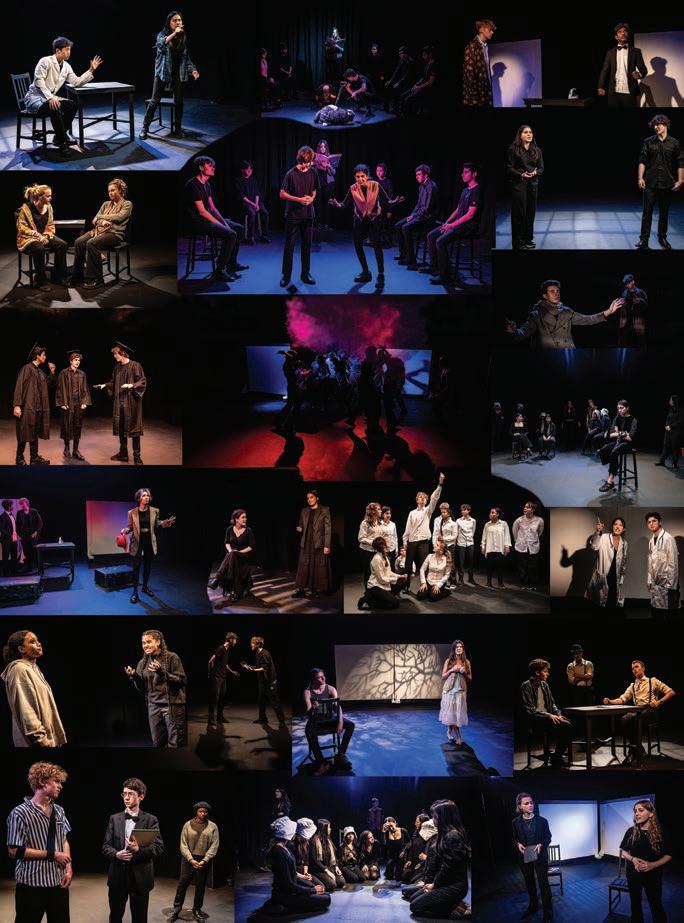
Butterworth. The Festival’s final scene was taken from one of the closing scenes of Jerusalem. Set as the sun rises on the aftermath of the celebration of a subverted bucolic England, it foregrounds the tensions between mythical past and concrete future, the idealised, free-living pastoral and the encroachment of society on half-remembered freedoms; here, it was a fitting encapsulation of all the preceding. The Festival presented comedy, pathos, crisis, subversion, planet-angst, sinister science, and some stand-out performances, with several Sixth Formers from Westminster and Harris
announcing themselves as the Drama Department’s latest reservoir of new talent. As the Professor character says towards the end of Jerusalem’s final scene, “Then it’s really true. The winter is over”.
Restrictions meant there were not one but two curtain calls, one for each half, but applause had been silently stockpiled, and it was clear the crowd were as emotional as the actors to be back. Perhaps there was – almost – a tear in the eye even of Mr Chequer; perhaps he was simply glad it was over for another season. Now Oliver! awaited.
Any participant in the recent production of Oliver! would agree that what occurred on stage was nothing short of a miracle: primarily because, at no point during rehearsals, was there a full cast present.
This is testament to the relentless effort poured in by our ensemble cast, always willing to take on new roles to replace those with Covid whilst bringing so much energy and passion to the stage that the audience was sucked in from the get-go.
There were moments of laughter, shock and sadness on the emotional rollercoaster. Few actors were funnier than Lola Stadlen (DD) in her role as Fagin; her chemistry on stage with the gang of Fifth Formers only added to her unique reimagining of the

character. The incredibly affecting voice of Olivia Hardy (MM) as Nancy left tears on cheeks, especially after her stellar rendition of As long as he needs me. Of course, we cannot forget the star of the show: the angelic voice and winning smile of Lower Shell Alexandre Campant (QS). He stole the audience’s hearts, and his unremitting passion for and devotion to the musical shone through in his poignant performance of Where is love?
That said, it would not be possible for us actors to have had our moment in the spotlight were it not for everyone behind the scenes. Director Peter Chequer exceeded expectations yet again, working tirelessly to produce something captivating under possibly the most exasperating conditions to date.
Ellen Jakubiel and Guy Hopkins both did fantastic jobs on the dance and song aspects of the musical respectively: Ellen’s constructive criticism during rehearsals and Mr Hopkins’s tolerance of our repeated lyrical mistakes acted as the glue that kept the company together.
Paul McLeish, as always, did a superb job of organising the lighting for the production in mere days, and the alarming tones of Vedant Lohia (GG) and Blake Morris (HH) (led by the astoundingly organised Elektra Makris (HH)) from backstage provided the adrenaline needed for the cast to come rushing on.
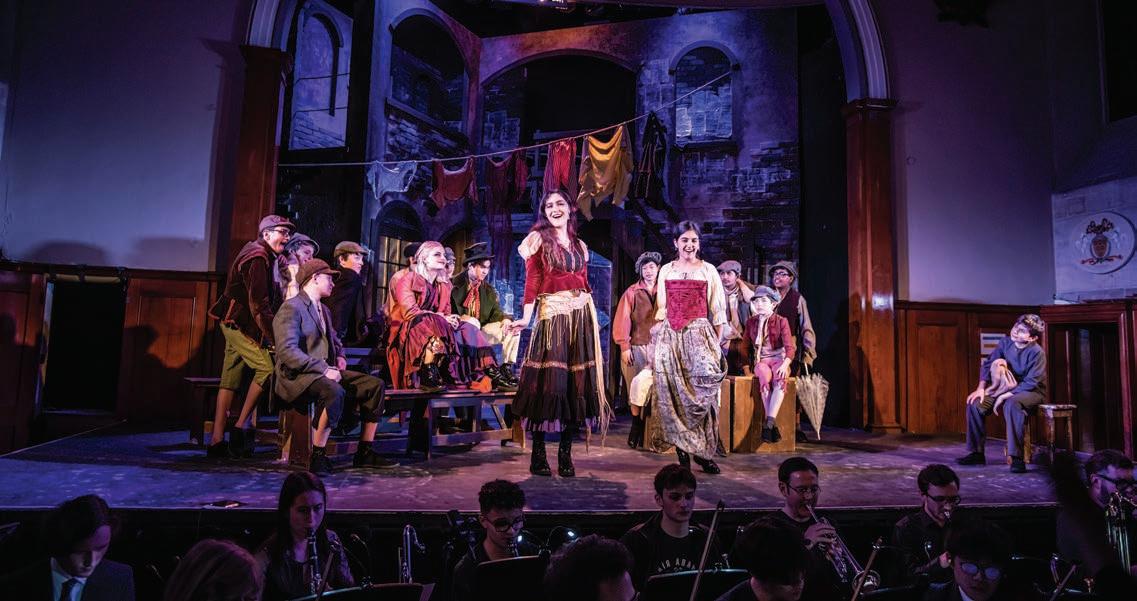
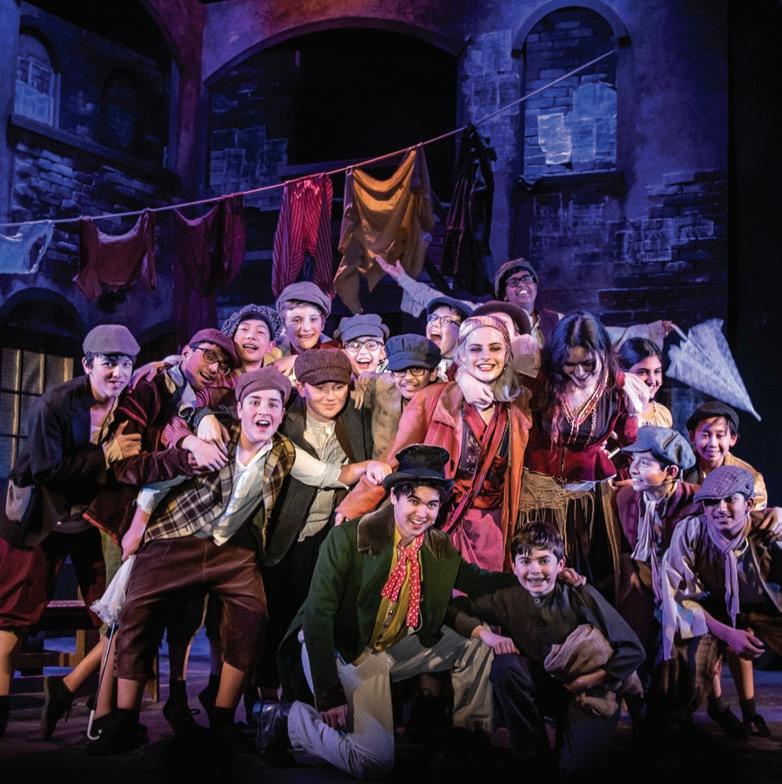
All in all, Oliver! proved to be an unforgettable experience both to work on and watch. I would be lying if I said that tears were not shed on the final night, with many Removes saying their theatrical goodbyes to the school. The strength of community that came from the group and shone through onstage leaves me almost lost for words... bar one: magical.
On the evening of Tuesday 14 September, I had the privilege of a front row seat for the Remove production of Morgan Lloyd Malcolm’s Emilia
The first half followed the childhood of titular Elizabethan poet Emilia, depicted charmingly by Radha Opubor (LL). Opening with a lesson from Natasha Hermer (AHH), Emilia alongside Veronica Corielli (QS)’s Lady Cordelia, Lilian Smith (Harris)’s Lady Katherine and Changyue Liang (MM)’s Lady Helena must learn to navigate the expectations of women at court. Married off to Elina Pau (DD)’s hilariously disinterested Alphonso and romantically entangled with Iris Jopp (Harris)’s fantastically charismatic Shakespeare, the first half ends with a powerfully performed tragedy which changes Emilia completely.
In the second half, Emilia is played by Carlotta Shahenshah (RR), lending the character a great depth, performing her pain with enough restraint that it doesn’t obscure the moments of endearing light and comedy between the supporting cast, who have changed from portraying highborn ladies to washer women. Whilst picking up the pieces after the catastrophes of the first half aided by the washerwomen, Emilia forms a collective of subversive poetry which makes for one of the play’s highlights as Clara Hartley (WW) gives a brilliantly funny reading, which makes her character’s end, wrongly
.
burned as a witch, more powerful. Emilia’s ending, despite the heart-wrenching depiction of the consequences of misogyny, proves hopeful and inspiring. Manon David (Harris), having been a narrator chipping in throughout, emerges as the last Emilia with an essential call to action against institutional sexism, delivered with charm and humanity.
The all-female cast (with exception of house band Purav Menon (QS)) really embodied the progressive message of the show, which drew on historical elements while being fundamentally forward thinking and looking. The soundtrack had something for everyone, including Meghan Thee Stallion’s WAP and getting Mr Chequer singing Burning down the house in the foyer after the show. Side of stage Anjali RamanMiddleton (Harris) did a fantastic job dealing with the many costume, prop and set changes, juggling codpieces, canes, and cage crinoline underskirts. Though forced indoors by bad weather and frustratingly delayed over summer by Covid, the performers didn’t skip a beat and the direction by Rania Jumaily proved remarkably versatile and energetic, worthy of her last show at the school.

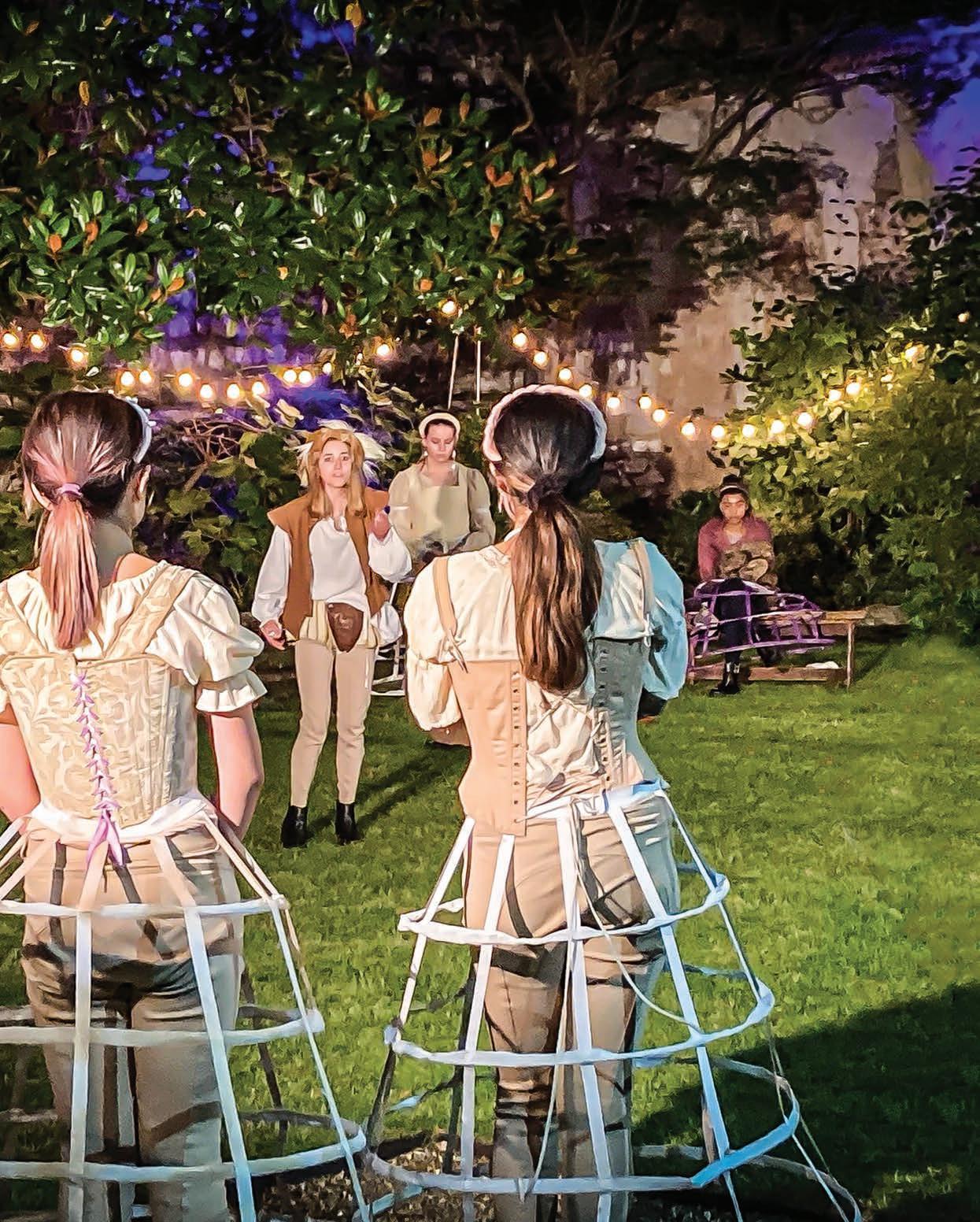
The SW1 Project is all about giving young people a voice.
We had the unique opportunity of working with writers tailoring the scripts to us so that themes of the plays were contemporary, and the parts I got to play deeply resonated with me. The directors challenged us to explore the many facets of our characters. With their help and guidance, I learnt how to develop my character and thus, the final version that I presented on the Royal Court stage differs substantially from how I was reading my role initially. The experience taught me so much about the process of refinement in acting through experimentation to see what works and what doesn’t; for example, we were encouraged to make bold decisions regarding our body language and vocal delivery. As we delved deeper into our roles, we were told to ask ourselves meaningful questions such as “what are the stakes in each scene?” meaning “what does our character have to lose?”, making us go farther into our character’s psyche and helping us better breakdown the dramatic intentions of each scene.
Being split into four different companies meant that everyone was having their own unique experience and yet somehow, it felt as if we were all collaboratively working together. As a group of 27 pupils from both Westminster and Harris Westminster, I had the chance to meet new people, make new friends and tell the audience stories with powerful, current socio-political messages. I loved that the Royal Court gave us the opportunity to watch their performance of Rare earth metal by Al Smith and attend different acting workshops. Show week was so exciting and I would definitely recommend taking part in the SW1 Project to new Sixth Formers.
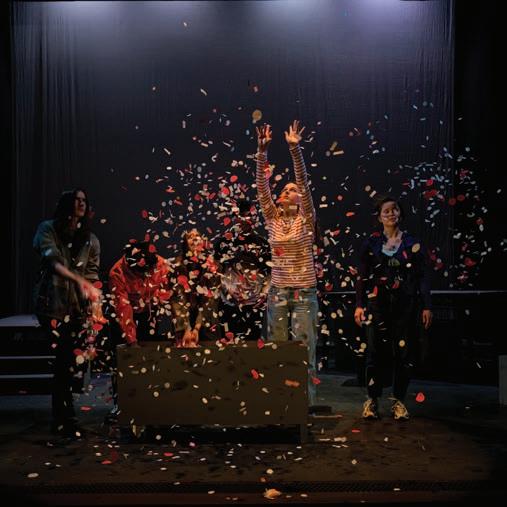


The Government Inspector at the start of this academic year. Despite half the cast developing Covid days before the original opening night, consequent fears that the production may never go ahead, and eventual postponement until after the summer holidays, the show was a triumph.
Clara Hartley (WW), who stepped in last minute, gave a brilliant performance as the wife of the dim Bobchinsky, and the chemistry (or extreme marital conflict) between her and Martin Alfonsin Larsen (RR) was so believable that it was as if they had been rehearsing for months.
From the outset, after the mayor, played by Tai Remus Elliot (GG)’s declaration that an incognito inspector is rumoured to be coming to the
Russian town in which the play is set, it promised to be an evening of laughter. While the show got progressively funnier as the night went on, the themes of inequality, greed and abuse became more firmly entrenched in the play’s reality. Aman Arya (RR), as the man mistakenly taken to be the inspector, fully embraced the character of the eccentric Moscow snob, and gave such an enlivened and playful performance that as an audience member, one could share in his character’s excitement. His drunken recitations of poetry or flirtatious advances would increase in passion and exuberance until they would be countered with the cynical retorts of his servant Osip, played by Joshua Nathan (WW). The absurd dynamic
between the mayor’s wife and daughter, performed by Lola Stadlen (DD) and Maia Davies (MM), constantly bickering with the other over who had the “inspector’s” attention, added to the play’s comedic chaos, and deepened the sense of detachment of the frivolous lives of the mayor’s family from the poverty-stricken town in which they lived. Overall, the high energy, combined with an excellent set and creative use of the theatre studio meant that the audience was hooked throughout. Further, the struggles and quirks of each character were all brought so vividly to life through every actor’s uniquely humorous performance, each providing a distinct glimpse into early 19 th -century rural Russian life.
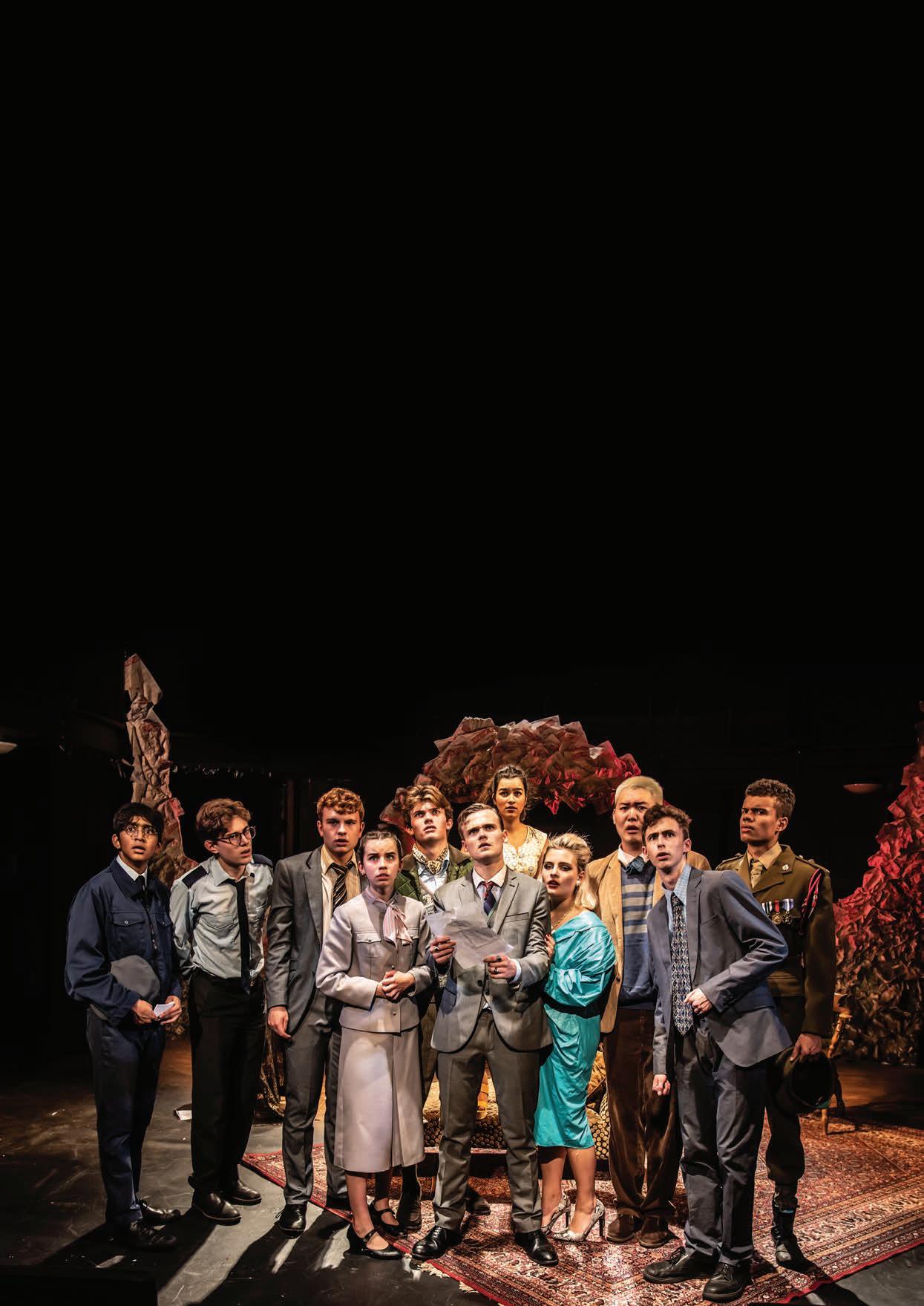

10 June 2022 saw Sutcliff’s once again open its doors to welcome pupils, parents, staff, governors, friends of the school, friends of friends, Mr Lutton’s dog and everyone on Barton Street to the Art Department’s first annual exhibition in three years!
The stairwell and the walls of all five studios were adorned by over 100 artworks ranging from paintings, prints and drawings, to photography and sculpture from our GCSE and A-Level artists.
To finally see artwork up on the studio walls by pupils who have tussled tirelessly with concepts, techniques and imagery for the course of two academic years, is easily the highlight of our year (the last 1095 or so days). The evening was a huge success. The walls were fresh from their new paint job, courtesy of Colin Wagg, our ever-green technician of 33 years, who also gave the floor a new lease of life (matte grey paint being the industry standard). The studios were buzzing, and the pupils, rightly so, stood back and could proudly stand beside their artwork for a selfie. From Hector Elwes (WW)’s cast resin self-portrait, to Nicolas Rackow (PP)’s tightly modulated paintings of fellow Westminsters, notably purchased for the Westminster Collection, is an example of how two artists have explored the age-old subject matter of portraiture in two completely different ways. Hector even sacrificed his fringe and dozens of eye lashes in the making of his piece. The same can be said about the architectonic works of our successful architecture applicants Nyahalo Tucker (AHH) and Luke Grbesa (DD) whose abstract paintings explored light and form in newfound ways.
Head Master Gary Savage strode incisively through the exhibition making notes on an old Crosstown Doughnut receipt he had found in his pocket of the works he was earmarking for his office wall, while Martin Walsh, our bursar, peered over his shoulder to see what was still available. During the past two years, pupils have loaned their work to Housemasters, corridors and communal areas like Surgery for the Westminster community to enjoy. Being
able to refresh these spaces every few years keeps the artistic pulse of the place beating to the tune of British indie band Elbow.
During the past two academic years, the gallery space had been out of commission due to its use as an additional teaching space, but lo and behold it returned in fine form. The gallery welcomed 12 solo exhibitions by Remove pupils and a group show by Sixth Form. From Cece McChesney (HH)’s immersive installation to Max Grossman (WW)’s Oli Bennett prize winning exhibition of sculptures that explored imaginary architecture, the shows were well visited by friends and family and hordes of Fifth Formers during their lessons each week.
Other notable highlights of the year include the ever-growing link between the Great School and Under School Art departments. Nyahalo Tucker and Max Grossman judged the Under School model competition while Theo Naylor Marlow (AHH) judged their yearly Photography exhibition and gave a talk about his own practice as a photographer. We also invited OWW Thomas Kemball and Cyrus Gilmartin back to the studios to talk about their fascinating year studying on foundation, and we look forward to welcoming back Bryony Strickland in September.
Before we knew it, the exhibition came down, and the current Sixth Form moved in, filling the walls with their work, knowing that next year, they’ll be the ones taking selfies.
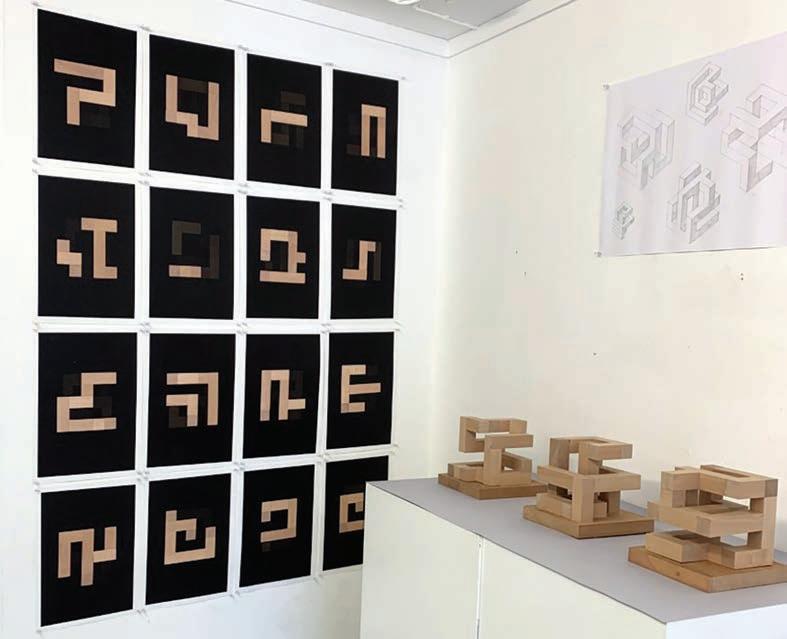


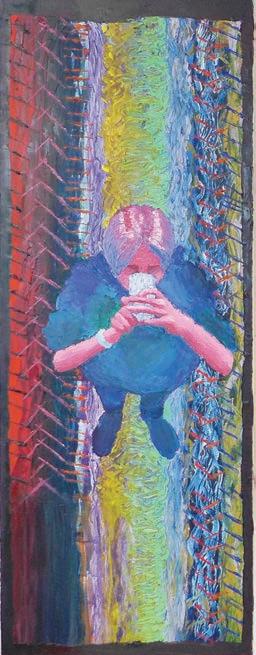



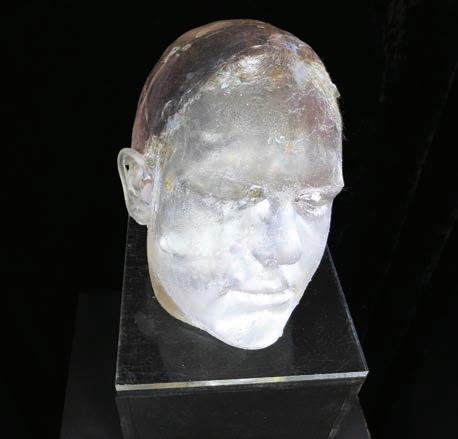
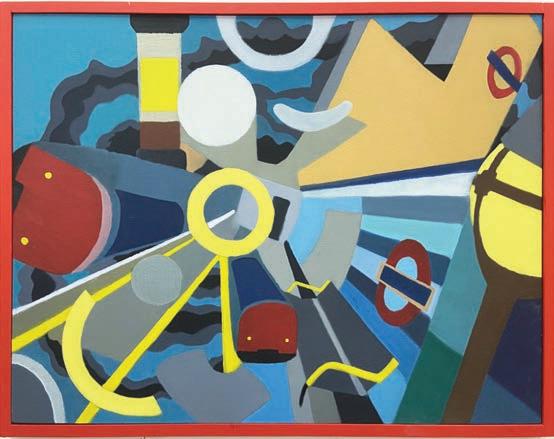
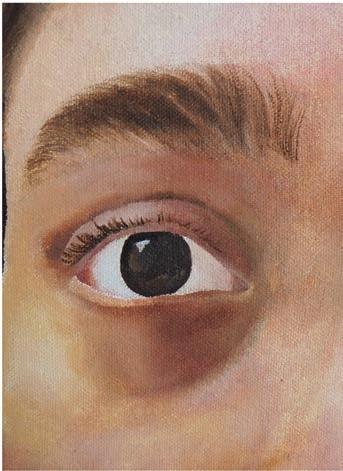







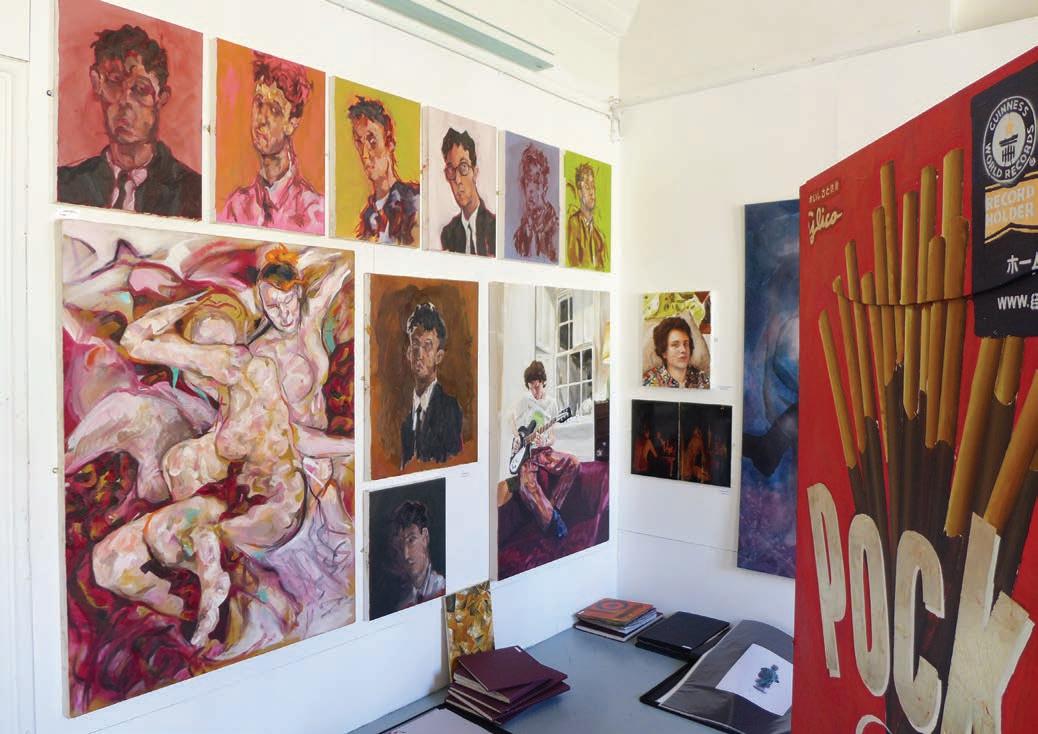



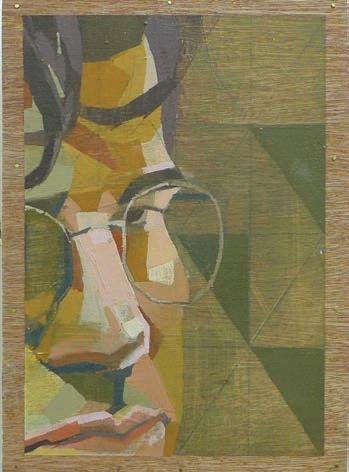



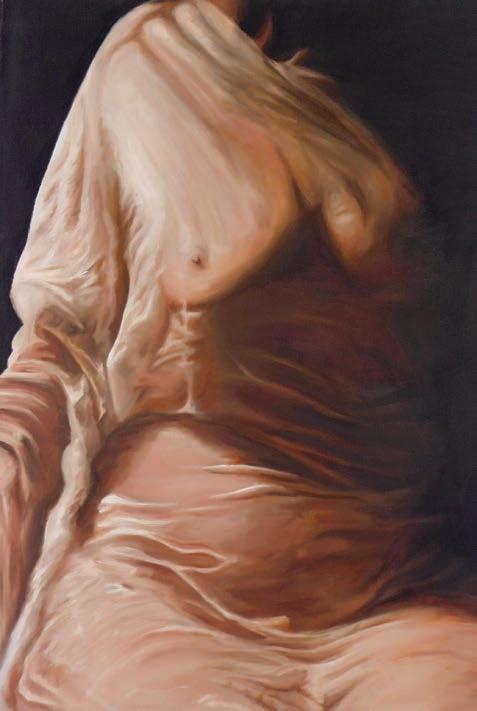
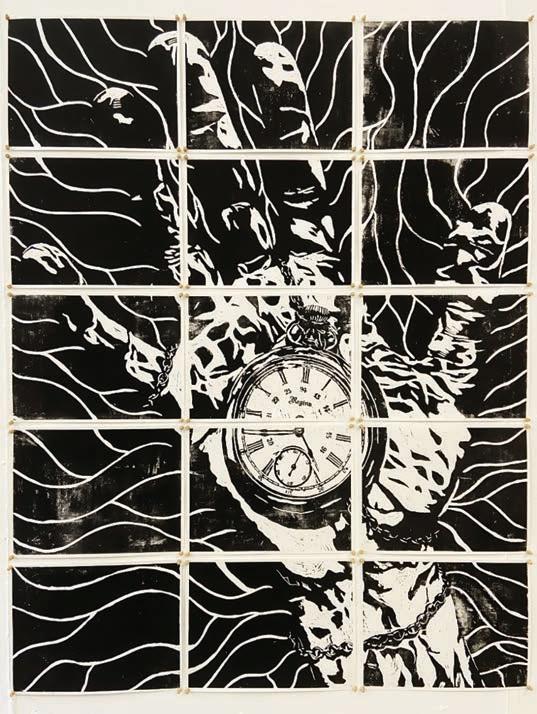
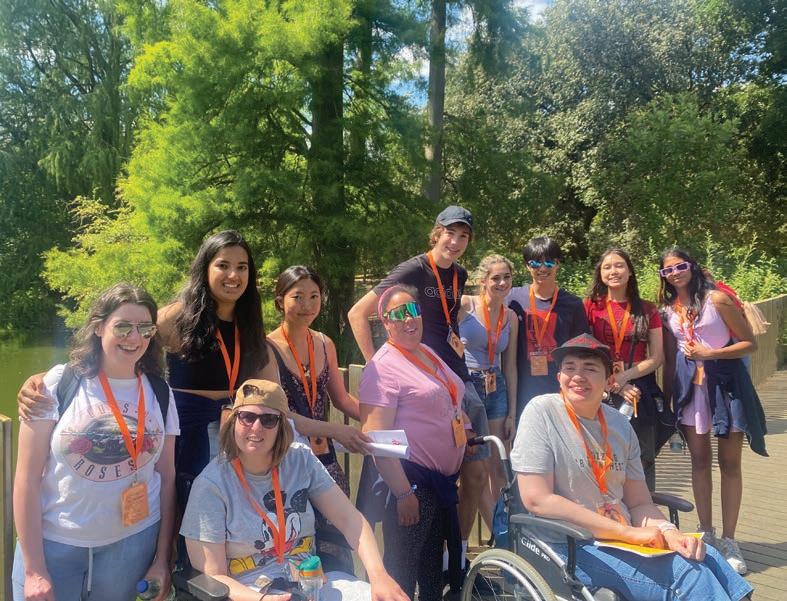
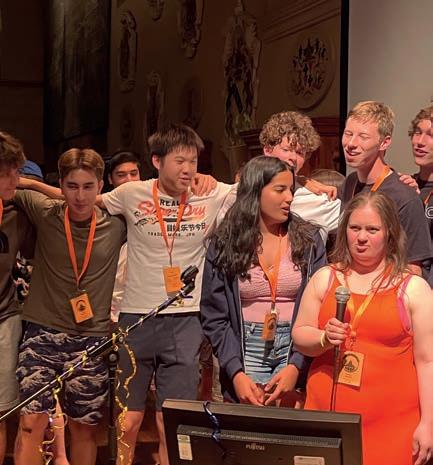



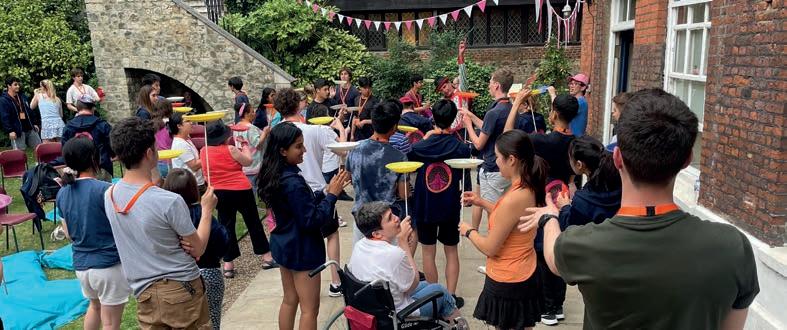



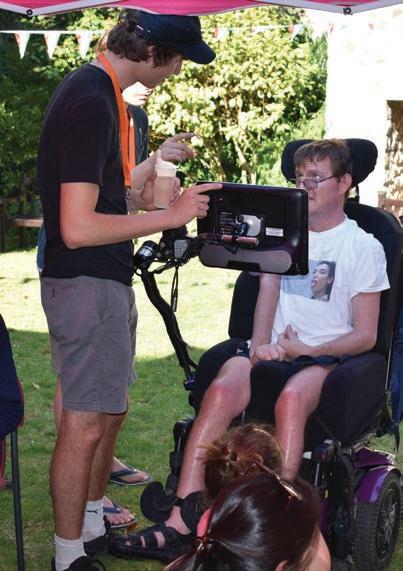 by Esha Patel (DD)
by Esha Patel (DD)
For the 44th year in a row (almost), Phab has been an eye-opening and rewarding experience for many pupils at Westminster. Spending a week with disabled people and enthusiastically participating in activities leads to new friendships and connections between the guests and hosts.
Due to Covid, the last Westminster Phab was in 2019. This meant that this year was truly special for the guests, reuniting friends and, for many, enjoying their first visit to London in some time. Some of the guests have been participating for over 20 years, and were very happy to be back. Guests and hosts were accommodated comfortably in College, Liddell’s, and the Wren’s-Dryden’s corridor. Upon their arrival, after a tiring journey and after settling into their allocated rooms, the guests were keen to begin their first activity: a circus workshop!
For some, the days started well before breakfast, as guests may have needed help dressing, showering and making their way to the dining hall. Participating in Phab has meant we give more thought to simple everyday tasks and the realities of daily life for disabled people. For those in wheelchairs, getting around London, particularly the journey to Kew Gardens, is more difficult, and as hosts, we became more aware of how accessible our surroundings are. Throughout the week, we took part in workshops such as art and drama, as well as outings, shopping trips and visits to the aquarium, which proved to be highly enjoyable. Whilst it was an extremely busy week, there were a few hours each day for the us all to
relax and get ready for the evening events, including a theatre trip and the annual disco!
The highlight for many of the guests was the special visit to Kew Gardens. Taking the bus, tube, and walking, we all made it to Kew and managed to spend the day together. The trip allowed guests and hosts alike to set out and amble through the beautiful gardens. In all the chaos of activities, this trip provided a moment of rest and silence in the busy week. Surrounded by their friends, and the company of the hosts, all the guests felt restful and relaxed. From the frequent smiles on the guests’ faces, we are proud to say that the formal evening meal on the last day was enjoyed by all. Dressed up in fancy clothes, we all headed over to Grant’s Dining Hall to enjoy a fantastic three course meal followed by a disco. Some of the guests danced into the night and others enjoyed a restful evening watching.
With the theme of PhunPhair this year, the Westminster Phab community truly went above and beyond. All the hard work was showcased in a spectacular show at the end of the week for all family and friends to enjoy. It was a great end to the heartwarming and special experience, and as the guests cheered: Bring on next year!
Covid has done more damage to our community than we can imagine: not only people falling sick and feeling constrained by Covid restrictions, but the wider and longer term the secondary effects, too. To see for myself, I volunteered at a local nursery where the children have grown up in such a distressing environment.
In the nursery, I acted as a classroom assistant to help with classroom management and activities. I spotted a sheepish little girl who was oddly quiet and was always at the corners wandering around. I learnt that she has hearing issues and does not speak English well, making it more difficult for her to socialise. Due to Covid, she was stuck in another country and has not been able to start school at the same time as her peers and befriend others. I understand this experience was detrimental to her development, and the other children struggle to communicate with her. I started to speak to her in phrases her peers use and introduce her to the toys the nursery provides. She started to gain confidence and get involved in social activities. I was pleased to see how she enjoys herself at school now and how kind the others are.
Volunteering reminded me of how we should support each other in times of adversity and always stay connected. It is also important to stay empathetic to others when we only know part of the story.
by Clare Jin (PP)In the past two years, our co-curricular lives have been suspended in uncertainty as the country moved in and out of lockdowns and schools followed suit, with community engagement being particularly difficult to continue. Thus, when face-to-face volunteering opportunities returned to Westminster, I did not hesitate to take advantage of them.
Since September, I have been volunteering at a local primary school. I help children to navigate their way through books in Reading Club and coordinate brainstorming sessions for new skits in Drama Club. Despite my energy levels being often unmatched to those of 15 children, I always look forward to this time, because accompanying that chaotic spirit is a refreshing curiosity and a most pure and inspiring mentality to always strive for their best. I learnt that my role as a volunteer is not didactic but instead one that facilitates and encourages perseverance in learning, as it was from not giving away all the answers – especially in the difficult moments – that I saw children emerge with a genuine sense of pride in themselves. In turn, I got to feel just how rewarding volunteering is and have come to truly appreciate the importance of resilience.
Established in 2007, Solidarity Sports is a charity which engages children in sports, using the power of play to help them recover from complex trauma. I started volunteering with Solidarity Sports in October, participating in a wide range of their support projects. The most memorable project was working with Afghan refugees, where children who had lost their homes, family members and friends were struggling to settle in small, compact hotel rooms. Solidarity Sports supported their weekly trips to playgrounds and indoor activity centres so they could run, laugh, sing and eat with other children. Although the language barrier limited communication, the kindness, enthusiasm, and creativity shown by the children and the volunteers formed a powerful bond, expressed through an intense game of tag, an improvised song or even a hug! From October to April, I was able to build trust, friendship, and unforgettable memories with the children, and felt immense satisfaction and joy watching them enjoy a fun and safe environment where they made new friends, learnt life skills, and felt valued. It was an incredible opportunity to see their confidence and self-esteem grow, and to help them experience a more normal childhood, despite challenging circumstances. It was hard saying goodbye, and I will never forget the warm goodbye hug I received from one of the children.
by Clare Jin (PP)In the past few months, I have volunteered with Solidarity Sports during half terms and longer breaks. Despite the shortness of each trip, I have truly felt how rewarding this unique opportunity is – in getting to connect with the children, see them open up throughout the day, and support them in making their experiences with Solidarity Sports memorable. There is nothing more heart-warming than seeing the children be truly happy in the moment and know that your contribution made a difference, however small, in their lives.
by Elena Zheng (HH)I have been volunteering at Solidarity Sports during different school holidays. I was struck by the positivity of these children, despite all the difficulties they have experienced. Such positivity is contagious and I always love going on trips with the children. I truly hope that more and more people become aware of the children in need, and do their best to give them the attention and love that they deserve.
by Yuhong Choi (GG)Before the Afghan refugee program, I was worried that the language barrier between us and the children would be hard to overcome. It was challenging at first, but as I spent more time with the children, the emotional connection was so big that we had no trouble communicating. I had a valuable experience with the children. I have learnt how to make children happy and how such little help from us can become unforgettable memories for them.
The tote bag has a rich history dating back to the early 17th century. The etymology of the term “tote,” which means “to carry,” reflects the tote bag’s simple and elegant nature.
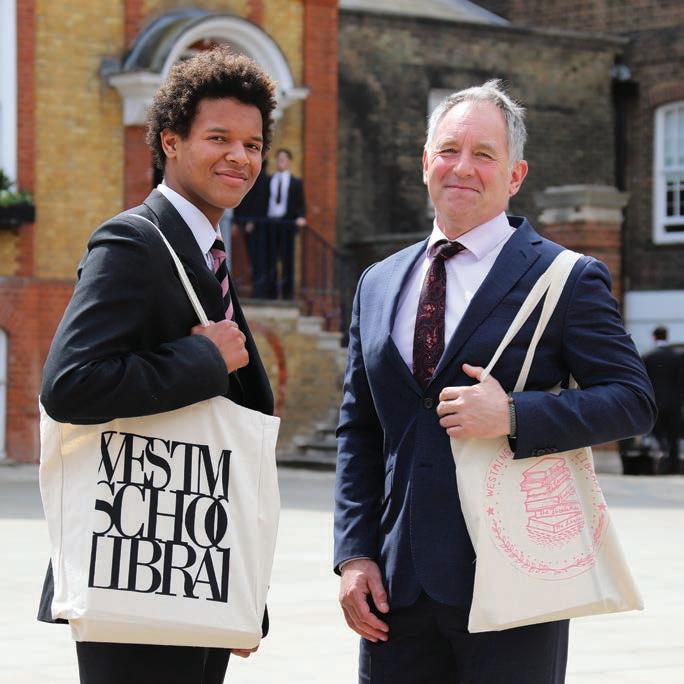
Tote bags have become an indispensable element of our daily lives, influencing numerous fashion trends. The Library set out to create their new bag as a way to honour the Library’s history while also reminding pupils of the beauty that can be discovered in our daily surroundings.
Walking past different rooms in the Library, looking for books on the shelf during leisure time, flicking through the books that are scented with time, images of Westminsters carrying out these actions spring up so naturally in my mind. The charm of the Westminster Library lies in its tranquility and its warmth of knowledge. In order to convey the sense of time and age, I decided to draw my design in the style of a stamp. The stamp symbolises the tradition, time and the depth of our school. I chose to incorporate the school logo design into it by adding the foliage around the border to make it uniquely Westminster. The books in the middle also represent the history and culture of the Westminster community, with the name of each book being magazines published in school every year, including Hooke Magazine, Camden and this very Elizabethan Magazine. By stacking the books together, there is a sense of unity and an accumulation of knowledge and history.
I added additional details to this design after finalising the structures in order to make it more comprehensive. The books’ shadows are etched in curved lines, and they remind me of the serene yet restless sea, so deep and unpredictable, yet so passionate and vibrant, just like our school library, which is full of knowledge and happiness. I also selected Westminster pink for the design.
This design, I believe, not only represents the culture and history of Westminster School Library, but also serves as a much-needed memento for bringing the beauty and grandeur of our past and future to life.
On 24 February 2022, Russia launched a comprehensive invasion of Ukraine. This conflict was not only the largest military offensive in Europe since 1945 but also the first time for some of us to see an invasion being perpetrated in front of our eyes. In response, our school – a community that embraces both national and international pupils – decided that it was time to demonstrate the values we all hold dear, not only by extending compassion to the Ukrainian people but in support of all suffering from this crisis. The school organised several events in raising awareness beyond our borders: Ukraine Aid collection, Bake Sale, and various society talks. Specifically, the Ukraine Bake Sale invited everyone to enter, where the most creative desserts were awarded by four special judges and all funds went to the UNICEF Ukraine Appeal.
Purcell’s entry for the Best Decorated Cake Category was made by a team of various helping hands. We wanted our design to pay tribute to Ukraine and to demonstrate that this invasion was not just a military offense, but also a blatant attack on their culture, conventions, and everything that the Ukrainian people stood for. This sentiment inspired us to decorate a blue frosted vanilla sponge cake with Ukraine’s national flower, sunflowers, and use the Ukrainian flag colours of blue and yellow. By the end of the day of baking, the cake had come together beautifully from this collaborative effort. Special thanks must be given to Ms Joyce, our Housemaster, and Mrs Donkin, our Matron, for helping us gather essential ingredients and equipment, helping the cake-making process throughout and, crucially, making sure our cakes didn’t burn.
The bake-off commenced during lunchtime up School, where the cakes were displayed up on long tables. Eager pupils crowded around the tables as we waited for the panel of cake tasters to arrive: Ms Choraria, Mr Edlin, Mrs Horsfield and Dr Savage. They were to judge the four categories of the bake sale to the best of their ability: Best Vegan Cake, Best Gluten Free Cake, Best Decorative Cake and Most Unusual Flavour. Tensions were high as the judges examined and tasted each cake with their special tasting forks. Eventually, the winners, Emma (WW), Pippa (HH), Kabir (LL) and Lewis (LL), were announced to a great round of applause.
Volunteers then helped to cut and sell cakes to staff and pupils alike, raising a total of £621.60 for the Ukrainian Appeal.
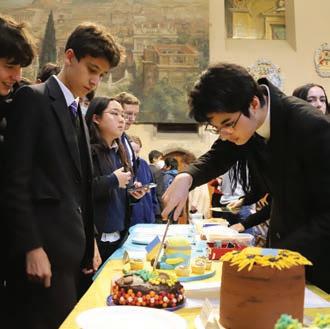

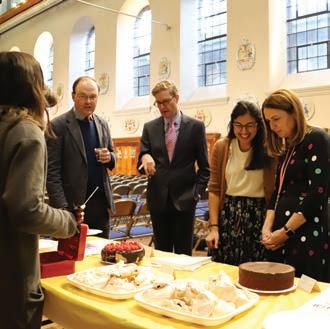
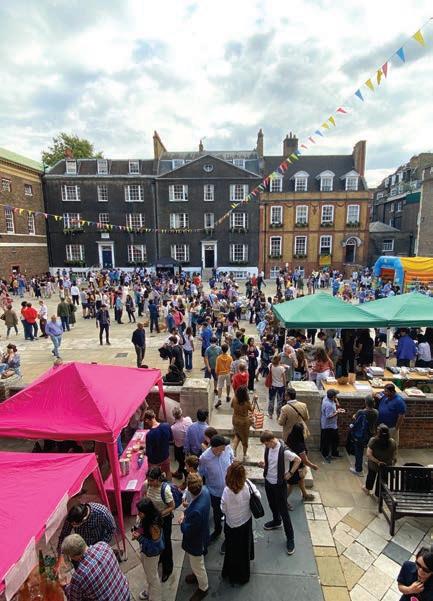


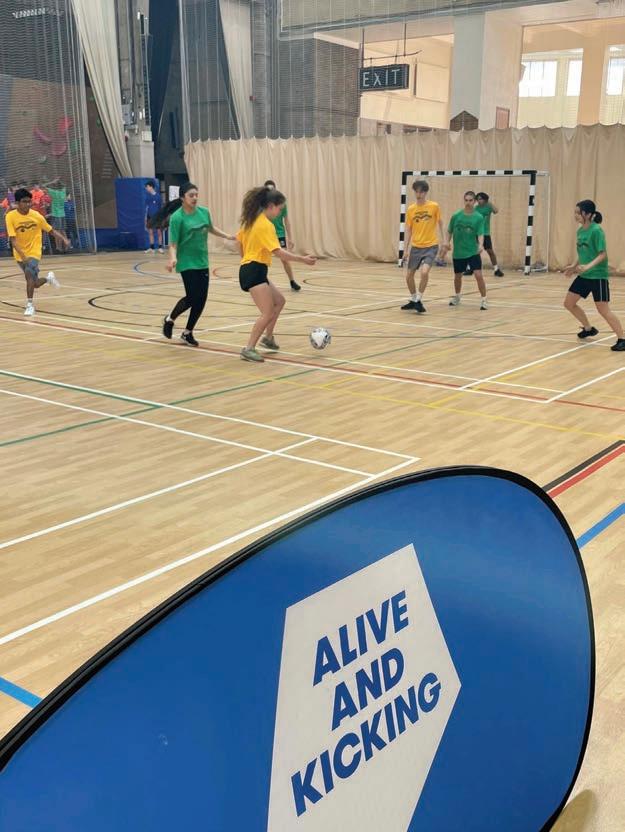
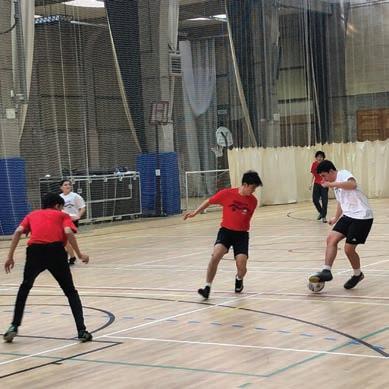


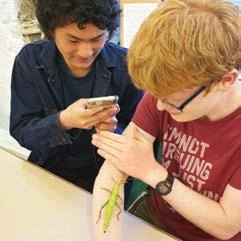
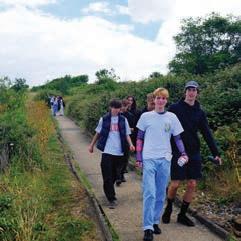
At first glance, the Lyke Wake Walk seems grossly unappealing. After all, it is a 24-hour, 42-mile funeral procession trudge across dark, rainy open moors in North Yorkshire, immediately after a stressful half term.
Why have Westminsters been doing this since 1979? That’s what I was thinking to myself as I sat in the minibus heading up north, ignoring Mr Bailey’s recommendations that we get some sleep before the walk began.
We eventually reached Osmotherly, where we were greeted with a hearty fish and chips, and some kit sorting with Mr Gravell’s guidance. Before long, it was 10.30pm, and Vibram Soul set off. The night was still young, and the seven of us were filled with genuine excitement, armed with beanie hats, headtorches, and a Spotify playlist of 300 certified bangers to help get us through.
The night was rough. Toby Levy (AHH) lost his voice, resorting to sign language, and Maia Davies (MM)’s socks became drenched. A rather unproductive accidental temporary
merging with another group coincided with the coldest, rainiest, and most physically demanding portion of the night, doing nothing for our collective sanities. To top it all off, Nicole Chiu (MM) spotted a ghost at 5.00am. And despite a hearty breakfast in the morning, the deliriousness finally caught up to some of us; from my childish whining about the biting cold to Sunny Choi (BB)’s nonsensical (yet hilarious) sleep-deprived ramblings!
The hours went on and the miles ploughed by, and it seemed to many of us that our almost-paradisal destination was no closer than it had been the night before; due to our slowness and admittedly ineffectual map-reading, our optimism was not aided by Mr Perrins and Ms Stone catching up with us, though they were both cheerful and helpful with the map. Yet I was powered through the walk
thanks to conversations with my group, like intellectual discussions with Towa Matsuda (AHH) on all things musical, or absurd yet brilliant creative-writing games with Clara Hartley (WW) –as well as the promise of hot drinks and meals from the amazing staff at checkpoints every few hours. The singing of tunes continued well into the evening, and while the last few hours were perhaps the hardest for our legs, they were the ones where Vibram Soul truly persevered as a group. Eventually, the end was in sight; to the uninitiated, a random stone in the middle of nowhere, but to us, the summation of nearly 24 hard yet fun hours of mental and physical fortitude. It was all worth it to receive the titles of “Dirger” or “Witch” from the Official Lyke Wake Walk Club afterwards!
It may seem unglamorous – it certainly was, at times – but I can say with absolute certainty that the walk has ended up being one of my most defining Westminster memories; it brought me closer to friends that I love, and to the natural world, and helped me to forge my spirit.

Last summer, I was awarded the Philip Hendy Travel Award for Art History. I used the grant to visit the V&A Dundee and the National Gallery of Scotland in Edinburgh. This opportunity gave me an invaluable experience of independence and a chance to explore Scottish art and culture.
The architecture of the V&A Dundee stands in complete contrast to its London counterpart: formed of stone panels jutting out in a modernist structure over the sea, it is an incredible sight. I visited Night Fever: Designing Club Culture, an exhibition focusing on the design of night clubs and more implicitly, the ways in which a building’s design can enhance its function. The show provided me with insight into the evolution of club culture from the 1960s to the present day, exploring the developments of night clubs from being locations of reactionary or experimental societal subversion to the commercialised clubs of today. The exhibition analysed the interplay of music, architecture, fashion and lighting, and the visitor experience was enhanced by a balanced application of different mediums, such that in certain rooms, through era-specific music and the adoption of strobe lighting against a dark room, a club experience was replicated for the visitor.
The Scottish National Gallery provided an antithetical experience but one that was no less exciting. The gallery has a small permanent collection of an exceptionally high standard, and as a result, one has the chance to visit the entire collection, viewing art chronologically from the Middle Ages to the twentieth century. Alongside works by the Old Masters, the gallery’s focus on Scottish art gave me the opportunity to explore Scottish realism, and in particular the works by The Glasgow Boys, which depict rural Scottish life in the late 19th century. It was fascinating to compare this relatively unexplored period of Scottish art with similar realist movements developing in Europe elsewhere at the time.
While in Edinburgh, I was able to see several shows at the Fringe and experience the city at its most vibrant, at the height of Scottish summer. The trip on the whole was both highly exciting and also gave me a chance to gauge an understanding of the blurring boundaries between art, architecture, music and performance.
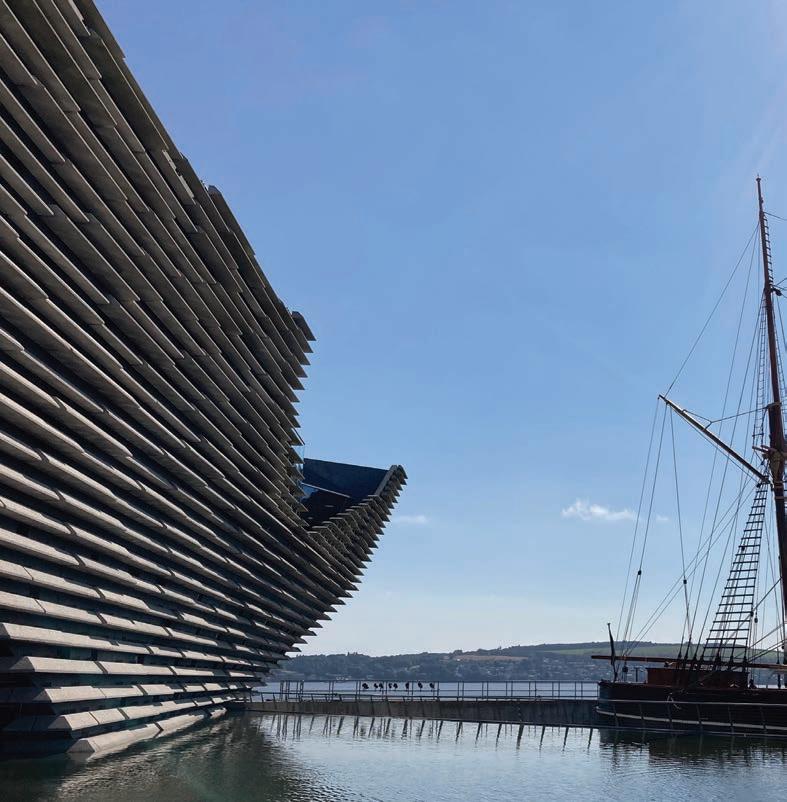


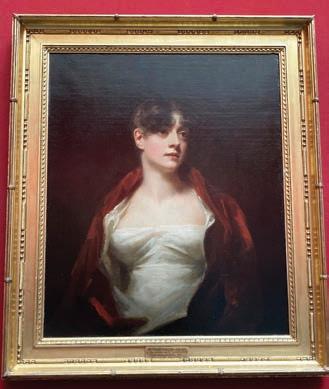
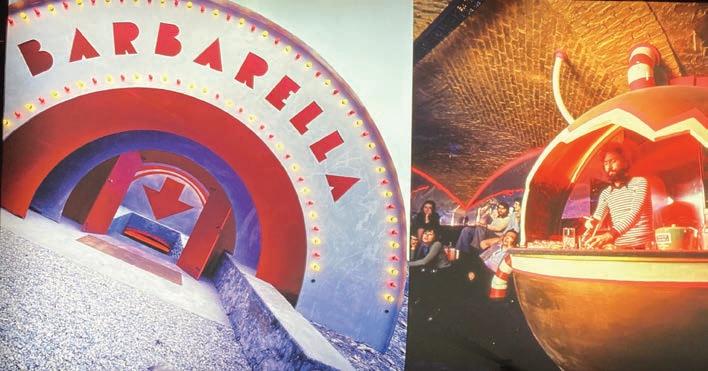
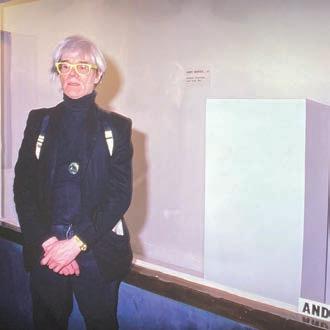

Last summer, I was lucky enough to travel to Edinburgh, Liverpool and Manchester, thanks to the Philip Hendy Travel Award. Over the course of my trip, I aimed to explore contemporary depictions of women in art collections that I had previously had no chance to experience.
After a long train ride to Edinburgh, I explored the National Galleries of Scotland, finding myself particularly drawn to a portrait of Margeritta MacDonald by Sir Henry Raeburn. Raeburn makes use of a rich crimson in the eyes of MacDonald, reflecting the intensely coloured shawl she wears. Painted in around 1814, what caught my attention was the slightly androgenous way Raeburn painted MacDonald, using the shawl to create an illusion of wider shoulders, and deliberately blurring lines throughout the portrait.
Taking another train from Edinburgh to Liverpool, I drew a connection between Hepworth’s hospital drawings, which I saw at the Walker Gallery, and Ken Currie’s Unknown Man, which I saw previously in Edinburgh’s National Portrait gallery. I realised that Hepworth’s drawings had influenced Currie’s portraiture. Although the subject matter of the two portraits in the national galleries are drastically different, the use of softened, blurred lines and forms in both pieces echo each other beautifully and, to me, explored themes of a softened sense of femininity, obscuring the female figures, denying the traditional sense of femininity that dominates traditional portraiture of women.
Next I saw Six Acts, a film installation by Sonia Boyce, at the Manchester Art Gallery. Six recordings of six different performance pieces played simultaneously on screens next to each other. The installation explores how the politics of gender, race and sexuality in the gallery’s 18th and 19th century displays can be reconsidered for today. I was totally captivated by this installation, spending an hour watching the films play on repeat. I found this piece incredible, simultaneously exploring and attacking the typical roles of women in 18th and 19th century art, whilst subverting the original pieces. The combination of performance art with the Victorian art was highly emotive, and I would not have been able to experience this without the Philip Hendy award. This installation went on to inspire me to research performance art, leading to my personal investigation which explored the use of time and consciousness in performance art.
I am incredibly thankful for the support of the Philip Hendy award, allowing me to continue to cultivate my passion for learning about the representation of women in art, and teaching me first-hand about how this has developed throughout British and Scottish art, an experience which I will certainly never forget as I continue my History of Art and Art studies in the USA at university level.

I was fortunate enough to win funding from the Philip Hendy Grant as part of my History of Art studies.
I had hoped to discover the Northern and Midlands concert venues within which the bands I love cut their teeth and whilst my visits were by no means conclusive, I saw a lot of music and developed a penchant for Acid House. I went to Edinburgh, Liverpool, Manchester, Leeds, then Hull. Visiting the site of the Haçienda in Manchester and having my photo taken outside (by my travel buddy Cece) the birthplace of Acid House amongst other wonderful and mostly forgotten things, and the building which I chose to study for my History of Art Personal Investigation was really quite wonderful. In the daytime I visited many art galleries, a particular highlight being Hull’s Ferens Art Gallery, which had a great trail re-queering the narratives around some of their artworks. Learning about the “Dead Bod” wall painting was quite something too. Having shakshuka in Leeds’s Hyde Park Book Club and seeing the Henry Moore Institute was a nice way to settle down the pace after a week of high-paced travel whilst staying with distant friends-of-friends-of-friends in student digs. Pancakes in a Liverpool hippy café with décor suitable for a 1972 George Harrison was quite something but didn’t beat bumping into Purav Menon (QS), Nikhil Singh (DD) and Tai Remus-Elliot (GG) on the street where the Beatles earned their chops. This didn’t top the Beatles Magical Mystery Tour which was a cultural education far beyond that of any of Scotland’s many National Galleries. Having experienced an alternate look upon the way we experience culture in museum spaces (and which records people have up North!) was a real privilege and I am extremely grateful for the opportunity to travel independently and have burst my London bubble.

Here at Westminster, there are some trips where every moment is perfectly planned from start to finish, where everything goes smoothly. There are others, however, where your luck runs out, and the world decides it would rather send some difficulties your way. Overcoming those hardships is uniquely fulfilling—knowing that you’ve gone off the beaten track, into the world of the unforeseen.
At the beginning of a cold and wet Christmas holidays, a group of Sixth Formers chose, for some inscrutable reason, to travel to the even colder and wetter Lake District, for a walking trip. We made our way, along with the endlessly talented Messrs. Ullathorne and Gravell, to Euston where we met up with the Harris group, and where the news came in that our train was cancelled, and the next one, and the one after that delayed! We breathed a sigh of relief when the Boarding Now sign at last lit up, but this one terminated early, at Preston, Lancashire; a city that some hadn’t even heard of, let alone put on the itinerary. Our final train was so crowded that, for many, there was no space to sit down—many of us enjoyed the last leg of our journey standing. At last, we reached Grasmere, and our accommodation: the YHA hostel! The staff were warm, friendly, and inviting, despite our 10.00pm arrival, and we got settled quickly.
The next day, we hit the ground running with an exciting climb. Helvellyn, the third-highest mountain in England, was our target. After an enjoyable breakfast we made our way to the foot of Helvellyn and began our ascent. As we travelled higher, the conditions got worse and worse, until soon we were walking in almost blizzard-like weather as we proceeded ever closer to the peak. We sheltered behind an old, decrepit wall and ate a quick packed lunch before making the final clamber to the summit. Success!
Exhausted, we started descending. As we would later discover, we at some point diverged from the main path, and our downwards journey suddenly became far more difficult; struggling not to slide off, we made our way down a far steeper track until the ice receded and we were in the woods. Even so, the footpath was beset with trials and tribulations. We were stopped by a fence and a sign
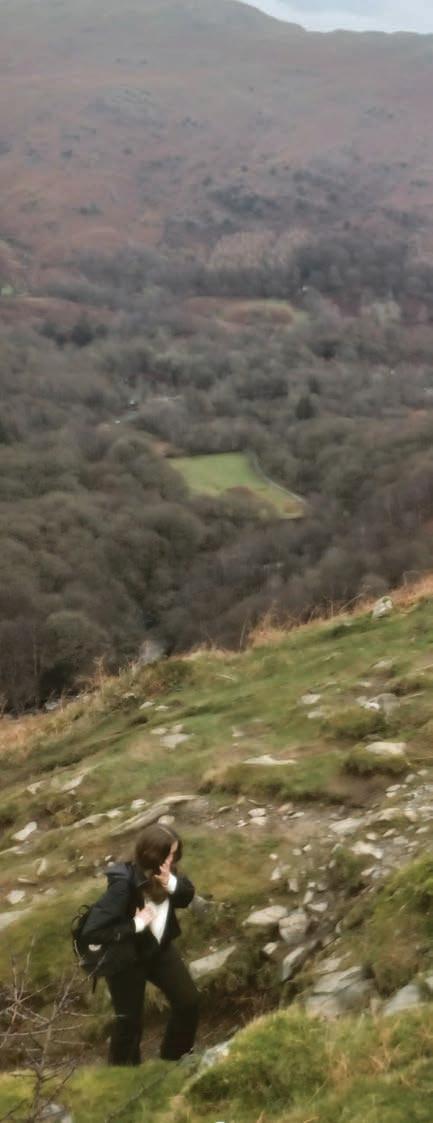
that read “No Right of Way! Private Property”. For legal reasons, I will let the reader’s imagination decide whether we went through.
Now squelching through mud, the track we were on abruptly ended on one side of a river, with no bridge to the other bank. After assessing the situation, we realised that we had to scramble across using a metal climbing-frame that swayed in the currents. Like monkeys, we shinnied across one by one. Eventually, after all that excitement, only a quick walk separated us from the youth
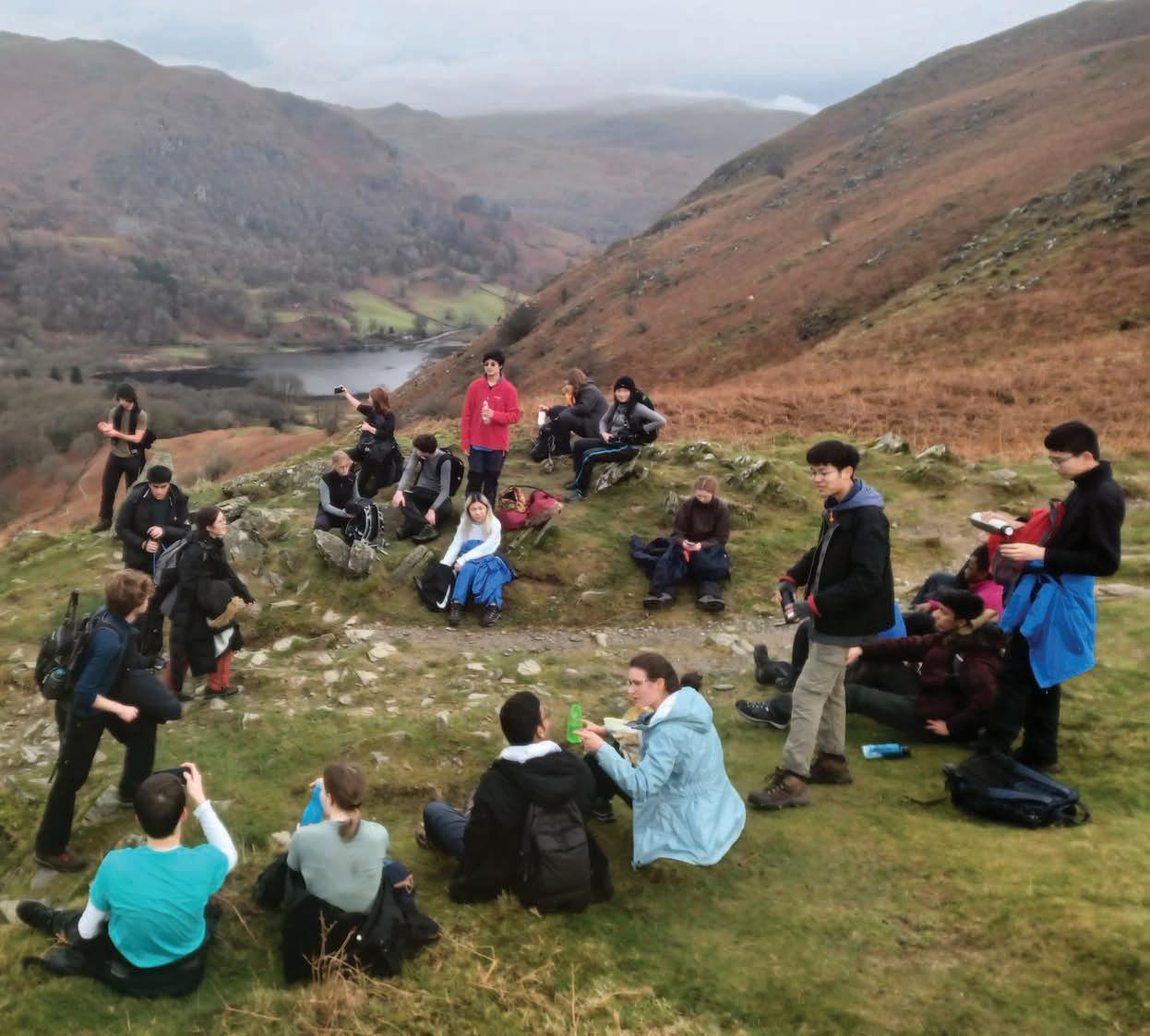
hostel – on a road, of course, with no pavement...
On the Monday, we went for an untaxing walk around Grasmere. We also visited Ambleside, a picturesque town with delightful local shops. We returned via the Coffin Route, so named because in the mediaeval period it was used to carry the dead from Ambleside to Grasmere for burial. I can thankfully assure you that we encountered no corpses (dead, undead, or otherwise) on the route. We returned to the youth hostel for Cards Against Humanity, which I must
stress we did not actually play, since some of us had not yet turned the requisite minimum age of 17... On the Tuesday, we went for a second lakeside walk, visiting the beautiful Rydal Hall, with its ornate Italianate gardens and 17 th -century architecture. We also stopped at the celebrated Grasmere Gingerbread Shop, and paid our respects at the grave of the great Romantic poet William Wordsworth, who is buried at the churchyard of St Oswalds.
At last, it was time to return home –we made our way back to the station
and miraculously, the train was present, on time, and lasted us the whole journey! The Sixth Form Walking Trip has been a well-regarded stalwart of the Westminster almanack for many a year, and the 2021 trip was no different. It certainly had its “fun” (read: dubious) moments, but our shared struggles brought us closer as a group, and I have now become good friends with many of the Harris pupils. To summarise, I thoroughly enjoyed the expedition and would heartily recommend it to any future Sixth Formers!
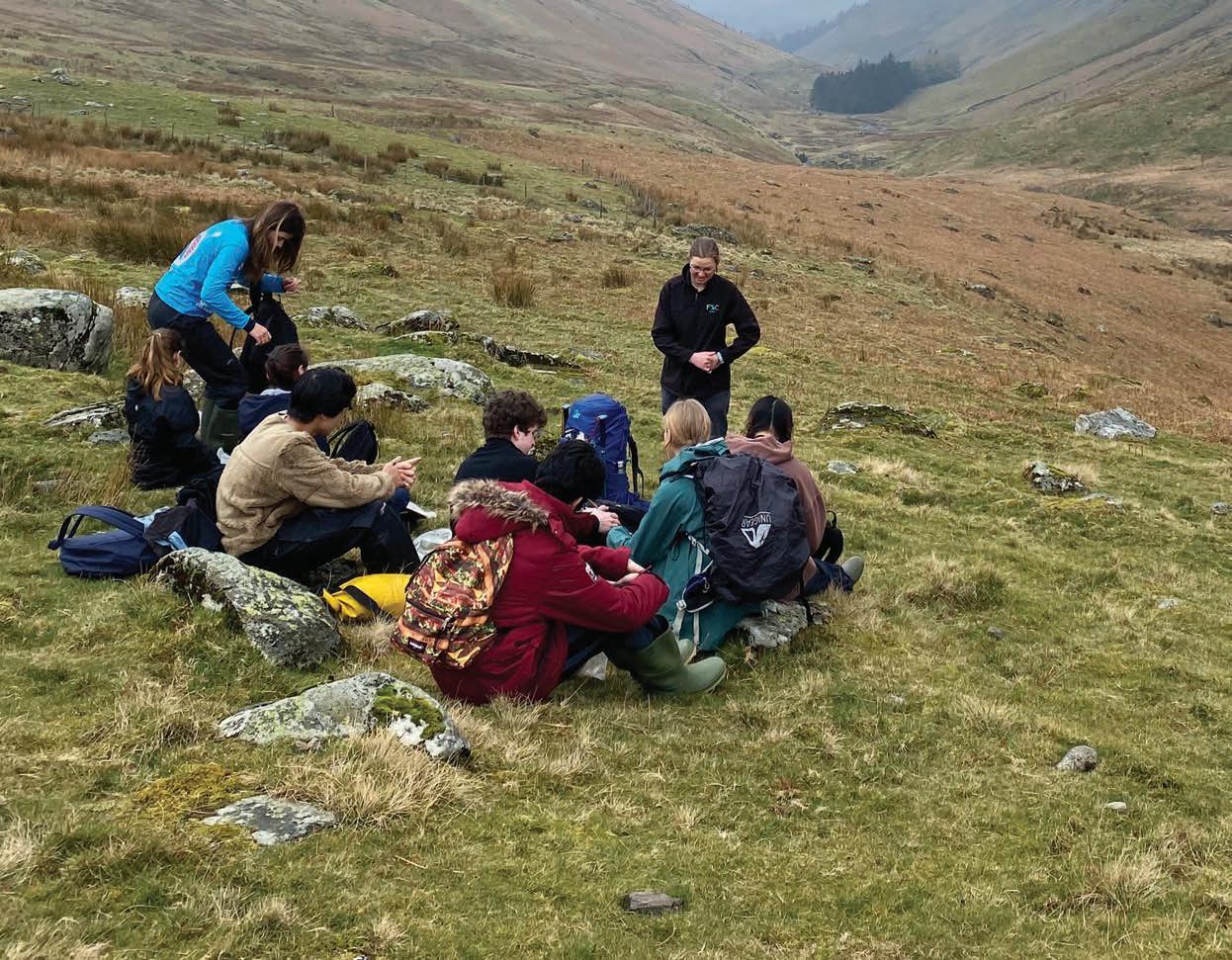
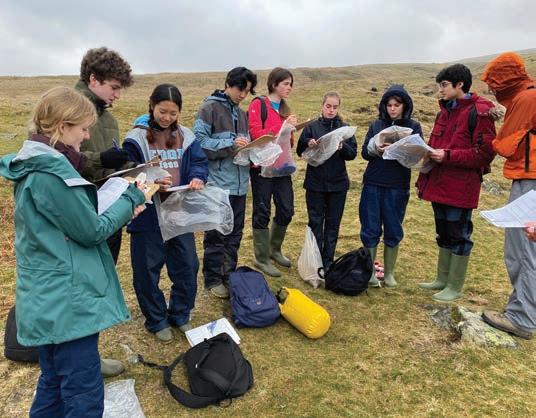

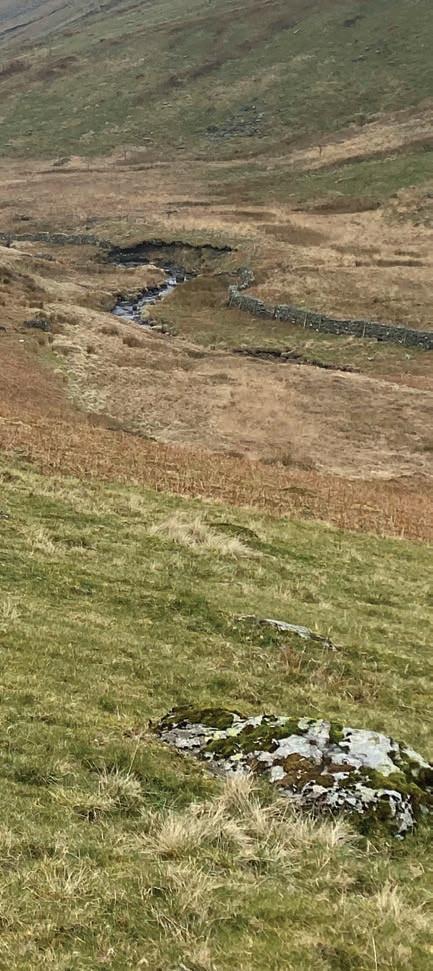
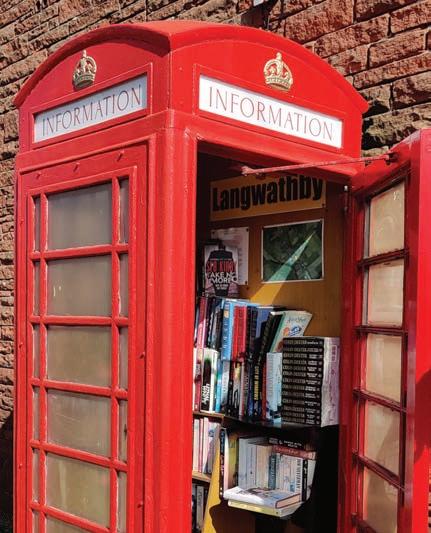
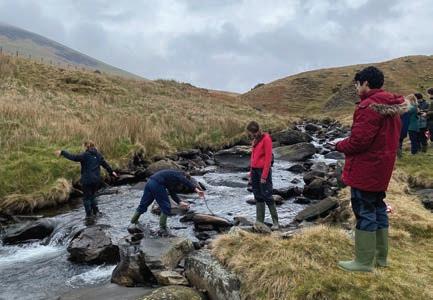
Early on a March morning, the eight Sixth Form geographers arrived at King’s Cross, ready to take on the revered and eagerly anticipated Nenthead trip. After a few hours of travel we arrived in Darlington and continued to our first adventure, Durham.
Armed with our data collection booklets, our aims for the day involved assessing the dominant land use type and completing various other surveys of six vastly different areas across Durham. Whilst the city may not exactly be a metropolis, each of its areas is greatly different. Within a matter of steps, you go from cul-desacs to student housing, past artisan coffee shops and vegan cafes, into gated communities while crossing green spaces; all with the ancient churches and castles in sight, somewhat unnervingly observing people relaxing in their gardens before a ten-minute walk to the bustling Market Square, another short stroll away from the forested banks of the River Wear. The day was complimented by blue skies and blazing 20-degree sun – breaking the stereotype of northern weather that we prepared for (definitely bumping up the perception scores).
We ended the day at one of Durham’s award-winning pasta restaurants where we carb-loaded after our warmup of 18,000 steps (light work for a geographer!) thinking ahead to the exciting prospect of Ms Hughes’s nine-person three-day Morrisons order awaiting us in Nenthead. – Anna
After a calm night we woke up refreshed, ready to tour the quaint Eden villages of the North Pennines. The drive gave us a chance to view the varied landscapes of the Pennines, luscious verdant landscapes immediately followed by far rockier ones. The first two villages we visited were very similar, with vibrant communities. We spoke to a very sweet elderly woman, who runs the Langwathby church, about the village’s heart-warming efforts to reduce loneliness among the elderly. Melmerby has a converted bus shelter full of books and over-pinned bulletin board offering everything from yoga mornings to alpaca-feeding nights. The sun was beaming again, and spirits were high.
Our fieldwork concluded with a visit to Garrigill, the smallest and most isolated of the villages we visited, which suffers from rural decline. The few services the village did have to offer were closed, but for the village church. We entered and were delighted to find rows of books stacked in the pews (another book collection service). After admiring the gorgeous stained glass window, we wrote the Lord’s prayer in Latin in true Latin Prayers style, leaving a little bit of Westminster in the Eden District.
We spent the evening completing the first of two dreaded past papers before helping (or in reality failing) to cook our Thai green curry. We enjoyed a relaxing dinner together, played board games and watched a film before finally getting to bed after an exciting but exhausting day. – Thea
The archetypal activity of a Geography field trip of standing knee deep in a river in the pouring rain, probably wearing a bright yellow mac, was something we were all confident we’d live out despite the first two days’ sun, as the clouds were heavy over the Lake District, our next destination. Surprisingly, though, the fieldwork we carried out was broadly dry and enjoyable, but after hours of measuring rivers out in the hills we were all properly knackered. Not that that stopped us from being forced into sitting another full-length past paper, which a diet of my personallyrequested crunch creams just about carried us through. No let-up as we continued straight away to Keswick, with its flood defences and fish and chips, before the hour-and-a-half-drive back to Nenthead left us with a late night...
...followed by a self-inflicted early morning. In our post-exam delirium, someone suggested that we go for a walk to see the sunrise the next morning and we’d gone along with it, so a surprisingly large group headed out at the crack of dawn (genuinely waking up at 5.30am of our own accord) to see the bleakly beautiful hills of the Pennines before leaving for good. Refreshed and delighted with our decision, but for almost being mown over by Mr Wurr motoring downhill on one of his famous runs, we ate breakfast and headed back to London. A perhaps overly-thoughtfully written card was given to the brilliant Ms Hughes and Mr Wurr as we said goodbye. A trip which had given us knowledge of rural decline, riffles and pools and a detailed rundown of life at Durham University had come to an end, a trip we wished we were still on even as we got a solid nine hours sleep for the first time in a while the next night. – Joe
Raring to go for the hottest field trip of the year, the Sixth Form Geography class arrived promptly for an absolute corker of a day investigating the developing character of King’s Cross.
After meeting our tour guide Josh, a slightly eccentric but energetic guy, we took a short walk over to Granary Square and sat down for a crash-course history lesson. This really put into perspective how impressive King’s Cross’ change has been, going from a village known as Battle Bridge in the early 1700s, to a red-light district in the 1990s, and then finally into how we know it today. We did a preliminary perception survey, putting our initial thoughts and feelings about the area into a ranking system with a total score of 42. We of course discussed the hazards of the day too, as falling into a canal happens more often than you might think!
We took a small detour to introduce the idea of land use maps and service tallies, then split teams off for our first real piece of fieldwork for the day: pedestrian observations. This was fairly simple: we made three observations about ten people that walked past us, with observations ranging from the number of valuables on display to group size. Stratified sampling strategies seemed to keep cropping up, through picking locations where there was an abundance of people, or just the way in which
we chose people. Despite many assumptions being made during the observations, such as regretfully the pedestrian’s age, this piece of fieldwork was a nice way to ease us into a long day of walking.
Following a short walk back to Granary Square, we decided that it was lunchtime. Despite only being early in the day, we felt this to be a muchdeserved break, deliberating where to eat, and finding a lovely patch of grass to enjoy lunch and take in the huge Google office space towering above us.
The next task on the list was a piece of fieldwork called Vox Populi, meaning voice of the people, using two questions to interview people. My group decided to use the question already given to us, and “What signs of regeneration have you noticed, if any?”. Rejection was rife, but we switched to tactically only approaching people who seemed open to an interview, and this really paid off. After a short while, we had a sheet full of opinions and were ready to recap with the rest of the team.
After this, we walked over to the canal, and under some of the arches there were signs with information
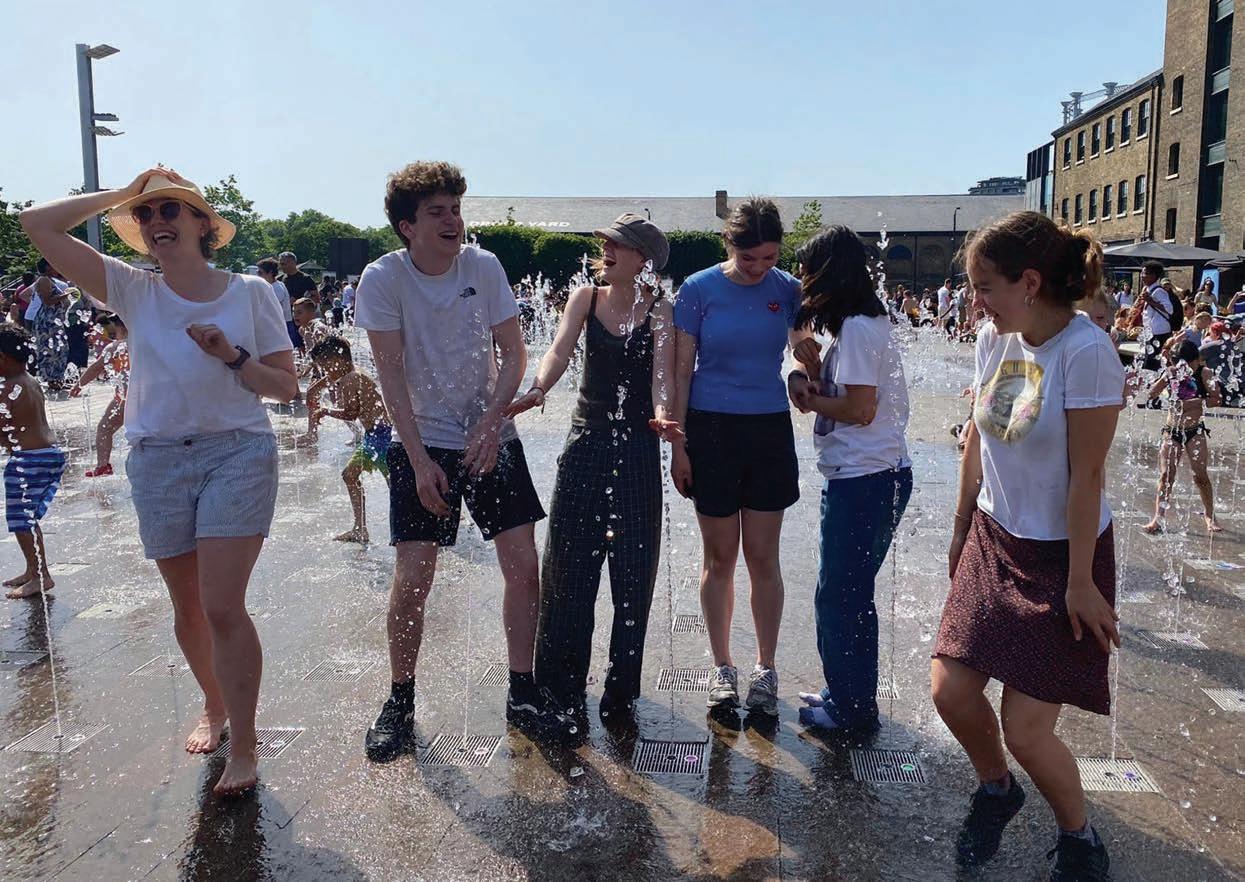
including that Queen Boudica fought the Roman Empire there in AD 60/61. We then walked down the canal and through King’s Cross, towards Islington, gawking at the inordinate prices of the apartments inside the old gas factories. We continued out into an area of council housing and a high street where we noted the disparity between the two areas.
Due to not having used all fieldwork methods throughout the day, we decided that we should all experiment with ones not yet used, so we ended our fieldwork by doing our own method of data collection, and measuring slightly wacky things such as noise and smell. The day really felt finished though, when Miss Blakemore treated us all to a much needed and appreciated ice cream.
Overall, the King’s Cross trip was a really nice excuse to get out of the classroom after exams, and a lovely experience for any geographer, especially on one of the hottest days of the year! Thank you Miss Blakemore and Ms Hughes!



Ever since man first quenched his thirst in its waters, he has left his mark on the riverbed.
Ivor Noel Hume, Treasure in the Thames (1956)
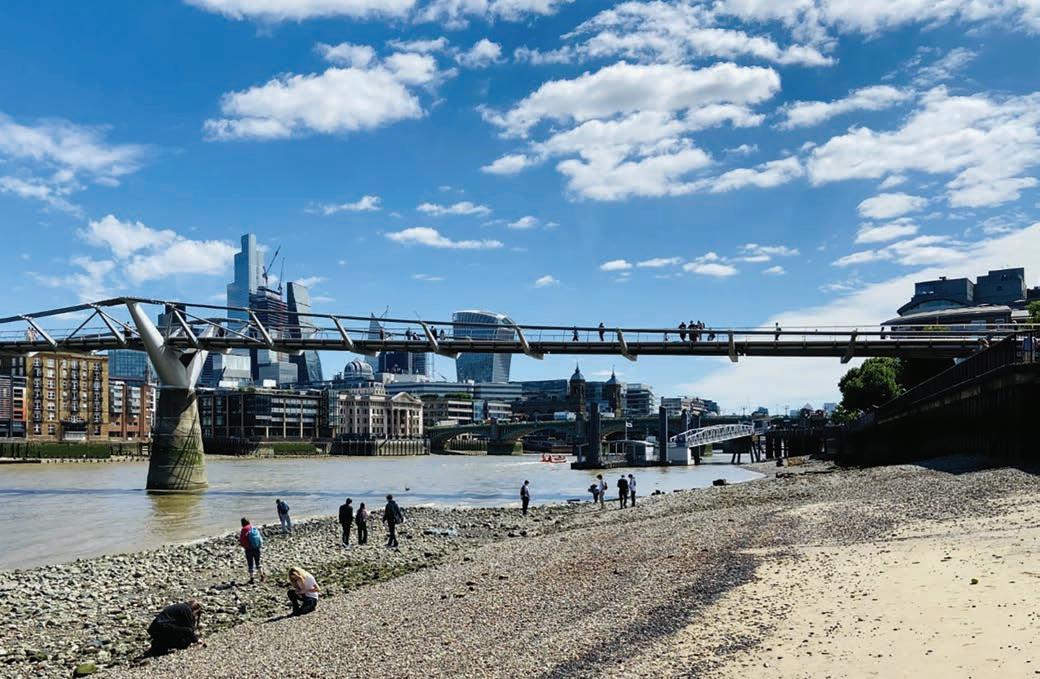
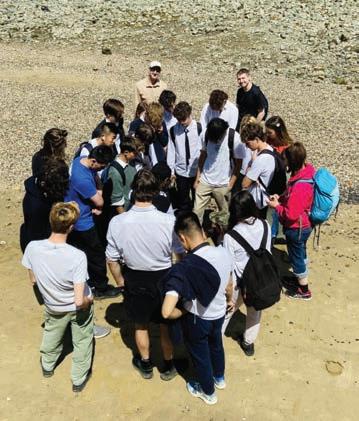

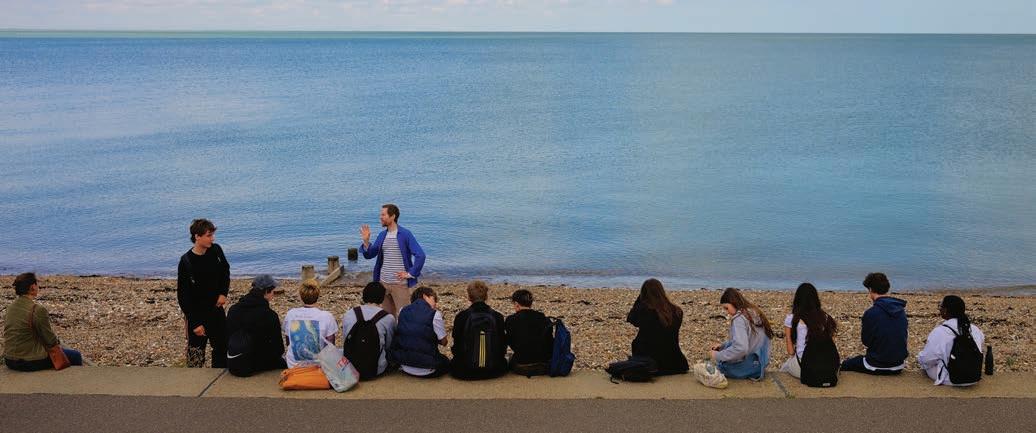
The original Victorian mudlarks were mostly boys who trudged through the mud at low tide to find items such as coal, iron, copper nails and ropes, which they could then resell in order to buy food and essentials for their families. They were considered among the lowliest members of society in London, whereas today’s mudlarkers, amateur historians as they are endearingly known, scour the Thames foreshore on a daily basis to find clues of the past, discovering artefacts that tangibly connect us to our ancestors. Each object – trading tokens, coins, leather shoes, jewellery – whether ordinary or extraordinary, tells us something unique about London’s great history.
Without the River Thames, London would simply not exist. Over the past 2000 years, thousands of objects have been discarded or dropped in its waters and, due to the dense anaerobic (oxygen-free) mud, remain protected and preserved. The exposed riverbed of the Thames is the longest archaeological site in Britain.
During the final week of the Election Term, our Sixth Form artists were to discover for themselves what the Thames had to offer. Jason Sandy,
co-author of Thames Mudlarking: Searching for London’s lost treasures, visited to speak to the group about the history of the Thames and to present some of his best finds. He spoke about the history of London, how he finds the time to mudlark alongside being an architect and developer, and shared with us some of his favourite finds. After his talk, we were able to handle 16th -century coins, medieval jewellery, brooches, and large Victorian boat hooks. It was truly captivating. The following Monday we were to mudlark for ourselves!
Phase two of our weeklong festival was a trip to the historic Isle of Sheppey. Situated at the mouth of the Thames in Kent, it was an opportunity to beachcomb for fossils. Fred Clouter, a local fossil hunter and former art teacher, presented his fossil collection to the group and spoke about the geology of the island. We explored the stretch beyond the promenade, finding hordes of 50 million-year-old sharks’ teeth beneath the clay cliffs. Pupils collected weathered driftwood, rounded glass and ceramic fragments and oddities such as lost Lego and
toys. The weather was glorious, and the sea was calm: apparently the sun always shines on Sheppey!
Finally, leading mudlarker, Nick Stevens, Jason’s co-writer, led our group of artists on their final leg of this Mudlarking festival and met us on the bank of the Thames, just outside the Tate Modern. During the course of the next two hours, we walked an 800m length of the river, with pupils finding late Victorian clay pipe bowls, discarded animal bones and teeth, fragments of Tudor pottery, small metal works relating to the Victorian shipyard and intricate buckles and dressmaking pins from the 18 th century. Pupils collected their finds in little bags and brought them back to clean, photograph and archive. The archaeologist David Hurst Thomas once said “It’s not what you find, it’s what you find out”. We all agreed that it was absolutely thrilling to explore a history that was right on our doorstep. No doubt, further visits to the river will be made.




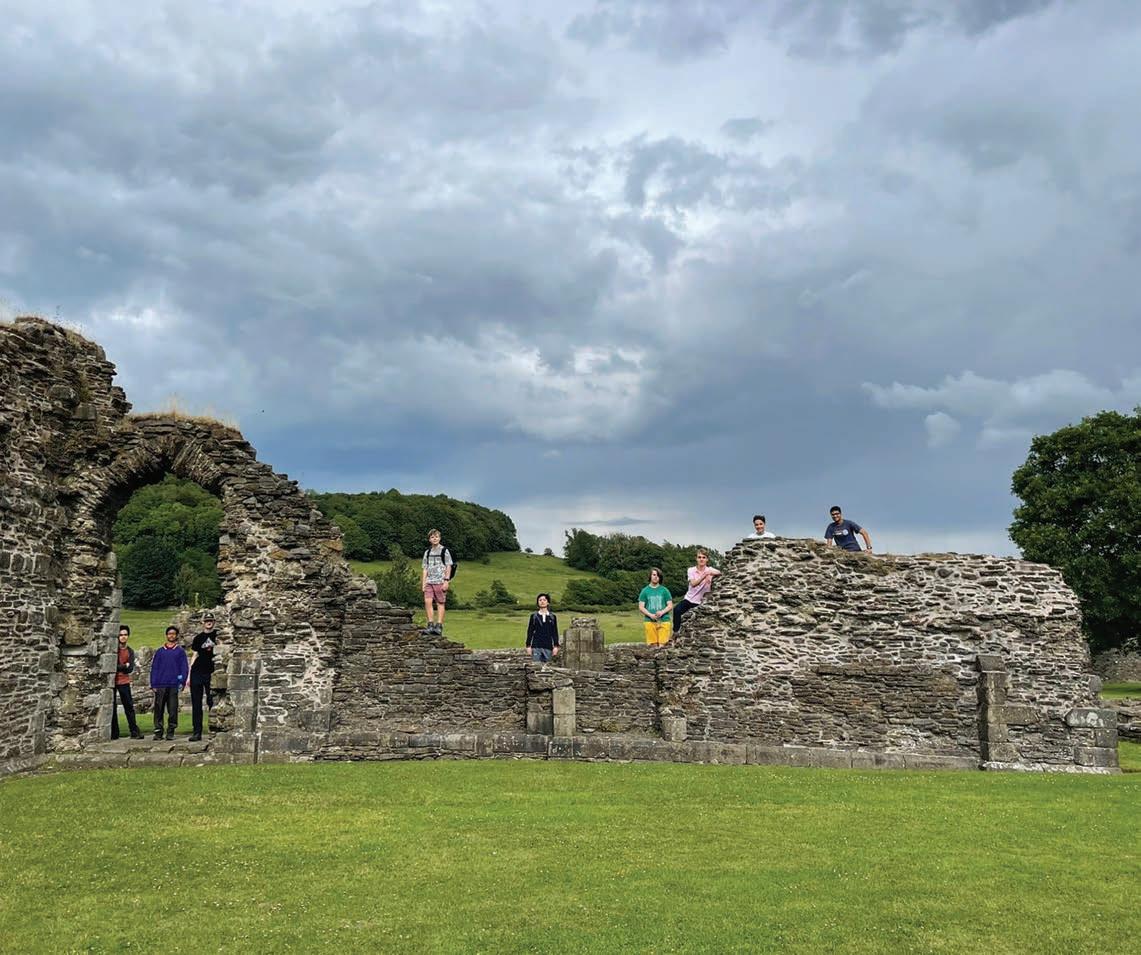
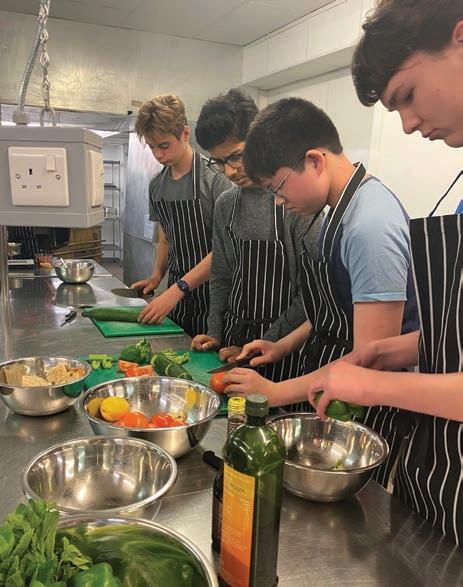

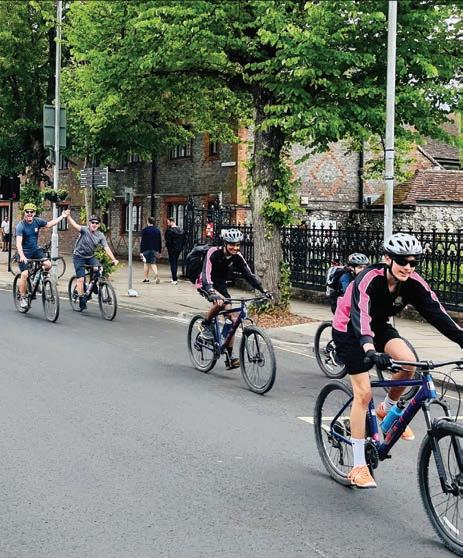




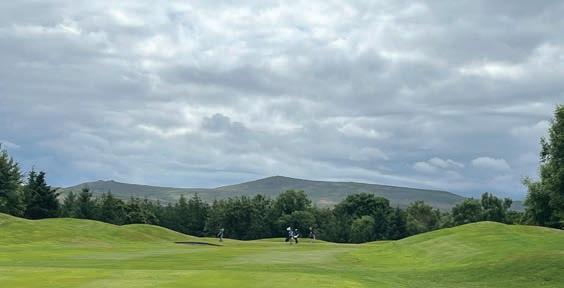

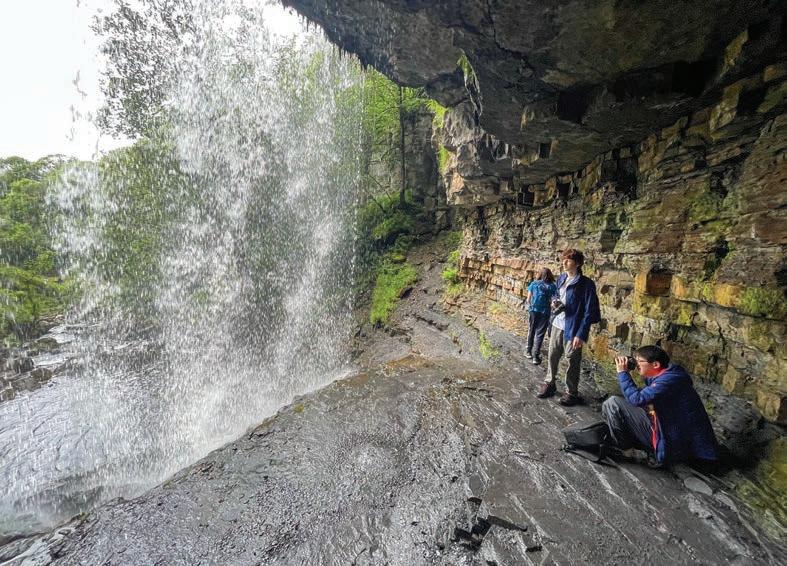
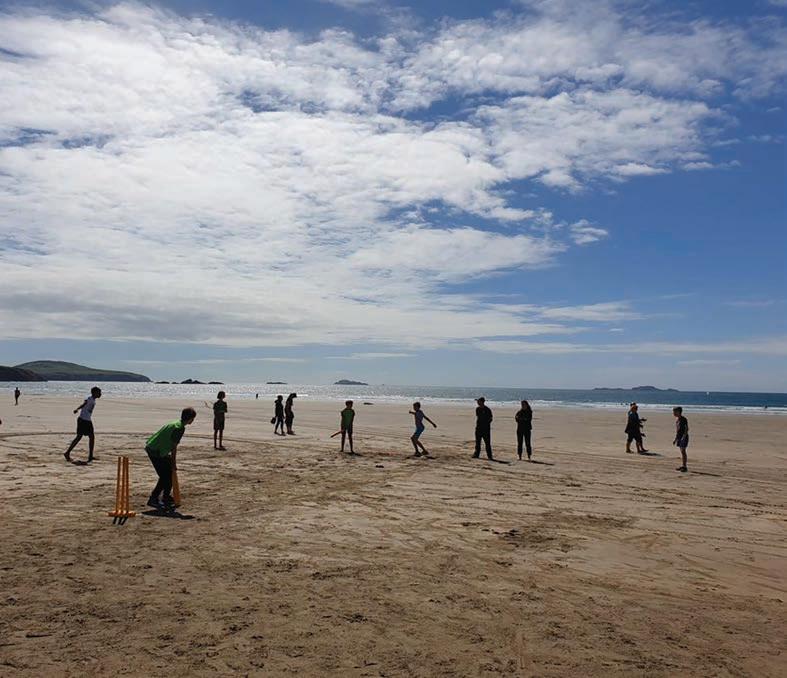



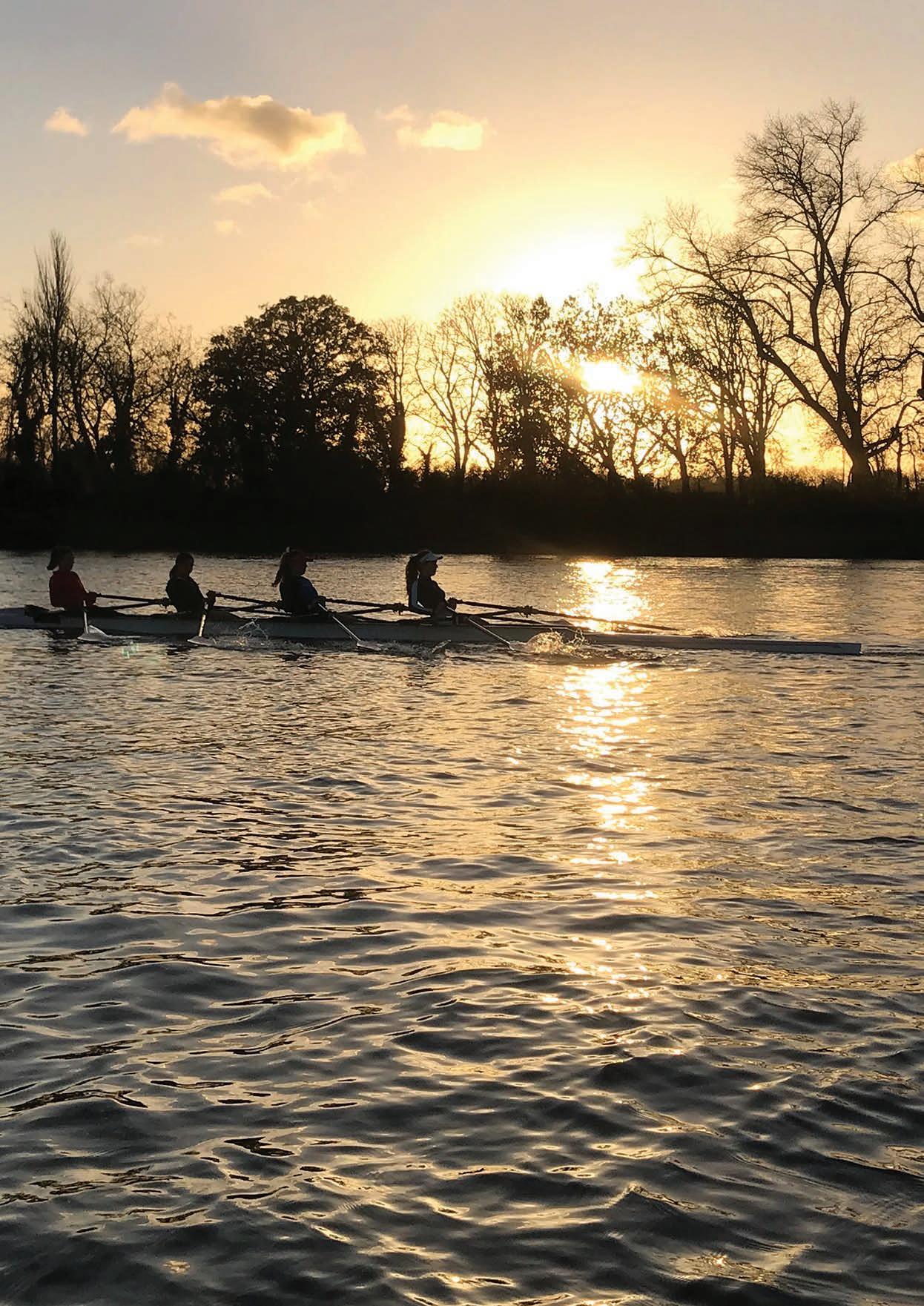

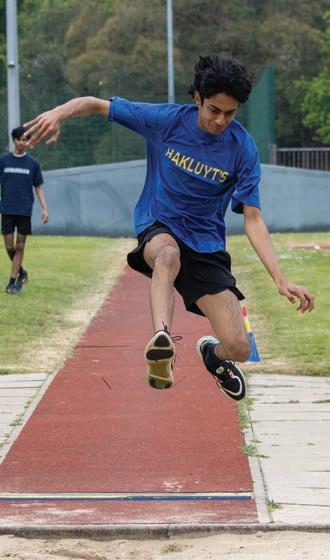


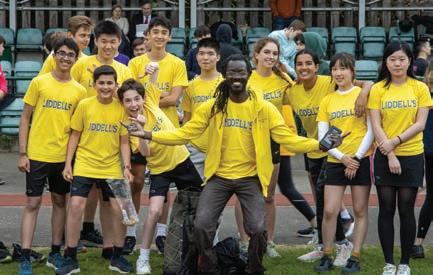

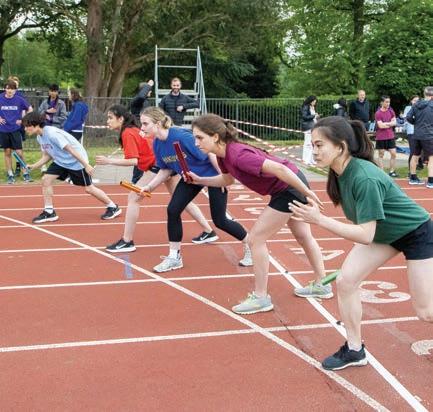
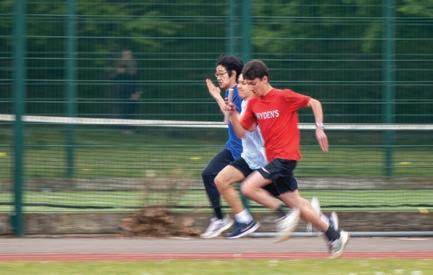
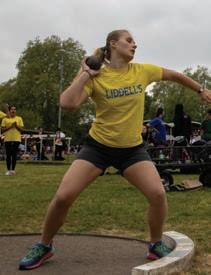
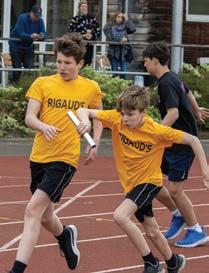
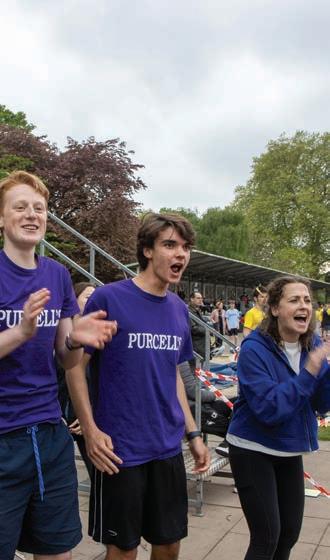

2021-22 has been a very successful year for Bridge at Westminster. Since Covid regulations were relaxed, we have returned to in-person sessions, playing and chatting in the true spirit of social Bridge. We have regularly been able to have three or four full tables playing at our Wednesday lunchtime sessions, which was a welcome return to normal.
Competitively, we were very successful, participating in several tournaments organised by the English Bridge Union. Over the course of the year, we had three matches as part of the new Inter-Schools League, against Glasgow High School, Loughborough Grammar School, and KCS Wimbledon. We won two of the three matches, with quite large differences in scores in all three games.
We also competed in the Salver at the Surrey Schools Cup in February, held at Wimbledon Bridge Club, with our A and B teams coming third and first respectively. Both teams dominated the competition, and the scores were very close until an unlucky last board. Congratulations to Jamie Berry (BB), Daniel Yap (RR), Ryaan Sultan (DD), and Aditya Gupta (AHH) for winning the competition.
Our last competition of the year was the Bridge Schools Cup, which was traditionally held at Loughborough Grammar School, but was held online this year, so we played from the comfort of room 24. Three teams competed in the event, with the C team of Annant Khullar (PP), George Zhou (QS), Felix Schaap (RR), and Luca Reina (WW) making it to the semi-finals of the Schools Cup, and the B team of Arya Salukhe (MM), Jenny Zhan (MM), Ryaan and Aditya coming a very close second in the Swiss Teams event.
The House Bridge event took place during the Election Term, which ran in an unusual format to give a single winner rather than a pair as winners. The plucky underdog Nathaniel Read (DD) won for Dryden’s.
Bridge Ties were awarded to Arya, Jenny, Daniel, Jamie, Aditya, Ryaan and Edmond Wang (BB) this year for commitment to Bridge.
Following the disruption of the previous two seasons, Cricket returned to normality in 2022.
The start of the season saw heavy defeats at the hands of Aldenham, MCC and Chigwell, though the team rallied with time. There was some indication of the triumphs to follow in the draws against the Pink Elephants – where skipper Tarun Eapen (GG), scored the first of his six half-centuries of the season and Dhruv Gupta (AHH) picked up three wickets – but especially against the “auld enemy”, Charterhouse. Chances to beat the Carthusians at 1st XI Cricket do not come along too often – but this was one. Following some superb play by Jamie Feldman (WW), Eapen and Nirvan Ramesh (MM), Westminster looked clear favourites to win, but the opposition fought with all their might to stay in the game, settling for the draw after an excellent game.
The team finally saw a victory, over Colfe’s in defence of the London Schools’ U19 Cup, following solid play from Eapen, Sachin Lavender (AHH), and Harry Sweeting (RR). Buoyed by success, there might have been some complacency against Alleyn’s next up, but it was Lower Shell to the rescue again with Feldman and Aidan Hincks (PP). The match was in the balance all the way until the last couple of overs when an outstanding diving catch by Ramesh in the deep dismissed the opposition’s star batsman, and Dhruv Gupta closed out a narrow win. This was followed by a victory over John Lyon, with Jai Gupta (BB) showing his class. Next up was an experienced Latymer Upper in the Cup semi-final, with Westminster showcasing the most mature and controlled performance that the Master i/c Cricket had seen in many years as Latymer were snuffed out on their home ground. All the bowlers bowled well but special mention must go to Ramesh’s off-spin and Aditya Gupta’s (AHH) nerveless death-bowling. A place in the Final was secured but there was a next-day hangover as Butterflies amassed an imposing total: call for the Lower Shell yet again as
Hincks and debutant Aryaman Gupta (PP) showed calm and composure beyond their years to secure an unlikely draw. Next up was the home match against St Benedict’s, a comfortable win.
Since the inception of the Jim Cogan Cup in 2008, the 1st XI had won every completed match, never allowing the alumni to get their paws on the Trophy. However, everything comes to those who wait, and this year it was the Old Westminsters’ turn. This match saw the debut of Sylvie Pearson (QS) who became the first girl ever (as far as records show) to play for the 1st XI. And she got the opposition’s best batsman out too!
The season drew to a close with the showpiece of the London Schools
U19 Cup final, held at Vincent Square, against Alleyn’s, with whom the Cup was shared in 2021. Westminster produced the most complete performance with ball and bat as has been witnessed for many a year, and a thoroughly convincing win. This was the perfect end to an enjoyable season which promised so little but ultimately delivered so much! Immense credit for this must go to the Player of the Year, Eapen, who led the batting stats while improving as a captain and tactician throughout the season, while Sweeting really came to the party in his final season. Hincks succeeded his elder brother as winner of the Most Improved Player of the Year, showing great skill with bat, ball and gloves. In addition, there were useful contributions from the likes of Aditya Gupta, Amol

Chauhan (MM), Mikaeel Toosy (LL), Philo Earle (GG), Arjun Kapur (GG) and Aryan Bagade (AHH). With nine of the regular starting XI returning, there is plenty to be excited about for the next few years.
Finally, I would like to thank all the staff and coaches connected with Cricket Station for their efforts throughout the year, and especially Keerthi Ranasinghe for his expertise and enthusiasm as coach. In addition, I would like to thank the Groundsman Franklin Barrett and his team for all their unstinting hard work. Thank you too, for their devoted support, to the parents who were most welcome spectators at Vincent Square and beyond.
James Kershen
The season opened with an away trip to Aldenham and the dubious musical tastes of Philo Earle (GG). Batting first, Aditya Gupta (AHH) and Philo laid the foundation for a healthy total of 142/7 (20 overs). The pace of Jaiyun Iyavoo (LL) and Eshan Amir-Zafari (HH) had the openers struggling for fluency and built scoreboard pressure. The idiosyncratic off-spin of Rishik Vishwanathan (MM) caused many difficulties as did the accurate seam of Sylvie Pearson (QS). It was left to Brian Morris (RR) to see us calmly to the close with his tempting but unplayable grenades.
At Charterhouse, we never looked likely to chase down their formidable total. A compelling game within a game was provided watching Philo squeak to an unbeaten 50 on the last ball of the innings. We comprehensively won the impromptu 5-a-side football against some year 10s while waiting for the U15As to finish so honours were shared on the day.
The whole team deserve credit for the way in which they have approached training and matches this year, a joyful and welcoming spirit has been pervasive. It is frustrating that so much cricket went unplayed with opposition struggling for numbers.
Matt Perrins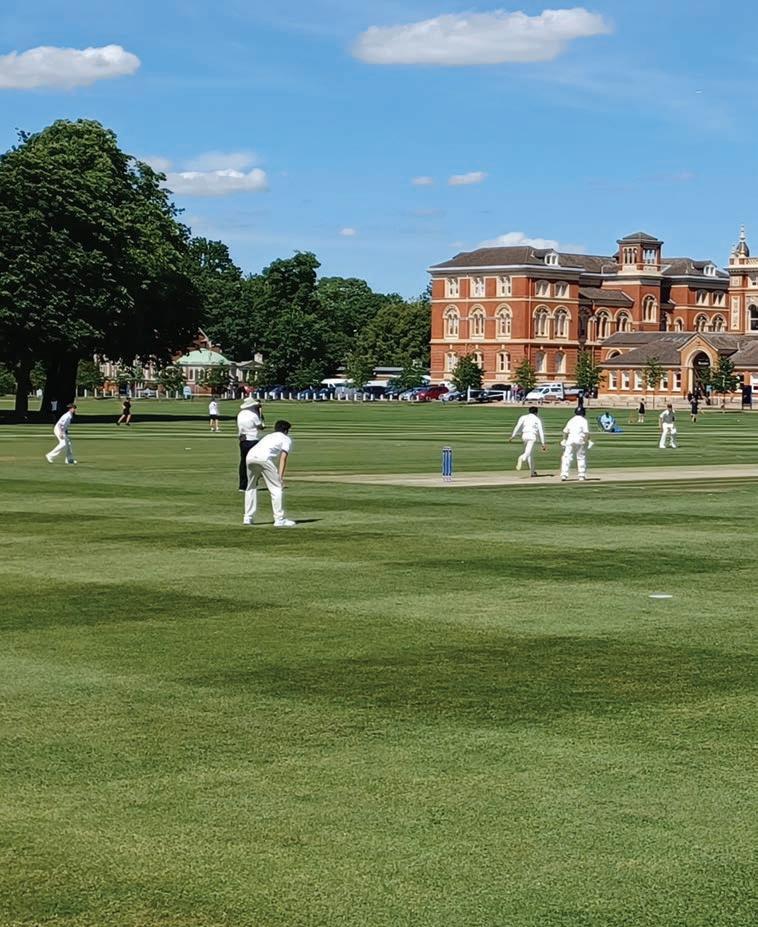


winning by 40 runs. Part one of the double was complete.
As London winners of the ESCA cup, they advanced to the national level, but at that stage met a Sevenoaks team stuffed with county talent, who were too strong in the end. It is remarkable that it was the one occasion this season where the full side was outplayed.
Sports, and in particular sports fans, have something of an obsession with the GOATs – the “Greatest of All Time” (as Muhammad Ali famously declared himself). It’s something of a pointless exercise, comparing sportspeople or teams from different eras. It’s impossible to say who was ultimately the best: Brady or Montana, Pele or Messi, Hendry or O’Sullivan and so on, when they played in different times. Even for contemporaries it is hugely subjective –Federer, Nadal or Djokovic anyone? You could make a case for whomsoever you like, depending on surface, form, vaccination status… they’ve all got ridiculous numbers of Grand Slam wins.
However, the current crop of U15 cricketers can lay claim to being the most complete, and certainly the most decorated, side Westminster has produced in recent memory. The balance of the team is excellent, batting a long way down, with quick bowlers, clever spinners, strong fielders – there are few weak links. And so in this amazing season they achieved the double of winning both the London region of the ESCA cup, and the London Schools’ FJP Ingham cup, laying claim to an unprecedented success.
Led by the captain, excellent opening bat and leg spinner Aidan Brooke (LL) they were almost unbeatable if they had the full team out. Two defeats to Charterhouse and John Lyon came when the side was hugely affected by absence, and fine victories against Aldenham (8 wickets), Highgate (7 wickets), Chigwell (124 runs), and Alleyn’s (57 runs) showed their mettle against domestic opponents. It wasn’t just English schools that were defeated: this year the U15s had two international fixtures. Firstly a team from the Netherlands were welcomed to Vincent Square – a close game with some great characters but in the end an 18 run victory for Westminster. Later in the term, Bishop Cotton School, Simla, India, visited – Bishop Cotton being an OW they were keen to set up a link. They were just off the plane, so rather unsurprisingly didn’t quite perform at their best, but there was talk of a return fixture in the future.
In the ESCA cup at Dulwich College we faced a strong UCS team in the semifinal who had knocked out Dulwich in the round before. When they set us a mammoth 162 in 20 overs to win it looked improbable, but an amazing performance took us over the line in a thriller, Brooke top scoring with a half century. Possibly the best comeback since Lazarus. The final against Emanuel was more straightforward, Westminster
On the last day of term, the team comfortably dispatched Colfe’s in the semifinal of the LSCA cup, and then faced the same UCS team, this time on a minefield of a pitch. Again the Westminster team triumphed, chasing a not-as-easy-as-it-sounds target of 95 to win by 5 wickets, completing the double and writing their name in history.
Other than captain Brooke, other individuals to perform well this season included opener and seam bowler Aidan Hincks (PP), who took a hat-trick in one match, and scored stylish runs in many. Fast bowlers Jamie Feldman (WW) and Rohil Bhattad (AHH) unsettled batsmen with their pace and bounce. Aryaman Gupta (PP) was great behind the stumps keeping wicket, and injected some aggression into the batting. Xander Berridge (MM) showed his allround class during the season, as did big hitting Alex Ross (BB) and wily spinner Aarav Mangla (BB). For the cup matches, U14s Nirvan Ramesh (MM), Alfie Jewell (MM) and Prakrith Rao (QS) stepped up to add their talents to the team.
The player of the season however was given to Jai Gupta (LL), whose amazing match-winning innings against UCS in the semi-final of the ESCA cup will live long in the memory, as will his great knocks at Sevenoaks (77), Chigwell (86), and again against UCS (39 on a difficult pitch). Not just that but his bowling and fielding is first rate. A future GOAT of Westminster Cricket? He’s got competition, which bodes well for the golden era ahead.
Huge thanks, as always to Mark Mason and Mark Parry for their coaching, a formidable team.
Charlie UllathorneThis was a season of fluctuating fortunes. First came victory over Aldenham, restricted to 139, after a sharp yorker from Sachin Guha (MM) bowled their opener. Skipper Yadhav Birundhapan (MM) anchored the chase with 34*, supported by Kumar Banerji Ballester (MM) and Alfie Jewell (also MM; watch out for House Cricket!). Both scored 24, but with contrasting styles: Kumar’s touch and Alfie’s brute force ensured a 6-wicket win.
Harris Crystal Palace were swept aside on their attractive ground by Norwood Lake. Spinners Nirvan Ramesh (MM) and Sam Menton (BB) took 4 wickets between them. Ramesh then raced to 49 before a smart catch removed him. Prakrith Rao (QS) eased his side to victory with 25*. We were pushed all the way by a strong Highgate team. Openers Ramesh (85) and Rao (67) put on 167, accelerating from 55 to 110 in only 3 overs, in a final score of 180. Excitingly, the margin of victory was only 10 runs. The best bowler was Kamran Iyavoo (LL) with 2-24, who also took a brilliant catch at gully. Ludo de la Mare (GG) ran out Highgate’s top-scorer with a direct hit from the boundary.
The wheels of our chariot came spinning off at Chigwell. Facing a total of 177, merry hitting from de la Mare (21) cheered the crowd, but defeat by 84 runs followed. Enter, resoundingly, Alfie Jewell to inspire his teammates. 101* for him, with Rao’s cultured 54 and more slogging from de la Mare (22), took the team to 213-4 and a spectacular victory by 91 runs. Jewell continued his golden day with 4-10, clean bowling the flower of the Alleyn’s batting and finding himself on a hat trick, before an lbw shout drifted agonisingly down the leg side.
Defeats against Charterhouse, John Lyon and UCS were frustrating. Bhuvan Jumani (WW) stands out for his 2-20 against Charterhouse. There Rao, who had retired hurt due to a blow on his hand, bravely returned to the crease –and insisted on playing two days later. A buccaneering counter-attack of 39 from Hugo Canning-Jones (RR) had the visitors dreaming of an unlikely victory over Lyon, but a break for a lost ball disrupted his rhythm and he was bowled. Byes had taken the boys to the semi-final, but a difficult UCS wicket and 3 mad run-outs sent them crashing out of the LSCA cup. With several injured, many thanks to Christian Jakobsen (RR) for making his debut at short notice.
St Benedict’s did their best to spoil the end-of-season party but Jewell (49) and Rao (44) were irresistible, before generously allowing others to have a smash, as Gobind Kohli (BB) would say. A brace of wickets for both Birundhapan and Jewell underpinned a 63-run win. Congratulations to all for contributing to a very enjoyable season, and thanks to Buddy Mason for his expert coaching.
Joe IrelandAt many schools across the country, pupils find themselves participating in mandatory sports regardless of whether they enjoy it or not, but at Westminster it’s quite the opposite: there is an endless array of possibilities. Despite this, some still prefer the fundamental sport of running.
Although located in the buzz of central London, surrounded by some of the most popular tourist sites, there is no lack of local greenery. Typically, we head out to St James or Green Park to do interval training which consists of several 500-800m repetitions. This can sound quite daunting, especially if you’re one of the “steadier” runners, as Mr Wurr puts it. However, Cross Country is tailored to athletes of all abilities, allowing everyone to run at their own pace, and what most people find is that, irrespective of their starting fitness, they improve week on week. When we’re not doing that, we tend to go on longer runs of about 2-4km which is probably what you would imagine when you hear “cross country”. My personal favourite is the 3km run around the Serpentine in Hyde Park, which is particularly enjoyable when the sun decides to come out.
Although the Station caters to pupils of all calibres, there are also many
opportunities to compete, for those who are so inclined. The appropriately named “Long Distance Races” are a House event which takes place in the Play term, where pupils will run between 2.5 and 3 miles, depending on their category, along the Putney riverside. Although doing Cross Country isn’t a requirement for participating in these races, those who do, tend to place very well. Taking this year’s Bringsty Relay as an example, the fastest individual times for the junior and senior events were run by Nicholas Taylor (GG) and Ben Weiss (GG) respectively, who both developed their skills during Cross Country Station.
While House events are great fun, the most dedicated runners can test their skills at an inter-school level. Understandably, Covid has caused some difficulties, but these races are returning. This year Westminster participated in the London Schools Cross Country Championships. Our senior team took home a silver with Sam Lui (RR) and Alexander Pitlarge (BB) both being invited to compete nationally. Although our juniors didn’t place in the medals, Nicholas Taylor came fourth overall individually.
So, whatever your level of experience, Cross Country is the perfect Station for enjoying the local greenery whilst staying in good shape.
Toby Van Mook (QS)


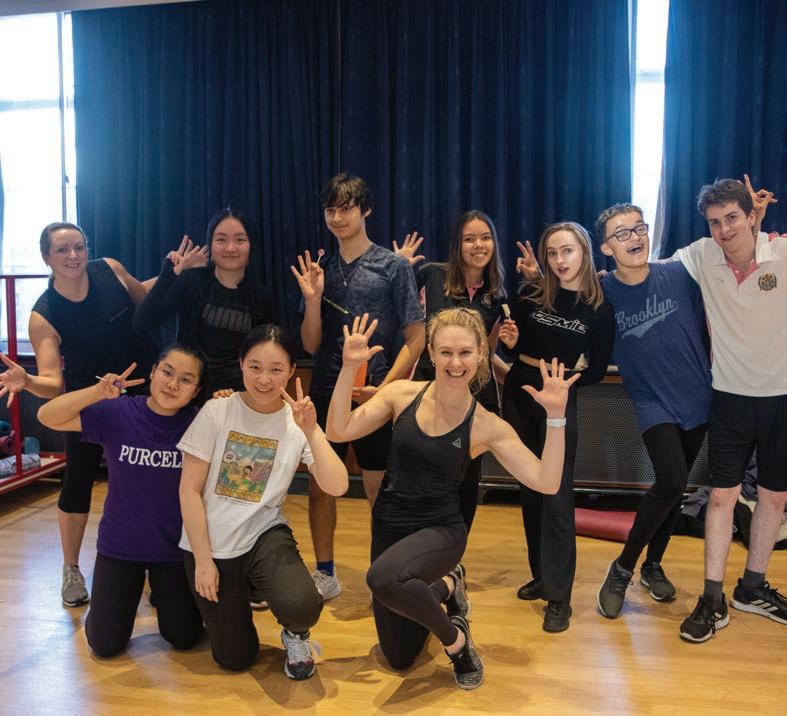
Physical chess is how some describe it. My personal chess inabilities (rare at a school like Westminster) will lead me to pass no further comment, yet it probably holds some merit. Fencing occupies a liminality wherein the athlete must be both incredibly physically able, yet also perceptive, intelligent and tactical. It is a rare blend of skills that I don’t believe many sports offer.
As I’m sure most articles will state, fixtures triumphantly returned in the Play Term of 2021. Despite an initial (very close, very frustrating) loss to –wait for it – Eton (1-3), Fencing Station enjoyed almost unrelenting victories henceforth. The impossibility of fencing as a team marks the sport as
incredibly individualistic: nevertheless, we have managed to fence as a team continuously. Everyone has always given excellent support piste-side, so despite the daunting pressure of your teammates relying on you for the rolling score, you never truly feel alone. This team spirit certainly shone through in our impressive wins over Tonbridge (3-1 and 3-0), the Juniors’ victories against St Paul’s (2-0) and Charterhouse (2-1). Special mention here must go to the Tonbridge tea –in my near-concluding school sports career I have never played a fixture that offers chocolate truffles as a post-match treat.
The school Fencing season concluded with the Public Schools Fencing
Of all of the Stations that I have chosen in the past two years, Dancefit is certainly one of my favourites. It combines aerobic exercise with dancing, making the tiring training more engaging and exciting. The workout itself is quite challenging, and you will end up sweating after 40 minutes even at the coldest time of year. Mrs Kershen makes exceptional choreography that exercises every part of your body. There is a special ten minutes every session dedicated just to training the core and back, which is immensely helpful for pupils who sit at desks all day! It helps improve the posture significantly, as well as making you feel less tired when you exercise, since a good core is essential for most workouts! The playlists include a wide range of songs, including samba, k-pop and musicals. If you have a particular song that you would like to dance to, simply request it and you may hear it in the next few weeks. Overall, Dancefit is an awesome Station which helps you relax after a tiring day of lessons as well as actually engaging you with physical exercise, and is highly recommended to all.
Nicole Zhang (GG)Championships, held in March. The Championship’s history stretches back to 1890, and can claim to have continued, uninterrupted, throughout WW2, but sadly not through Covid, so this was the first since 2019. Westminster fielded ten entries across the three days, with notable highlights including Alec Brooke (LL) winning the Senior Boys Épée title, Martha Carus Bird (AHH) coming second in the Senior Girls Foil, and Kalista Lam (GG) making the last 16 in the Senior Girls Épée. Reflecting upon Fencing Station without mentioning the successes of Alec on the international scene would be remiss: his second place in this year’s European u20 Championships is, quite frankly, very, very impressive.

Station sessions themselves are always fun: an opportunity for footwork, lessons and sparring. Unadulterated thanks, as always, must go to our coaches, Leo and Tomek, who have been incredibly committed: driving us through rush-hour London traffic, putting up with (my) frustrations towards referees, and offering marvellous coaching. And a big thank you too to Mr Butler, who has managed the logistics of the Station with mathematical precision. We are all incredibly grateful!
Martha Carus Bird (AHH)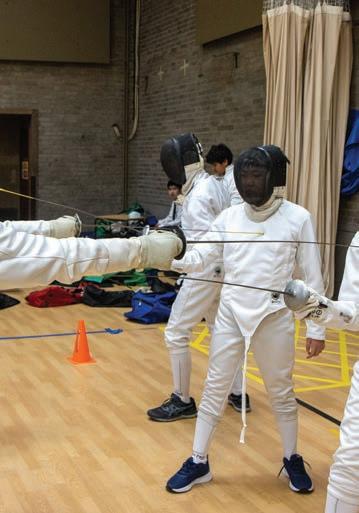
It was a pleasure to see the return of Fives fixtures this year. For the first time in several years, Westminster stepped off the Harrow Fives courts victorious, with the first pair, Tarun Eapen (GG) and Arjun Kapur (GG), having fought hard for their three sets to win their game.
This Remove pair has led the way with purpose and rigour, but has been dutifully supported by Gregor Lumsden (MM), Darshan Fernando (HH) and Samvit Nagpal (HH), with Sixth Formers Aditya Gupta (AHH) and Henry Williamson (AHH) bound to make the Fives family proud next year. In the Lower School there are too many promising talents to name, but it is clear that our future is bright. The morning of the rejuvenated Eton Fives National Championships was a testament to our team spirit. Eapen and Kapur were ready to take the competition by storm, yet regretfully it was not to be. Eapen tested positive for Covid just before the teams departed, and, like a knight in shining Fives gloves, Lumsden stepped in and the two of them played very well together. Luckily, Eapen and Kapur played together once again in the fated return of the House competition at the end of the season. Unsurprisingly, they won in style for Grant’s, losing only three points in the whole competition.
Though Matt Wiseman may be further afield, the Fives squad are greatly indebted to him for both his management and words of encouragement. The next generation is in the safe hands of a new coach, Andrew Charles, who is swiftly making progress at mastering the art of Fives. Congratulations to everyone on a successful season which has taught us once again that, whether it be to let off some steam, socialise with friends or demonstrate fierce competition, the serene courts of Ashburnham Garden are the place to be.
Tarun Eapen (GG)In 2015, when stepping down from my first stint as Master i/c Football, I did not anticipate returning to the role so soon, if ever. My first season in charge of the 1st XI back in 2008-09 was an annus pretty horribilis, and whilst 2021-22 did not plumb those depths, certainly it did not overflow with success in terms of wins achieved.
In truth, regular first team Football probably came a year too early for several of the Sixth Form who were catapulted into service for a 1st XI bearing only a handful of Removes of the appropriate standard and commitment. Nevertheless, barring a few matches in the Play Term, the side were competitive throughout and showed clear improvement, without quite having the experience and killer instinct to close out a number of tight games for victories.
Given the expectation that Vincent Square would be out of action due to planned major works, it was one of the major plus points of 2021-22 that delays meant up Fields remained available throughout – although the Pavilion building works necessitated changing in the inimitable white marquee tents.
The most popular scoreline of the season was definitely 2-2, which occurred six times in total. Most of these matches we could and should have won, although the 2-2 draw away to Forest, coming from 0-2 down with only 5 minutes remaining, was a definite highlight and the Westminster version of “smash & grab”. The best win came early on against a Winchester side that fancied its chances but were dismantled 4-1 at the Square, with Captain Luke Grbesa (DD) scoring twice and showing that he could –from time to time – be “unplayable”!
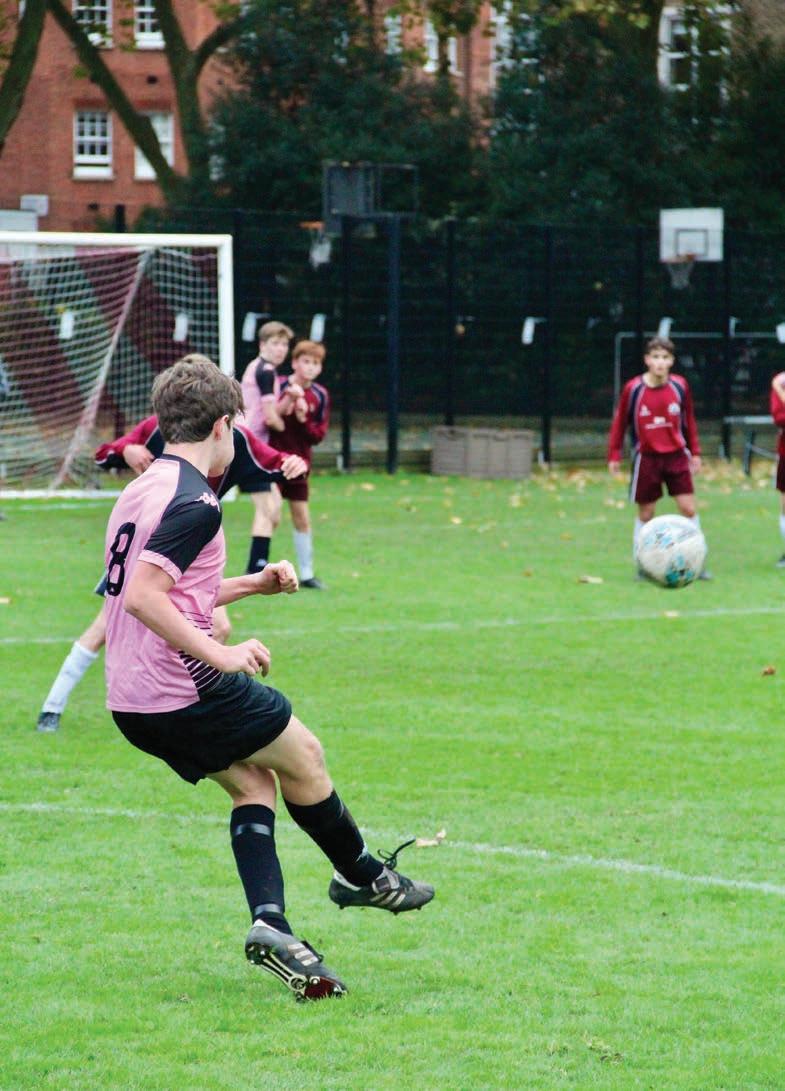
The game away to Charterhouse –which remains the oldest continuous football match in the world – was the 1st XI’s season in miniature. A customary slow start saw Westminster concede in the first minute but then battle back to lead 2-1, only for Charterhouse to equalise deep into the second half. With the clock ticking over into injury time, a free kick into the opposition penalty area found Kaled Haram (BB) with a bullet header onto the underside of the crossbar and down onto the goal-line (à la 1966 World Cup Final). Fervent appeals for a goal waved away, there ensued a massive scramble in the Carthusian penalty area before
the ball was hacked clear only for a Westminster miskick on halfway to send the Charterhouse winger haring away and square the ball for a tap-in winner, followed by the final whistle!
Billy Jai Campbell (BB) and Miles Hitchcock (BB) showed great potential as goalkeepers for next year. The defence were often overworked but improved throughout, boosted by a late change of formation, as well as Theo Mackenzie’s (RR) return. This added to the talents of Melchior Walewski (AHH), Mattia Bertone (GG) and Haram who will all return older and wiser next season. Down the flanks, Sam Lui (RR)
was a perpetual motion machine on either side, whilst Jack Nation (WW) delivered on the left but particularly impressed when dropping back into defence. In the middle, Alexander Feldman (WW) showed poise and creativity, facilitated by the dogged “holding” work of Joaquin Segal (AHH). Grbesa showed his impressive ball skills both up front and “in the hole”, whilst Diego Danese (WW) had an eye for goal up top, often accompanied by the combative Sachin Lavender (AHH). Injury and illness prevented Freddie Flowers (BB) and Nat Lansing (PP) from playing as much as we would have liked but both did well up front and out wide when available. In addition, there were useful squad contributions from Elias Gelain-Sohn (LL), Alex Matsnev (RR), Kai Mistry (PP) and Ivan Solomakhin (AHH).
Thank you to all the parents for their support spectating both up Fields and further afield. We are grateful to Groundsman Franklin Barrett and all his team for their hard work and devotion in challenging circumstances, and to the Football Station staff and coaches for their unceasing commitment, help and support. Special thanks go to coach James Lewis for his technical and tactical input throughout, and I look forward to developing our coaching partnership next year and beyond. Finally, it is farewell and thank you to the Director of Football Coaching, Paul Barnes, who after 15 years’ service has decided to explore pastures new. During that time, Paul has made a significant contribution to raising the standards of the overall Football programme and coaching delivery. He will be missed by many, and we thank him for all his efforts.
James KershenWhere to begin? Having not seen two-thirds of the players and playing no matches in 18 months, selecting the 2nd XI was not going to be easy. It is, therefore, no surprise that there were many changes along the way. Four goalkeepers, six captains, 50 goals conceded, 36 players, 785 miles travelled and countless different formations and player combinations until a winning formula was finally settled upon.
Starting the season with a great deal of enthusiasm and confidence against Winchester, the 2nd XI stormed out of the traps and made it look very much like they were going to have a fantastic year. 2-0 up with goals from Luca Mian (LL) and Jonah Hawksley (BB) within the first ten minutes, the scorers were being prepared for a cricket score and the coaching staff patted themselves on the back for a job well done. Little did the players appreciate how much things were about to change; Winchester managed to score 7 without reply and it was obvious that changes would be needed as well as work on fitness and physicality in the forthcoming games.
Having gone back to the drawing board John Lyon were next to experience the fast-paced start, with Westminster rushing into a 2-0 lead within five minutes, with goals from Nathaniel Levy (RR) and the first of the four goals that joint leading scorer Kai Mistry (PP) would get across the season. However, a lack of fitness played havoc with the 2nd XI and they succumbed once again, although only by the narrower margin of 4-3.

The next few months saw much to-ing and fro-ing, as the purist’s 3-5-2 formation was ditched for a more pragmatic 4-4-2 and then eventually 4-3-3, all whilst losing game after game. Players and captains came and went, with some moving into the 1st XI, while others succumbed to injuries and other commitments. It was only as February half term approached that the team managed to turn things around, drawing first with Latymer Upper School 2-2, conceding with the very last kick of a very long game. They beat the staff team 1-0, and the OWW 3-1.
With much trepidation we boarded the bus for our longest journey of the season (185 miles round trip) and a game against Marlborough College, wondering if we could continue the winning streak. Conceding after a few minutes, the senior players led by Faizan Malik (MM) took charge, dominating the game both with the physicality and determination to win. Malik scored two goals, one of which was a delightful strike from outside the box and another scrambled in from a few yards. This game typified everything that the squad had been working on and was capped with a goal from Mian, which would grace any game at the highest level. This 5-1 win was the highlight of the season and ensured that we could be pleased with the season’s efforts. The final game of the season away at RGS Guildford was won 1-0, courtesy of set-piece finish from Luca van der Lubbe (DD).
Zachary Romeo (RR) shared the Golden Boot for top goal scorer with Mistry on four goals, while Miles Hitchcock (BB) won the Golden Glove for the fewest goals conceded per match (two). The fantastic end to the season ensures that all involved in Westminster 2nd XI football can look back on this season with fondness and a great deal of enthusiasm for the next year.
Marwan Mikdadi and Faizan Malik (MM)
The 4th XI had an enjoyable season, even if the stats suggest it wasn’t the most successful.
In our first game, Victor Broun (GG) and Ivan Matsnev (RR) raised hopes in a scoreless first half at Winchester. A 2-1 loss featured a Ralph Renfrew (PP) magic drag-back and breakaway cross, expertly finished by Amol Chauhan (MM). The hope continued into the next game, when Will Wickham (DD)’s corner was volleyed by Chauhan to give the 4s a surprise lead over a strong Highgate side. However, extraordinary misfortune struck when a defending error resulted in goalkeeper Adam Irwan Shahrin (WW)’s clearance rebounding off Tate Ford (LL)’s back and into the Westminster goal. Highgate, with a seemingly endless supply of substitutes, won 6-1, despite a late rally led by Ryaan Sultan (DD), playing excellently on the left. A break in the fixtures meant time for some rigorous training under Mr Ireland before what was undoubtedly the height of the season, a home game against Charterhouse. With the score at 2-0 to the visitors at half time, things were not looking good. Goals for both sides soon after the break, including a left-foot finish from Marc Lowth (HH), upped the tempo. Referee Mr Hayter, having awarded a stone-cold penalty against Alexei Sandmann (LL), intervened as tempers frayed, with Sam Mohri (MM) squaring up to the opposition striker. Then, refusing to write it off, Lowth came close before making it 2-3. With seconds left, Chauhan drove a loose ball into the right corner to rescue a 3-3 draw from a seemingly unpromising game.
Unfortunately, we were unable to carry this up to Aldenham. We orchestrated some nice attacking play, largely led by a classy performance from Rauf Malik (QS), but the game ended in a 5-0 reverse. At Eton on a cold December day, we had another 6-1 defeat, although the tea was good, as always. A similar (yes, 6-1!) loss at Harrow followed. We celebrated another goal by Sultan, who bravely beat the defender to steer the ball home, but our defence succumbed to their fast attack. Finally, at Marlborough, and despite the twohour coach journey, the desire for a win was strong. Stand-out performances from defenders Dom O’Malley (AHH) and Tate Ford kept things solid, but we did concede a crucial penalty. Even though there were some sights of goal (including a fierce strike from Luxman Chandrasekaram, (DD)) and fearless goalkeeping from Irwan Shahrin in his last Westminster game, we ended up losing 3-0. Overall, this has a been a very fun season for the 4th XI and the hunt for a win will continue next season…
Adam Hepburne-Scott (DD)The U15 team suffered a rather difficult season, but despite not having the greatest set of results we definitely improved towards the end.
We started with a few defeats by increasingly large margins: Highgate, Alleyns and others comfortably beat us, 7-0 was a recurring score in the first half of the season. But at about the midpoint, we came across a first victory: Aldenham 1-0! We scored from a corner with a close-up volley, giving the keeper no chance. For the next 40 minutes we defended without rest, making block after block and tackle after tackle. It was a hard fought win showing both determination and passion for our team. After this our season started to turn around, not really results-wise but definitely performance-wise.
We had a draw against John Lyon and a few very hard fought slim defeats. Our 4-3 loss against Whitgift was, I would say an excellent performance despite the result. We went 2-0 down inside 25 minutes but then fought back to 2-2. At the end of 60 minutes, the score was 3-2 Whitgift. With 20 minutes to go Whitgift went 4-2 up and yet again we managed to score again to get it to 4-3.
We didn’t have the most fruitful season points-wise but fortunately we definitely saw far better performances towards the end of the season. Overall I would say it was a success, especially when we take into account our improvement.
Jamie Feldman (WW)The U14’s season kicked off with a huge amount of enthusiasm on display – 57 players came along to the taster sessions and it was clear there was going to be good competition across all positions. Adapting to the 3-4-2-1 formation can take time, and training sessions focussed on building a solid shape from the back, but the team made a tremendous start. Despite the majority of players being brand new to this system, the team started with three wins on the bounce followed by a draw.
Lakshikan Hemashabeshan (DD) was the linchpin of the attack, scoring in each of the first seven matches (including successive hat tricks). Behind Lakshikan the competition for the Number 10 roles was hot and assists came from a variety of sources. The solidity for the team came through a choice of two reliable goalkeepers, a well-balanced back three and the two central midfielders protecting them. Fergus Farrell (BB) deserves special mention for setting the example as captain through his tenacious and tireless work to win the ball back in the centre of the park. The real flair of the team could be found on the wings, with Adam Galal (AHH) and Rohan Varsani (AHH) terrorising the opposition full backs with great technique and pace to burn.
Alston trips and Oliver! rehearsals inevitably caused disruption to the squad and a run of losses reflected this, but this also gave the opportunity for new players to come in and prove themselves; over the course of the season, 22 players represented the U14As and several took full advantage of their chance to show they belong at this level.
The team finished the season on a high with a fluid 4-1 win over Wimbledon College and the squad are well-placed to kick on from this next year. Many thanks as always are due to Mr McEntegart for his expertise both in pushing to bring the most out of each individual, and in bringing the team together into a coherent and well-oiled unit.
Andrew BottomleyThis season saw a return to a full calendar of fixtures, although the refurbishment of Vincent Square meant a lot of away trips. Despite a few slow starts due to tired legs after long journeys (3-0 down after three minutes vs UCS), the players responded well and typically ended their matches strongly. Ably captained by Tobias Wynne-Baerwald (MM) we used a total of 25 players throughout the two terms of fixtures with Giacomo Filippi (RR) and Sachin Guha (MM) gaining promotions to the A team. Some of the regulars were Kian Charania (HH) who brought composure to the midfield with his calm passing alongside the tenacity and controlled aggression of Edgar Ferris (QS), the silky skills of Sebi Michelli-Marsden (LL) and the enthusiasm of Anton Drel (DD) whose spirit even survived a broken wrist against Highgate. We also benefitted from the boundless energy of the wing backs, Alfie Muirhead (RR), George Wilkinson (DD) and Sam Menton (BB). The defensive line was solid with the athleticism and strength of Martin Rollier (WW), Lachlan Qui (MM), Eddie Jiang (RR) and Tobias protecting our brave and acrobatic goalkeepers Josh Vickery (GG) and James Lindquist (MM). Our attack featured the crisp, left footed striking of Hugo Canning-Jones (RR) alongside the mazy runs of Nicolas Shah (BB).
The results didn’t always go our way but the commitment and passion was ever present as the boys adjusted to the 3, 5, 2 formation and the shuffling of the team sheet due to Alston trips and Covid. I’m sure that they will develop as a strong footballing year group as they progress through the school.
Sirio QuintavalleThis year’s season has been one of many firsts for girls’ football, kicking off with our inaugural preseason training before we headed straight into the London Schools’ ISFA tournament. A close match against Harris Westminster ended with a 3-1 win on penalties, setting the tone for the rest of the season as the 1st XI began to take on increasingly challenging competitors.

One of our highlights was the 1st XI’s 1-0 win over Charterhouse, scored by Amia Guha (RR) whose excellently placed shot deflected off the Charterhouse defender into the net. The team put in a stellar performance, with the ball rarely straying behind our defence and Westminster dominating the match play. Returning to Charterhouse for their 7-a-side invitation tournament, the Westminster A and B teams put in fantastic performances, with the A team placing third overall in the league. Of course, football isn’t just about the goals you score but the goals you save, and special mention has to go to our goalie, Adanna Ezenwa (WW), whose deft keeping skills and supportive presence has been indispensable to the team. Internally, Girls’ House Football in December was a fiercely-fought competition, with a heated final between Wren’s and Ashburnham resulting in a 1-0 victory for Wren’s. All the Houses showed enthusiasm as well as great skill, and it provided a chance for the current Removes to recruit some of the Sixth Formers in preparation for the next season.
Some of the greatest highs, however, have gone beyond the fixtures to our training sessions during Station. The Station itself has grown from just a handful of players when I joined in Sixth Form, to an ever-growing group combining both seasoned players and those who have never played before in their lives. As a squad, we look forward to Tuesday and Thursday afternoons when we can put exam stress and work to one side by getting out on the pitch! Making all of this possible are our wonderful coaches, Oli, Mr Morgan, and Ms Choraria, who have guided us through the ups and downs of the season, helping us mature as a team. Their own dedication has helped turn us into a cohesive team whose strength lies not only in its individual players, but its enthusiasm and passion for the beautiful game.
As the departing Removes prepare to hand over to the current Sixth Form, we look forward to hearing what the next season brings!
Clara Hartley (WW)Golf Station takes place during the Play and Lent Terms and has been managed by Mr Ullathorne since the start of my time here, and run at Dulwich and Sydenham Golf Club for the past four years. The club has a well-kept 18-hole course as well as a practice chipping area and a putting green. This year we enjoyed a new golf simulator, with an automated driving range and the ability to play almost any course you would like. In addition to all of the facilities, there are two pros who coach us during our time at the club: Ben and Adam. Having coached us for the previous four years they took us again this year and coached all of us very well throughout.
The Station is open to all years except Fifth Form, and this year was taken by me, Philip Yanakov (LL), Jaiyun Iyavoo
(LL) and Mikaeel Toosy (LL) in the Remove, as well as Alexandre Campant (QS) and Donnacha Doyle (GG) in the Lower Shell. Through the cold months the indoor coaching from the two professionals brought all our games on a long way. Everybody improved significantly throughout the course of the year, the most notable of all being Jaiyun who reinvented himself from a hacker to very respectable player. The Station was thoroughly enjoyed by all and was an extremely comfortable one, with the warm indoors for the cold days and venturing out onto the course when the weather was more accommodating.
There was not only the Station, however. Throughout the year we played in several matches and entered competitions too. Despite limited
success we had our occasional moments of glory most notably with a highly competitive game against the Old Westminsters. The matches were more than just fixtures, often being a chance to meet new people from other schools, play some of the best courses around London and enjoy some good food all with good friends and Mr Ullathorne’s chilled-out presence.
Having greatly improved my own golf game this year I cannot recommend Golf Station enough. It is a relaxed, challenging and rewarding Station where you can learn and enjoy golf. Without wanting to speak for my friends I believe all had a very good time there this year.
Harry Sweeting (RR)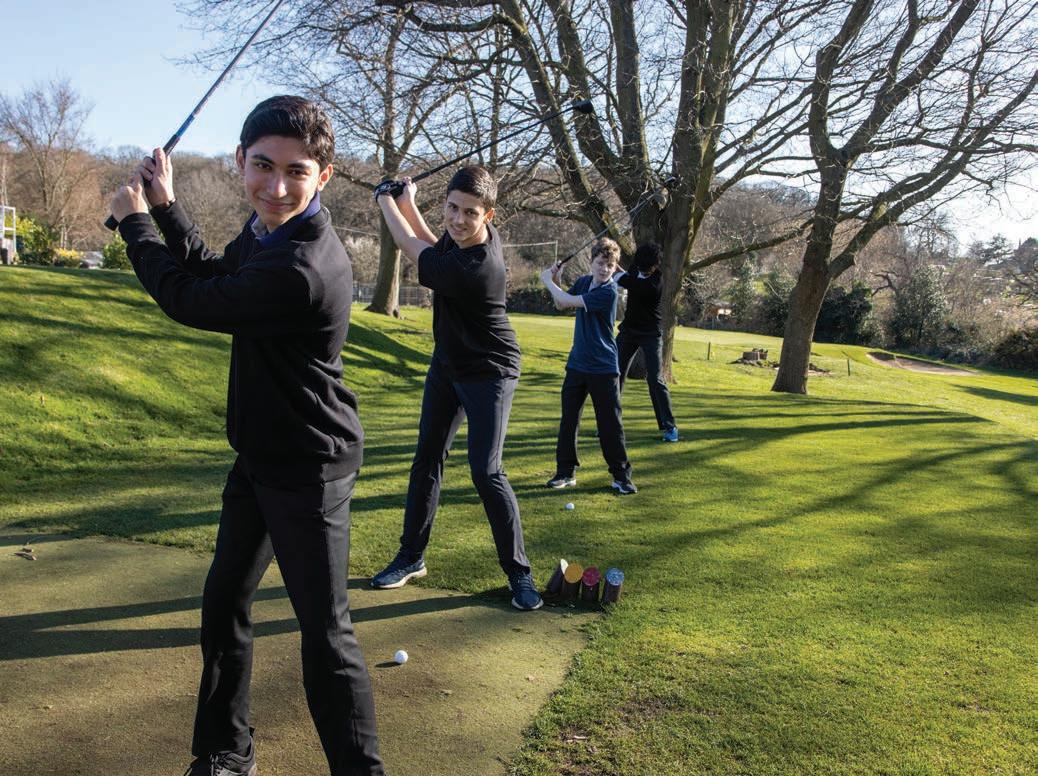
It’s true that, at Westminster, more could be done to encourage the joys, excitement, and learning opportunities that team sports provide, yet here at Hockey Station we’re committed to the cause. Twice a week, pupils from Fifth Form through to Remove play their hearts out on Battersea’s finest astroturf with a competitive and collaborative fervour. This year saw the addition of Mr Anderson to our dedicated coaching staff, and with his tough and, at times, merciless training sessions, the 1st XI went from strength to strength.
Special thanks go to my co-captain Morgan Bjorklund (DD) for his ceaseless commitment to hockey this year, and with whom, since we both joined Hockey at the start of Fifth Form, I have thoroughly enjoyed tearing up the midfield. Further gratitude goes out to Paras Shah (AHH), a key player in every match and forever energetic and animated in training sessions, he is an inspiration to the younger players. Our defensive back line would be nothing without the commanding presence of Katie Wynne-Jones (GG) and Cem Muminoglu (RR), both of whom had plenty to do over the course of the season.
After a year of record-breaking scores, I leave this fantastic team in the capable hands of the Sixth Form and Upper Shell, and with the ability of Frederick McGrath (PP), Yuxuan Jiang (WW), Tobias Potel (GG), Andrei Piterbarg (DD), Shaylan Roy (HH) and Nikhil Sarath Kumar (WW), I have high hopes for its success!
Magnus Cameron (DD)
The season started off strong with a promising performance, when the Under 16s played UCS and claimed a thrilling 2-1 victory under the flood lights, where Prakrith Rao (QS) scored the decisive winner.
Within our squad, Tobias Potel (GG) did a superb job in commanding the defense while not being afraid to push forward. Andrei Piterbarg (DD) and Nikhil Sarath Kumar (WW) also played crucial roles in the attacking force of our team. However, challenging opponents such as Eton and Harrow made it difficult to replicate earlier success but the team demonstrated skills such as teamwork and determination, especially from those in the younger years who stepped up to the challenge of under 16 Hockey. Among those who stood out from the years below, was Arman Nedungadi (DD) as he was a continuous threat in the opposing half and always had the perseverance to create chances to score. During training, our age group often played with the older years which allowed the squad to become more confident in their individual skills as well as the chemistry between players. As the squad continues to improve, I am hopeful that next year the under 16s will be able to build on the achievements of this year, leading to more wins!
Shaylan Roy (HH)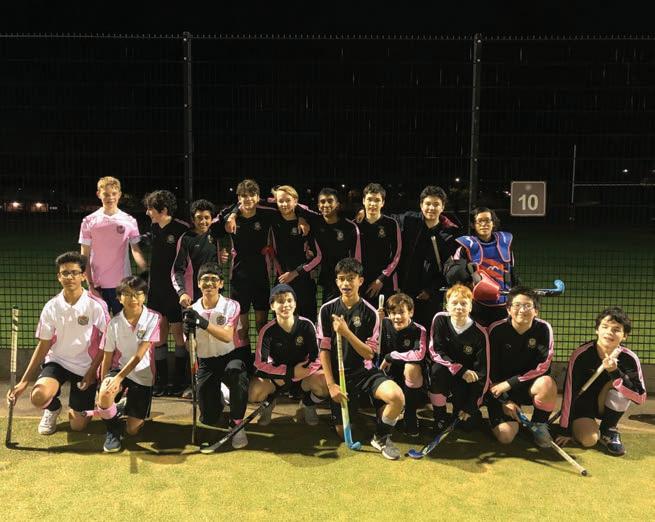

What a year for Judo! Though our sport occupies a slightly niche position amongst Westminster Station choices, alongside giants such as Water and Football, Judo consistently holds its own in results and medals. And, thanks to our super coaches Paul Ajala and Larry Stevenson, as well as the teachings of the instructors at the Budokwai, and, last but certainly not least, the indomitable Mr Crow, who constantly goes out of his way to help and support all the judokas, I’m proud to say that this year we went to the Independent Schools Championship and managed to win two golds, two silvers, and one bronze medal, incidentally winning back the Small Teams Trophy. As the term draws to a close, and with it my time at Westminster, I think it’s only fair to say that my afternoons spent in the dojo have held some of the most fun moments of my life. To many of the judokas in Westminster I don’t think it’s an over-exaggeration to state that judo is often their favourite time of the week, and I hope that, in the years to come, for all of the future pupils who decide to try “the Gentle Way”, it continues to be so.
Oos!* [...the Judo battle cry!]
Niccolo Bargioni (AHH)Lawn Bowls is a wonderful sport, overseen by the even more wonderful Dr Walsh. I have enjoyed peaceful afternoons at Winnington Bowls Club in Putney, having been fortunate enough to be bathed in sun every time we have gone down to the rinks. The sport is rather difficult and few of us apart from Dr Walsh appear able to have quite mastered accurately rolling the bowl, due to their bias (the woods are shaped so that they curve rather unpredictably). Nonetheless, it seems to be a sport for all as we have a blast. A particular highlight was our fixture last year where we played against Bob and Salle of the club, with Dr Walsh playing in the absent Bill’s place, creating a truly formidable side. Luckily the sport is suitable for the faint hearted and even with maladies such as foot cramps and A Level revision, the quality of my bowls hasn’t suffered at all.


We win some, we lose some; the motto for both Westminster Sport and Westminster Netball. A stark contrast to last year’s Covid no-match policy, this season has seen us play against schools across London, as well as the VERY competitive House Netball season (the crown went to Ashburnham this year). Some highlights include victories against Queen’s Gate school (25-14, 15-10) as well as the Sixth Form Boys vs Girls annual match. The Common Room vs Leavers match drew great controversy when the Common Room only managed to beat the Leavers in the fifth quarter (questionable maths coming from the referees here). Nonetheless, this match was a fantastic end to a fulfilling and fun season.
Special thanks must be given to MWDP, RCH, and RI for coaching us this season as well as Katie Stamp (HH) for captaining.
Vanessa Tantisunthorn (BB)It has been a brief but invigorating season of Rounders this year, with many trying it out for the first time since childhood, or for the first time full stop!
A large team of enthusiastic members has allowed for energising match-plays in practice sessions, often turning highly competitive as Rounders always does!
All this hard work culminated itself in the House Rounders Tournament in the first half of the Election Term, where a large turnout allowed for many matches to be played amongst an air of House spirit. Busby’s, an almost-exclusively boys team managed to beat Ashburnham in the final to take home the trophy, displaying an excellent sense of camaraderie and determination, with the equally cohesive Ashburnhamites putting up an admirable effort to take runner-up, followed by College and Hakluyt’s in third. All in all, a highly enthusiastic and spirited season of Rounders – we greatly anticipate more for next year!


When I started at Westminster long ago in 2017 and looked down the long list of LSAs, I knew immediately which one I would be taking. Five years down the line, and I have done as much Shooting as I was allowed, first once a week as an LSA, then as a Station once a week in Upper Shell, before finally being allowed to take it twice a week in the Upper School. Shooting is by no means an athletic sport, as my less-than-impressive figure betrays, but it is beyond a doubt physically challenging. I remember starting out in Fifth Form looking up at the cards of the top shooters of the time and being amazed that they could get every one of their ten shots within a cm of each other at such a distance, while I was happy if all my shots hit the paper.
However, with a little more practice under our belts, my year and I have managed to reach that same level of uncanny proficiency, taking us to the Bisley Winter Open which, it has to be said, we came nowhere close to winning. We entered the national mail-in competition, where we went on to reach the top of our division, and in one of our in-person matches against Oxford, one of our teams managed to beat theirs, a feat that has yet to be replicated in any of our university matches. And, to my eternal shame, Liddell’s was knocked out of House Shooting in the very first round whilst Rigaud’s went on to win it.
Fortunately, Shooting Station is about much more than successful competitions. For some, it’s about rising above your peers on the averages board. For some, it’s getting a high enough score to have Hendricks try desperately to think up a passable pun of your name for the (now sadly digitised due to fire risk) Wall of Fame. For some, it’s about waiting for the end of term where one shoots at polo mints, debating whether or not you really want it to go through the hole or if it would be more satisfying to have the mint explode. For me, it’s about the gradual improvement in my scores that, in contrast with other sports, is clear to see. It’s about joking around, and then being completely silent for ten minutes while you focus on nothing but your next shot. For a sport involving guns, it is remarkably calming.
I’ve chosen to remain at school over study leave mostly because it will allow me to continue Shooting every so often (albeit with my targets printouts of ancient philosophers with indecipherable views and physicists who seem to think the subject is oh-so-easy). Shooting has become one of the most memorable parts of Westminster for me during my time here, which is why I don’t intend to stop anytime soon. Perhaps I shall return in a couple of years, and the pupils in my place will finally break the string of losses to universities.
Freddie “Keep your eye on the” Rhodes (LL)
The partial boat racing season for school top crews saw the 2021 Westminster VIII make steady progress after crews were once again allowed to mix year groups in May.
The VIII finished 7th at National Schools, improved its ranking to win the Marlow schools event and then went on to win both Junior fours and J16 pairs at the National Championships. Henley Royal Regatta was delayed until mid-August, but the crew were adamant that they would carry on training through what would otherwise be the summer break. Their dedication paid off and after a spectacular demolition of NSR 5th place crew Shrewsbury school in the quarter final, after being three quarters of a length down, they went on to push NSR medallists St Paul’s to half a length in the semi-final. The VIII of ’21 are set to continue with great rowing traditions with three boys heading to Dartmouth, two to Stanford, one each to Brown and Columbia, and another cox to Oxford!
Water at Westminster is unrivalled in the success it garners, evidenced by its consistent output of international representation and top-level US collegiate recruitment among Westminster rowers. Another season at
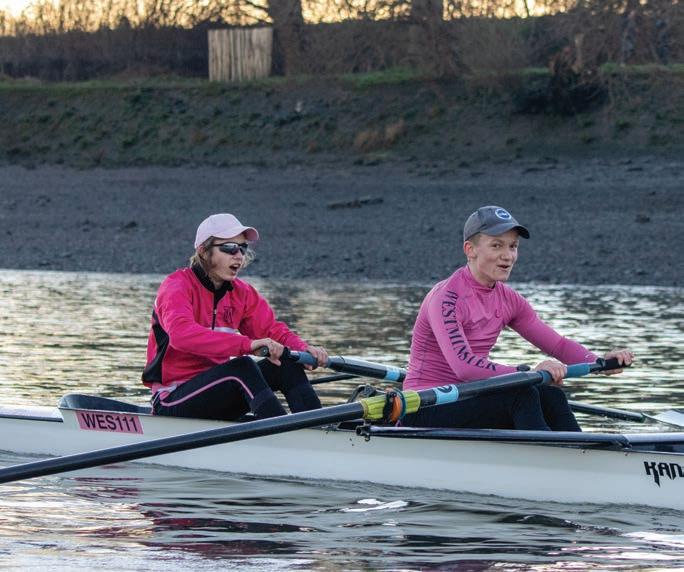
Westminster School Boat Club has seen a plenitude of success across the board. Being the first full year of racing back since the pandemic, there was no doubt a level of uncertainty back in September as to how this year would play out; both in terms of how the Westminster boats would fare against the other big rowing schools, as well as how our rowers would adapt themselves to the grit and unwavering commitment that competing at a high level in any sport requires.
Following on from the late charge in the 2020-2021 rowing season, it could have been difficult to maintain momentum. However, thanks to the hard work and spirit of the new squad and coaches as a whole, the top boys’ VIII took a well-deserved 5th place in the Championship A Final of the National Schools’ Regatta in May. The boys’ four went even better with a hard-fought bronze medal in the Championship coxless fours. The most impressive feature of the National Schools regatta results for Westminster
this year must be the incredible strength in depth with 75 athletes racing over the three days making every age group A Final from a J14 4th place Octuple, to a 5th place J15 VIII and a 4th in J16’s to the Championship 5th. Only one other school had managed that.
As the prestigious Henley Royal Regatta draws closer, the anticipation and preparation of the Westminster rowers intensifies with each day, with the VIII competing in the Princess Elizabeth Cup, the second VIII looking to qualify their boat in the Temple Challenge Cup for college crews and the third quad looking to compete in the Fawley Challenge Cup. For Henley, the Upper Shell, Sixth Form and Remove rowers have been integrated into one large squad, with the result being a tight-knit group of driven athletes with a shared goal in mind.
Thomas Griffin (LL) and CD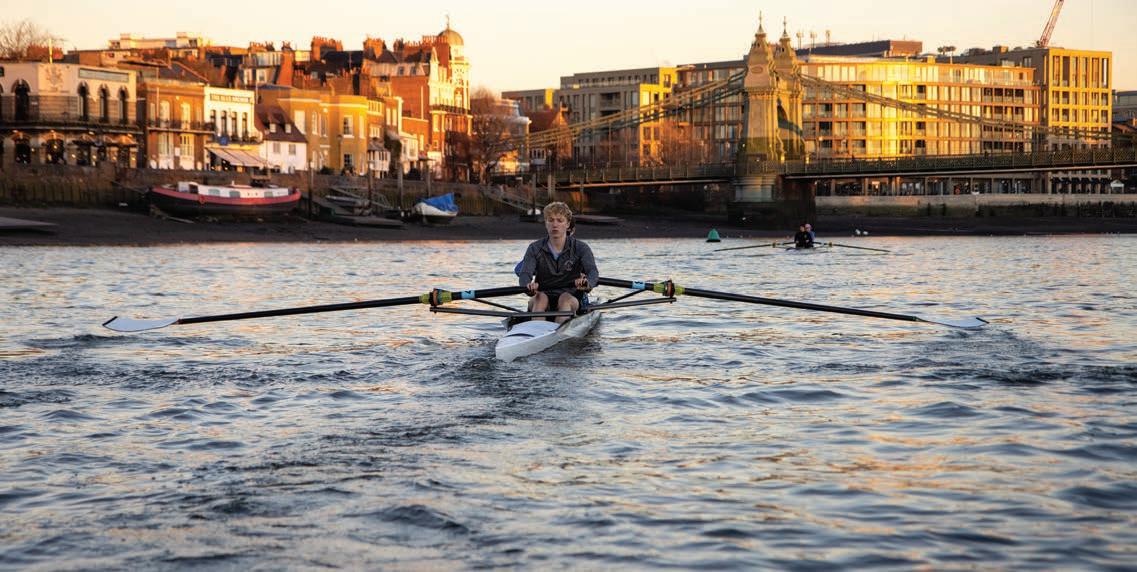
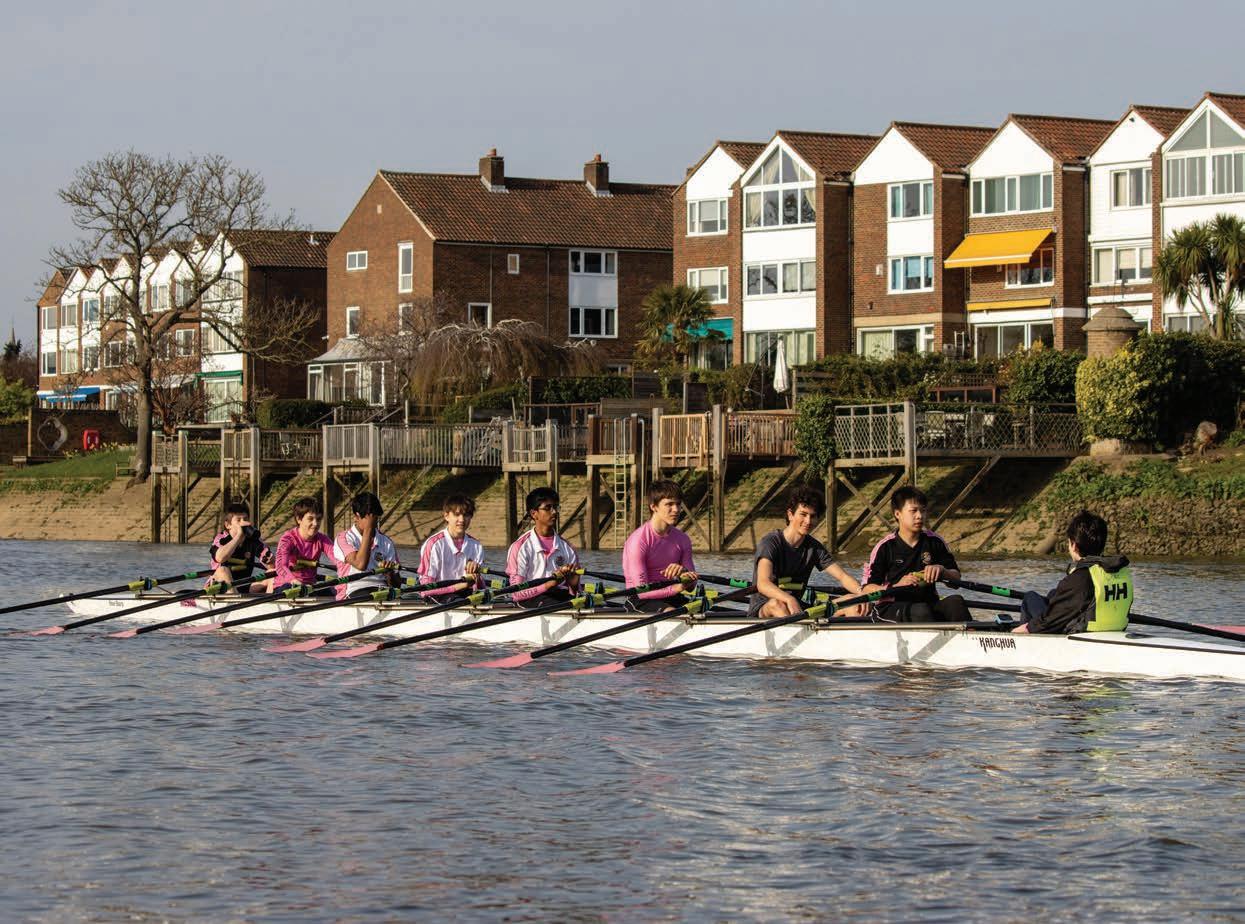
With the long-awaited return to a full winter and summer program of racing, this year’s girls’ rowing squad could not wait to take to the water. In fact, we could barely stay away, with an impressive turnout for both Christmas Eve and New Year’s Day early morning paddles.
The winter season came with some cold weather, the occasional gust of wind and a spot of rain here and there. Yet nothing stopped the girls from being the first crews to boat every Station afternoon, with unfaltering enthusiasm and lots of laughs both on the water and during our weights, core, erg, or donut-eating sessions afterwards. We christened our new pink girls’ quadruple scull Queen Wilhelmina with the traditional champagne-popping ceremony in December, having already had the opportunity to race it at Schools’ Head, Hampton Head and to second place at Teddington Head.
Our work in training certainly paid off with strong results at Cambridge Junior
Sculling Head in March, with Rosie Cotton (LL) winning the J18 singles event and an award for rowing style. Amelie Wessel (RR) came second in the J17 singles while Anisha Sawhney (LL) and Heather Morrison (PP), who had begun the season as novices, took third and fourth respectively. The girls’ quad also came second in the J18 category.
Our Easter camp at the beautiful Wimbleball Lake in Somerset was undoubtedly a highlight of the season for us all. The week saw six single sculls take to the water twice a day –including coaches CD and Mel. After a week of daily tours around the scenic circumference of the lake alongside competitive race preparation pieces,
each of us had improved our stamina and technique in the single significantly. CD also worked to improve our wider cultural knowledge of 80s music, war films and classic British comedy duos in-between sessions during our eagerly anticipated pub lunches.
We arrived at National Schools’ Regatta in May with a veritable fleet of five single sculls, with strong results from the whole squad. Sasha Hammond (PP) returned to race last-minute only to win a qualifying spot in the D finals alongside Amelie, while Rosie made it to the C finals. A great finale to our season, and a brilliant fifth and final NSR for Sasha, Rosie and Pai.
Rosie Cotton (LL)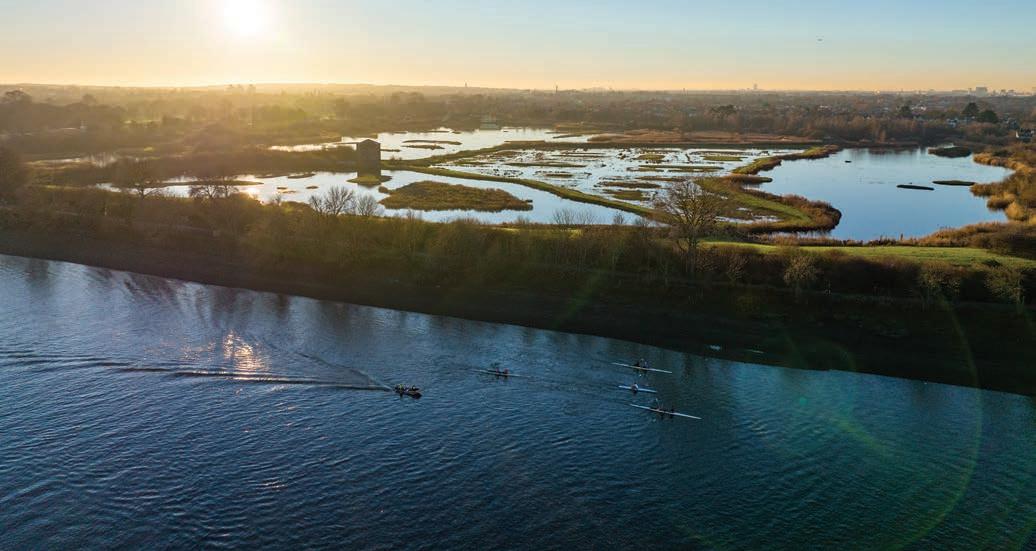
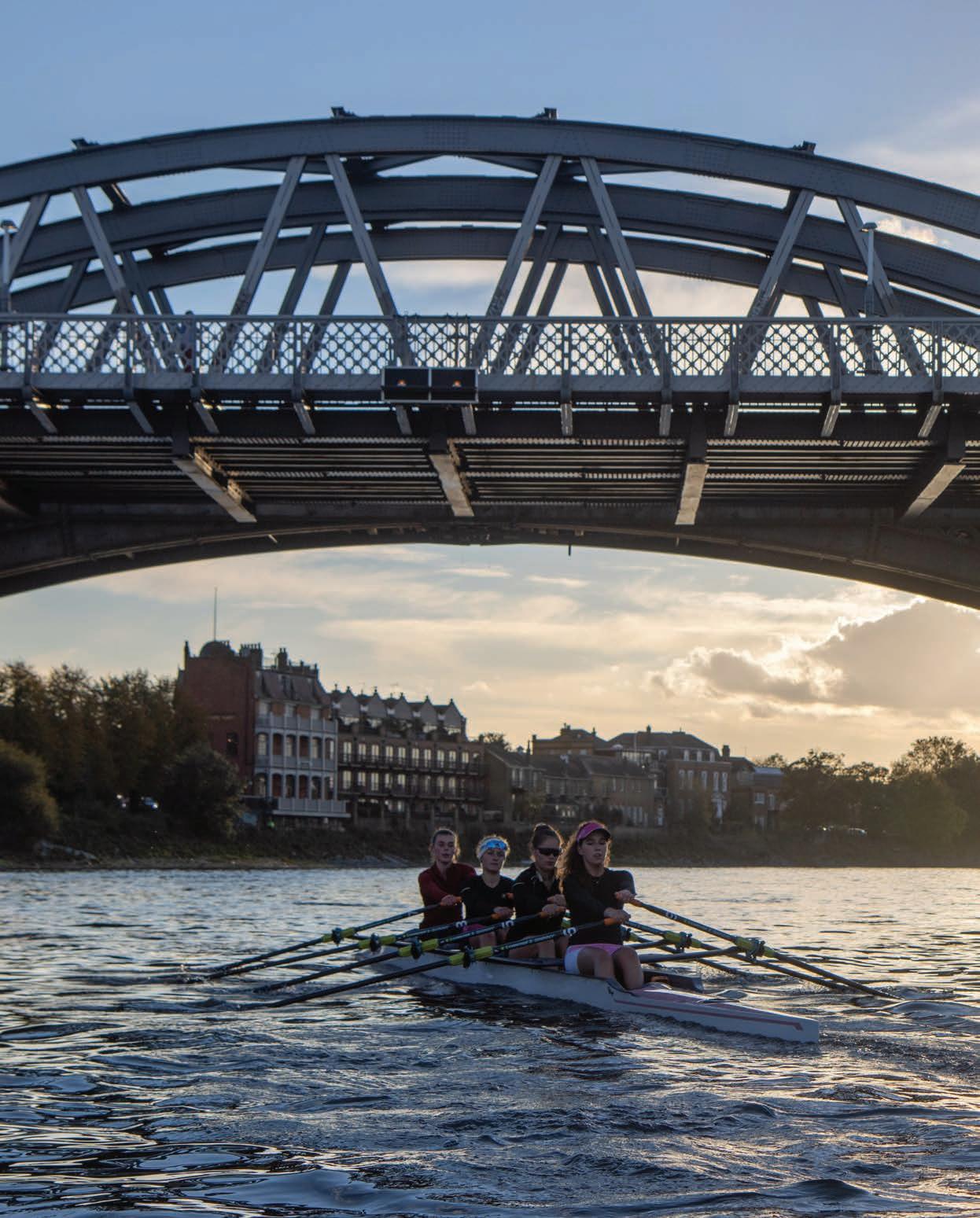
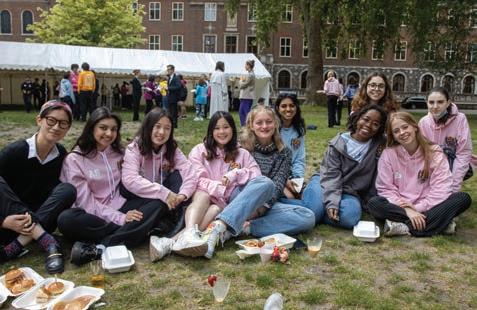

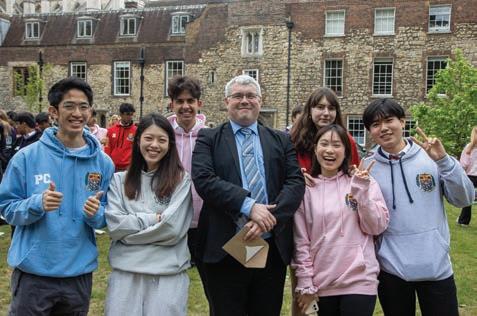
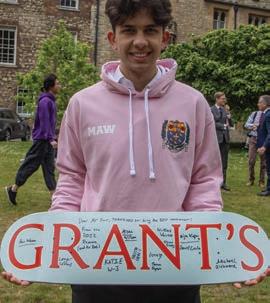
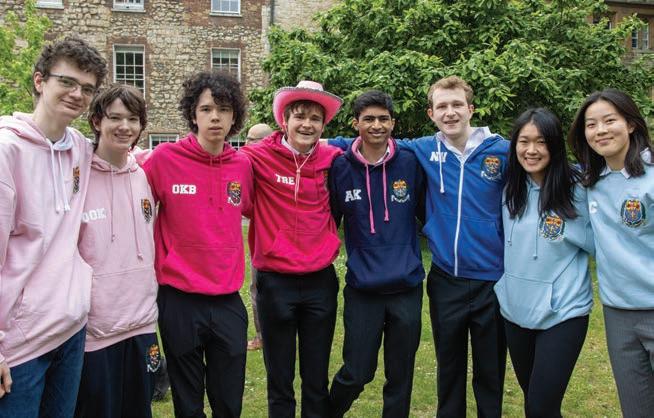

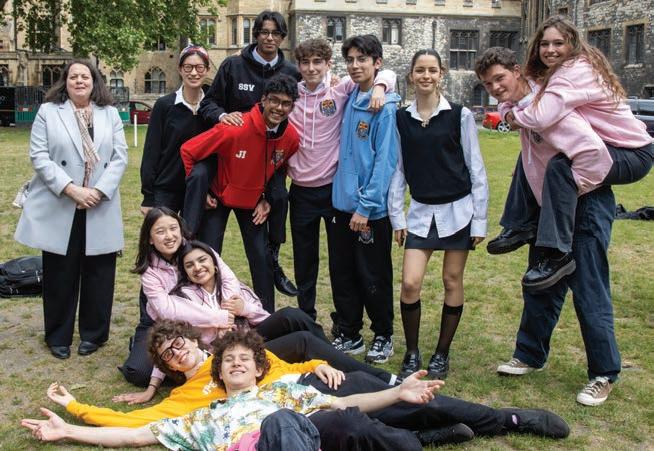
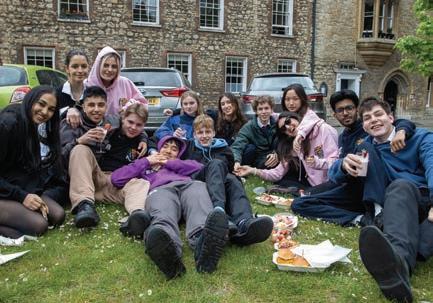
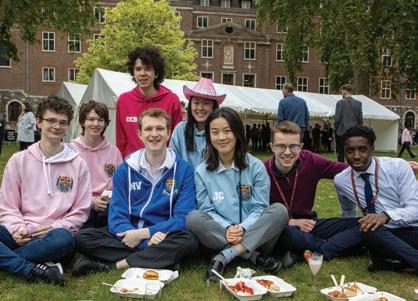
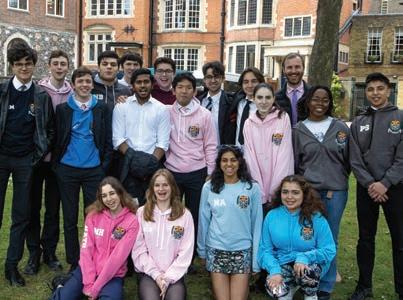
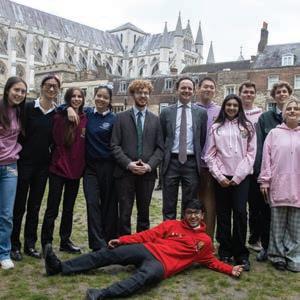
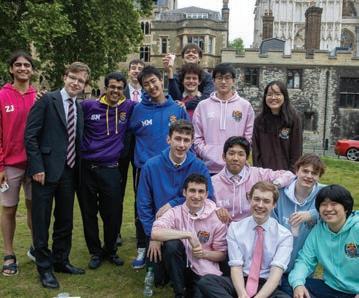
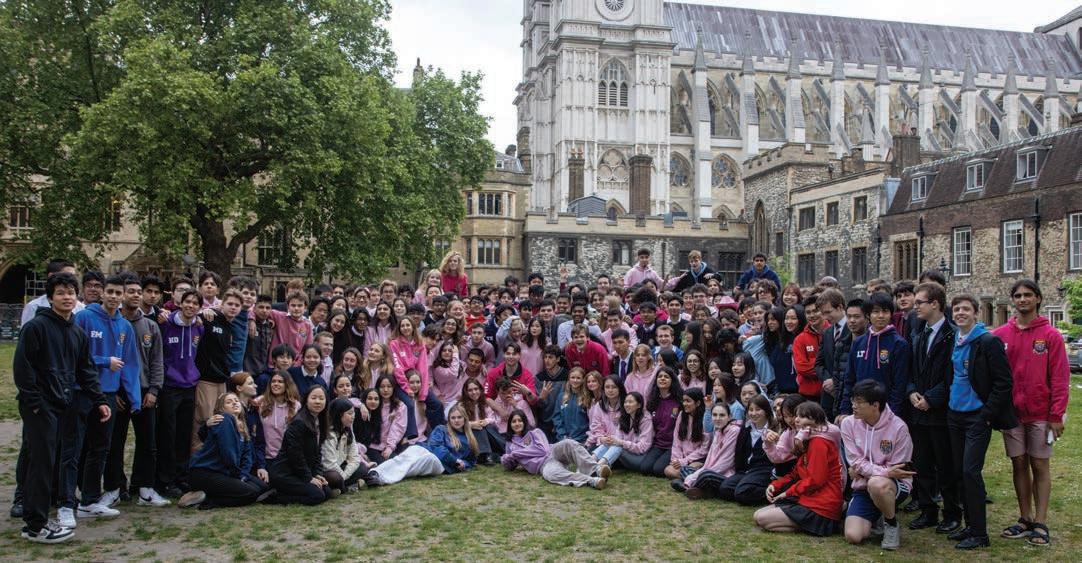
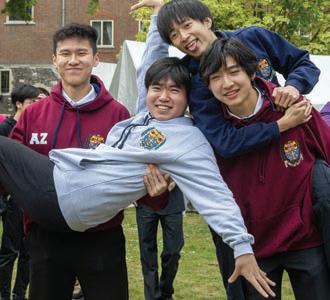
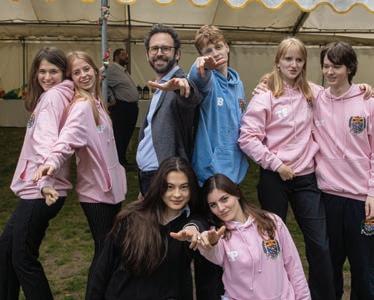

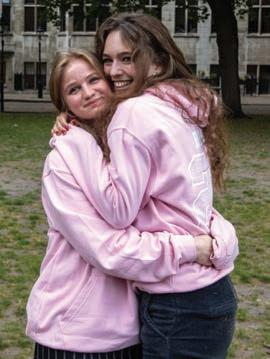

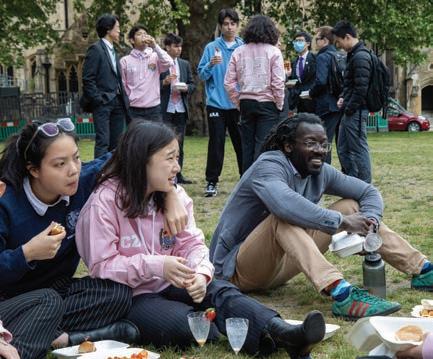


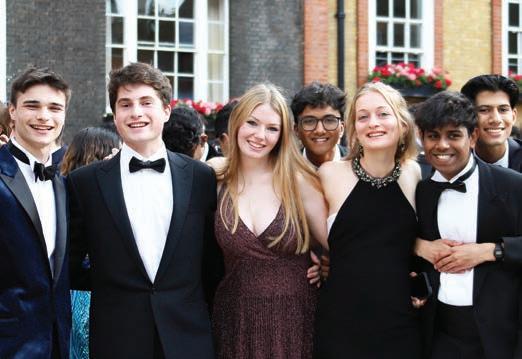

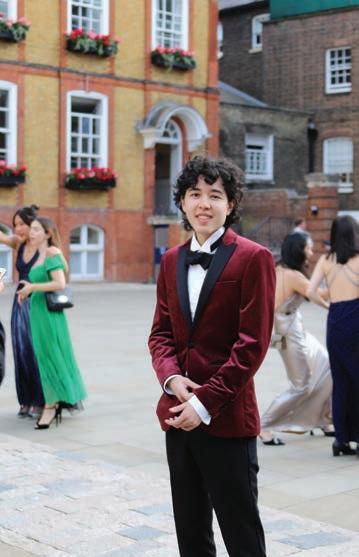
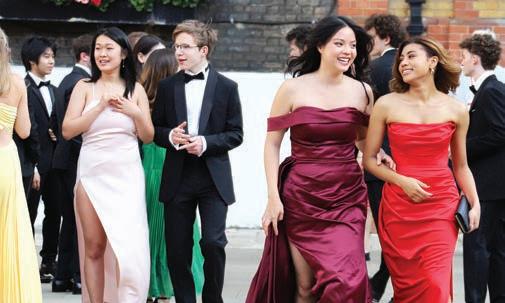


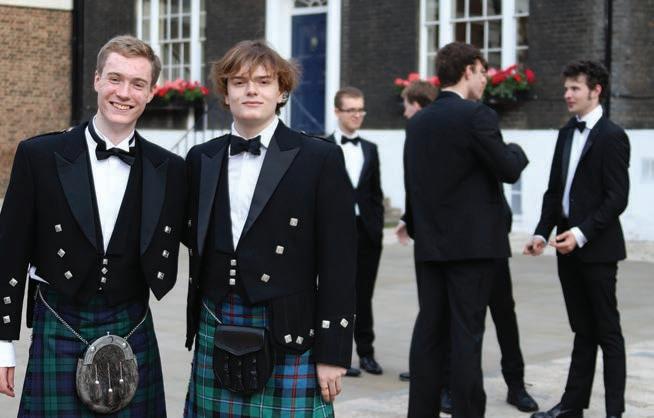

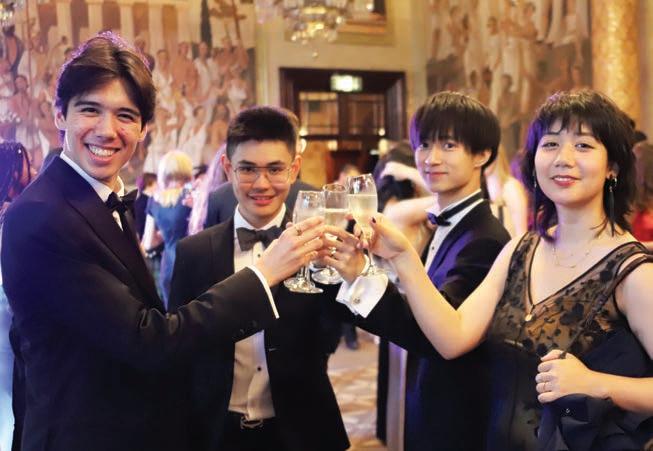




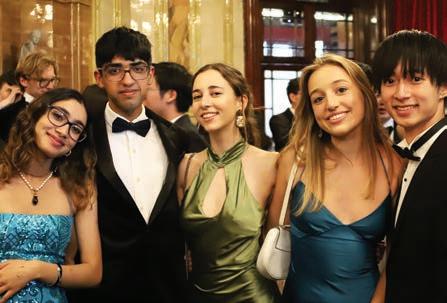
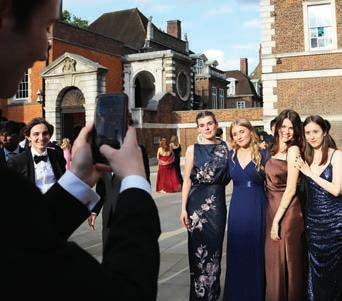
Over the coming months, the school will be considering the future of the Pancake Greaze, our annual Shrove Tuesday celebration. It therefore seemed the right moment to reflect on the history of this extraordinary event.
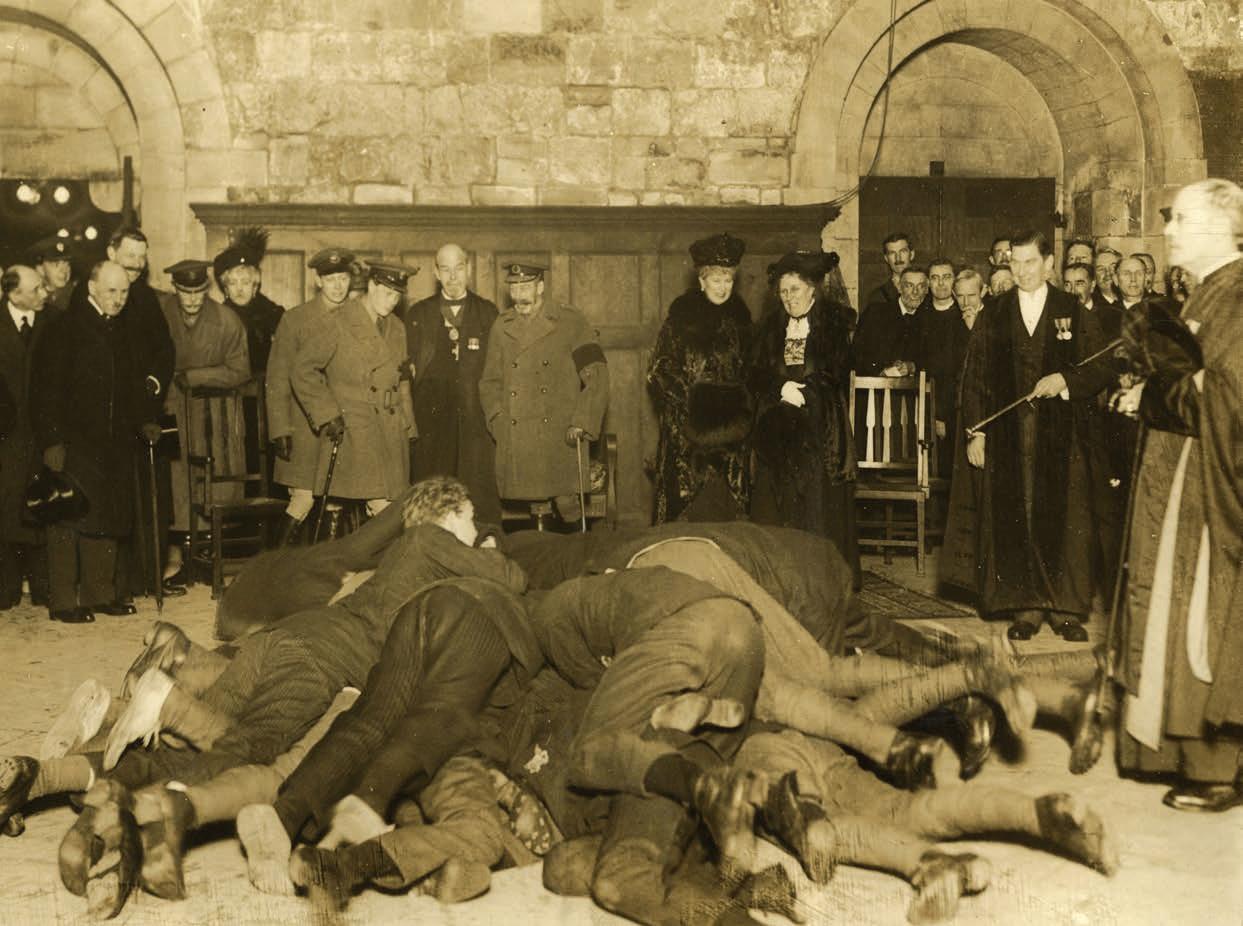
The earliest recorded reference to the “Westminster Greaze” is found in the autobiography of Jeremy Bentham (OW 1755-1760):
The Higher School was divided from the lower by a bar, and it was one of our pastimes to get the Cook to throw a pancake over it.
John Sargeaunt, whose history of the school was published in 1898, suggested that the Greaze was likely to be a medieval tradition. The cooking of pancakes to use up eggs, fat and dairy, alongside chaotic festivities of misrule, were a common part of Catholic practice in medieval England – the Mardi Gras (literally “Fat Tuesday”) prior to a period of Lenten fasting and abstemiousness. Some similar Shrovetide rituals survive across the country, including football games such as that played annually at Ashbourne, Derbyshire, which had its roots in the 12th century. However, the core component of the Westminster tradition, as indicated in Bentham’s account, is the Greaze bar up School. This would suggest that the Greaze’s familiar form did not appear until 1599 at the earliest, the year in which Westminster took over the space which had formerly been the Monks’ Dormitory as its school room.
The origins of the Greaze bar remain mysterious. It has been described as the world’s longest piece of pig iron, and in the absence of a competing claim, we should perhaps assert this record. Its primary use by the school was as a curtain pole, which separated the older pupils, taught in the north end of School, from the younger pupils, or “Under School” taught at the south.
On the day of the Greaze this curtain was drawn back, which adds to the sense of the event as a type of Saturnalia in which the normal rhythm and hierarchy of school life was suspended. Until the resumption of the Greaze following the Second World War, the pancake was thrown from the north end of School to the south, a direction which was then reversed, possibly as there is more room for spectators at the north end of the room.
Another significant change in the tradition is highlighted in Captain Markham’s (OW 1849-1855) recollection of the event: During my stay at Westminster, six and a quarter years, the whole pancake was only once secured and the sovereign claimed.
Whilst now the school has weighing scales on hand and the boy with the biggest piece of the pancake receives a prize, previously only those who caught the pancake entire were declared winners. There was one exception in 1880, recorded in the Town Boy Ledger:
The pancake was duly launched over the bar, & was caught by O. Scoones (Q.S.), at the end of the Greeze Scoones still remained in possession of half the pancake. & W. Bury the other half, which however he gave up. The Dean presented Scoones with the guinea, altho: strictly speaking, the pancake shd be presented whole.
Scoones is one of the few people to have won the Greaze twice, when he took the prize again in 1883. Perhaps Bury should not have been so generous!
The following year, William Rutherford, recently appointed Head Master, attempted to reform the tradition.
After his first attendance at the curious old ceremony, in which the whole school had always taken part, he expressed the opinion to the Sixth Form that it was an “ungentlemanly performance” and requested that they would not take part in it. Next Shrove Tuesday the edict went forth that instead of the whole school one representative only from each form should be permitted to try for the pancake.
Rutherford’s instincts were doubtless correct, but his method of enacting change was high-handed and confrontational. Pupils, feeling unsatisfied by the reforms, staged a protest:
Some forty boys under the leadership of H P Lowe, QS Monitor, who donned the Cook’s clothes, organized a supplementary Greaze of a more exciting nature. In the middle of the fun Rutherford reappeared on the scene and the impromptu Greaze came to an abrupt end. The culprits’ names were taken and the Head Master departed, majestic in his wrath, leaving them breathing fire and slaughter against him. They could not perceive that the old order had passed.
The Cook has a critical role to play in both preparing the pancake and then successfully tossing it over the Greaze bar. Today, the pancake ingredients are the same as those eaten in the school dining hall, although those not destined for human consumption are made thicker to withstand the forces inflicted on them by the competition. The notion that horse hair was once mixed into the batter to enhance the pancake’s structural integrity derives from Markham’s account, but is unsubstantiated.
In the past, the number of attempts given to the cook to throw the pancake over the bar was limited to two or three. If the cook failed, the Greaze did not take place. This could happen for several years running, much to the disappointment of the pupils. As a motivational tool, and to provide the pupils with an alternative entertainment, pupils were permitted to “book” the cook – throw their Latin primers at him – after a third unsuccessful toss.
In 1865 an incident now infamous in Greaze history took place. A pupil named Morgan, aware that “the new cook of the Queen’s Scholars was a duffer at the pancake job”, took an enormous Liddell & Scott Greek Lexicon with him and threw it at the cook following his anticipated failure. The cook retaliated and threw his frying pan at a group of boys, catching
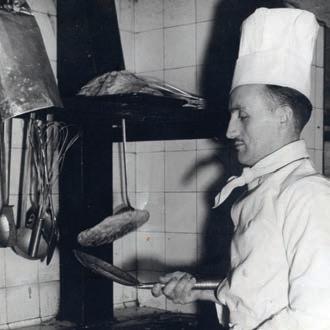
one over the head, and then fled the scene. He was dismissed, and Dr Scott, the Head Master, wrote a long Greek poem to commemorate the event in Homeric style, which has recently been translated by Archive volunteer, Charles Low (QS 1967-1972).
There were attempts to continue the tradition of the Greaze whilst the school was evacuated during the Second World War. The King’s Scholars and Rigaud’s were based together
in Whitbourne and on Shrove
Tuesday a small group of pupils: greazed on the lawn of Whitbourne Court after College John had tossed a pancake from a balcony. The contest was always fierce and the winner was rewarded well, but not, of course, with the guinea. The grass was probably more comfortable than the floor-boards up School, but it was not the real thing.
School was hit by an incendiary bomb in 1941 and left as a shell for the remainder of the war. The first priority of pupils when they returned
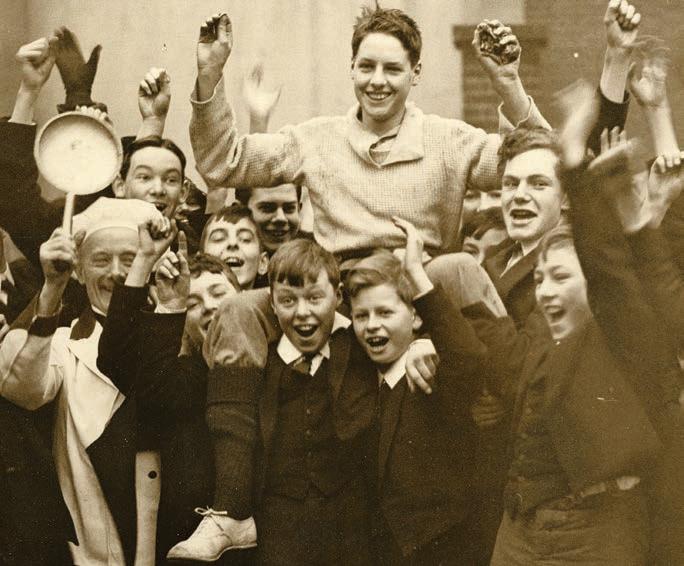
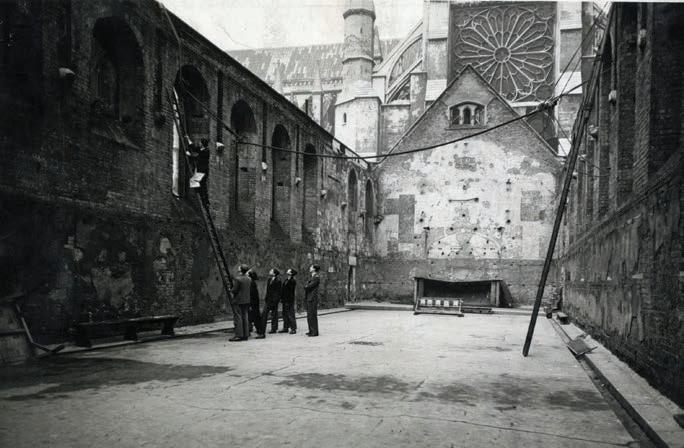
to Westminster was to re-erect the Greaze bar, which had miraculously survived the blast intact, although somewhat bent out of shape.
The 1946 Greaze took place under open skies with snow on the ground. However, by 1948 focus was placed on comfort. The Elizabethan noted that “for the first time chairs were provided for visitors, School was re-roofed and heated, and there was no danger, as last year, that the weather might interfere with the ceremony”.
In the latter half of the 20th century it became customary to wear fancy dress when taking part in the Greaze, although in the 21st century this tradition made way for the more practical House t-shirts. In the early 1980s a group of pupils with great daring very expertly removed and hid the Greaze bar in the Fives Courts as a protest about the exclusion of a friend. Threats ensured that it was returned the day before the Greaze was held – what would the rest of the school have had to say had there been no occasion for the Dean to beg the Play as he has traditionally done? The bar is now padlocked in place. Despite the Under Master in the late 90s referring the risk to the Health and Safety Committee, this exceptionally daft ceremony continued until the outbreak of Covid-19, though diminished further with no Fifth Form and Lower Shell participants and now carried out bare foot on safer matting than the mahogany flooring could offer.
In 2022, disgruntled at having been denied the opportunity to take part in a Greaze for two years running, Remove pupils chose to stage their own competition. This Greaze took place on the year group’s last day in school prior to study leave, Friday 13 May, and had a slightly different format. Out in Dean’s Yard, a number of pancakes were torn and scattered onto Green, and pupils raced to gather the largest quantity. Katie Stamp (HH) thus became the first Westminster girl to win a Greaze, albeit an unofficial one!
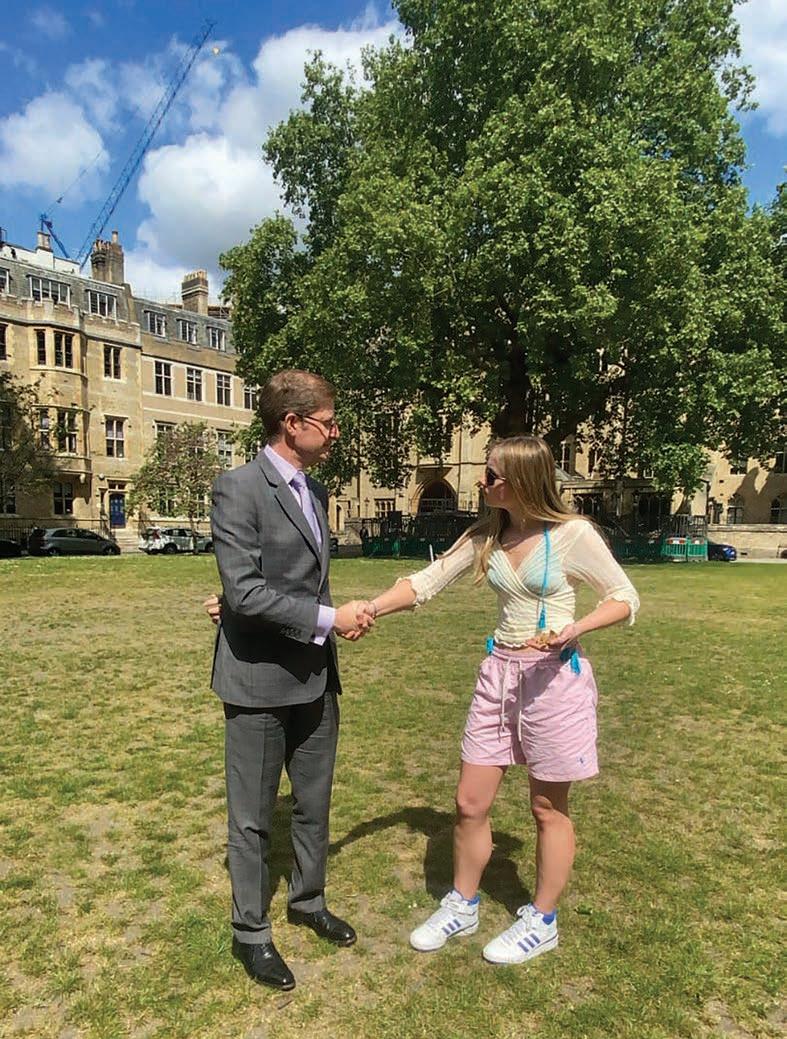
The 1922 Greaze was held later in the day than normal, owing to the wedding of Princess Mary and Henry Lascelles, but took place as usual up School once the Dean of Westminster had married the happy couple. Its winner, Raymond Otto Seaton Milde, was not the most willing of Greaze participants, as his classmate Stephen Ensor (HBB 1921-24) recalls in a letter sent into The Elizabethan in 1983: When he was chosen as our representative he was very reluctant to compete, but he did not let us down and I remember him holding up a crumpled pancake whole and entire. We were amazed by his success and astounded that it did not disintegrate.


Proud of his win, Milde kept the pancake and eventually framed it in a small wooden box with a glass top. Other than his victory in the Greaze, the record of his short time at Westminster is sparse. He does appear in the June 1922 edition of The Elizabethan for his successes in Athletics that year. Perhaps his experience leaping for the pancake made good practise for the hurdles and high jump: Milde distinguished himself by winning the hundred, quarter, hurdles and high jump. His high jump of 4ft. 10 ins. is a very good jump for the under fifteen class, and has only been beaten once before, namely by a jump of 4ft. 11 ins. in 1889, while it has been equalled twice, in 1914 and 1917.

Milde left the school in December 1922 after only attending for just over one year. He spent fifty years as a tea merchant, served in the Royal Air Force Volunteer Reserve in the Second World War, and died in 1989. After his death, his family were not particularly endeared to or inclined to keep the now almost 70 year old pancake. It eventually made its way to the school Archives, where it still intrigues and horrifies pupils. The pancake has an annual outing in the Greaze display up Library and was this year accompanied by some birthday bunting in celebration of its centenary year. We’re expecting a telegram from the Queen any day now.
Although Milde was arguably the most successful in preserving the Greaze pancake after his triumph, he was certainly not the only one who tried. After observing Milde’s win the year prior, Stephen Ensor recounts his own performance in a slightly unconventional Greaze in 1923: The following year all forms were told to remain in their classrooms until sent for. Two forms were never summoned, including my Classical Remove. For once protests were effective and four from each of the two forms were chosen for a Pancake Greaze on the next day, the only time one had taken place on Ash Wednesday. Costley-White, the Head Master and Tyson, the Bursar, generously gave ten shillings each towards the prize, which I happened to win for getting the largest piece of pancake. I kept it for a year until it went mouldy.
George Leonard Brown, victor of the 1910 Greaze, had a little more success in preserving his winnings. His tactic on Shrove Tuesday was to “lay flat upon the pancake”, as reported in the Daily Telegraph, and he succeeded in holding on to most, although not all, of it. After his win, he kept the pancake in a neatly labelled tin and it survived until at least 1981, when Brown’s daughter reported a large amount of family pride in the relic in a letter to then Head Master John Rae. If this pancake still exists, it would almost certainly be the oldest surviving Greaze pancake, at 112 years, but pieces were on occasion fed to the family’s dogs so it might have all been eaten. Fossilised Greaze pancakes are supposedly well-received dog treats, but we can’t recommend testing the matter with your own pets, should you happen to have an ancient pancake to hand.

